BUSINESS

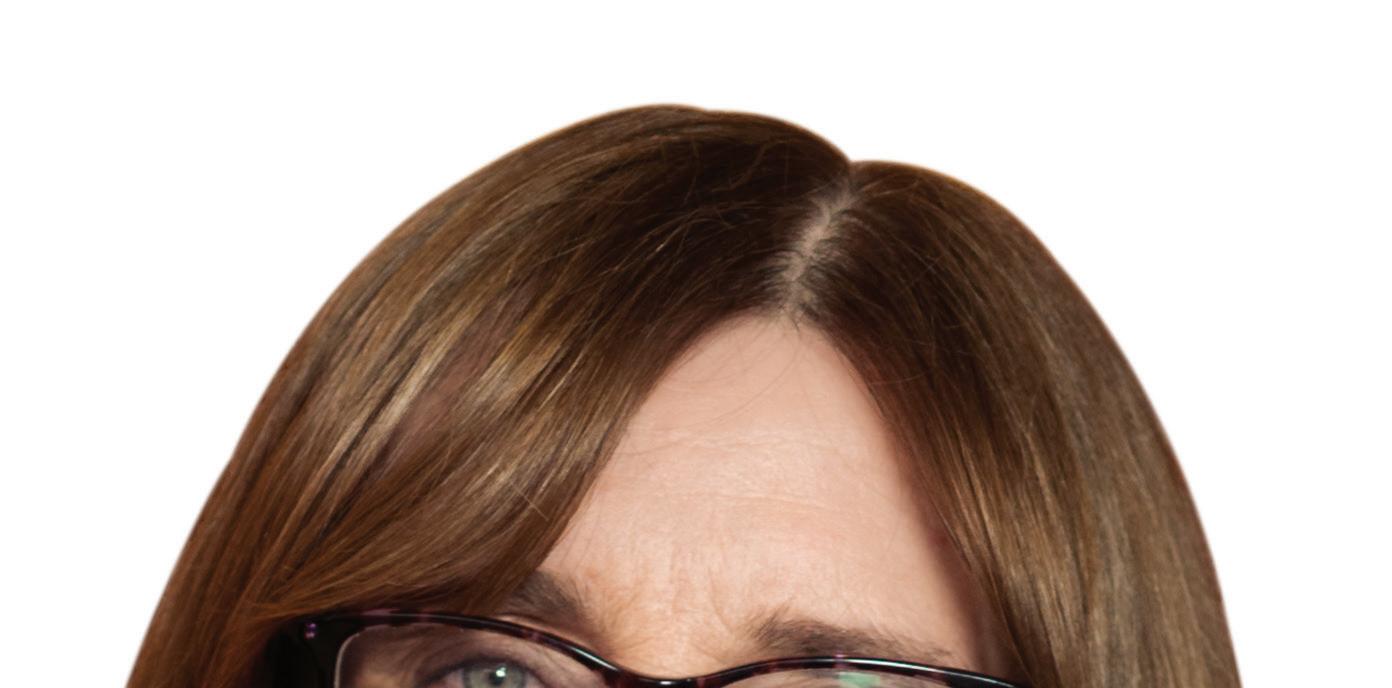

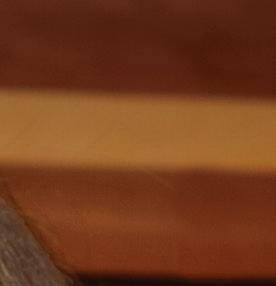










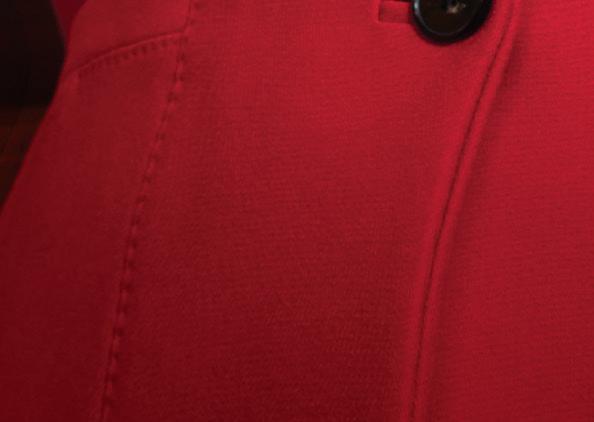
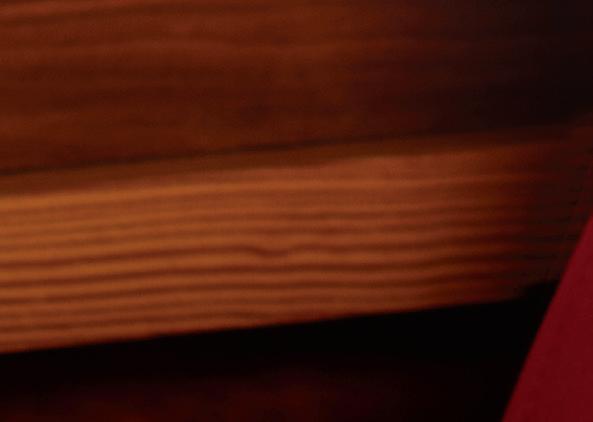

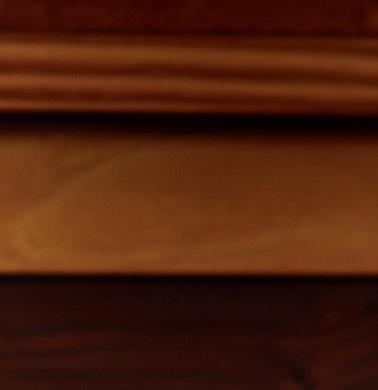







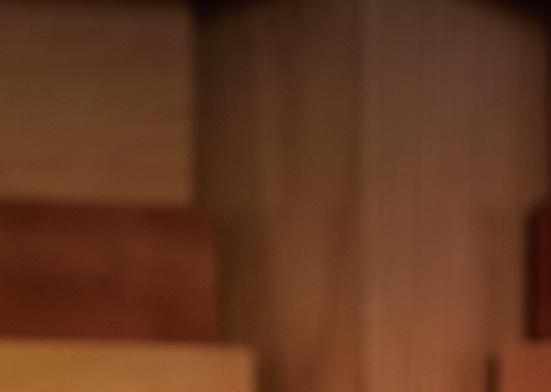



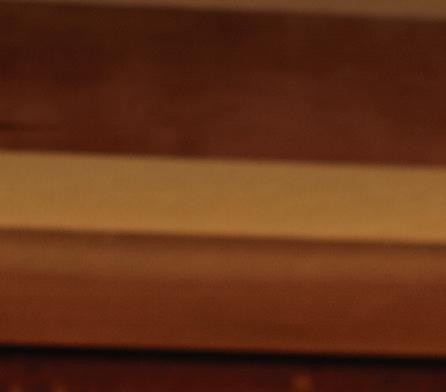






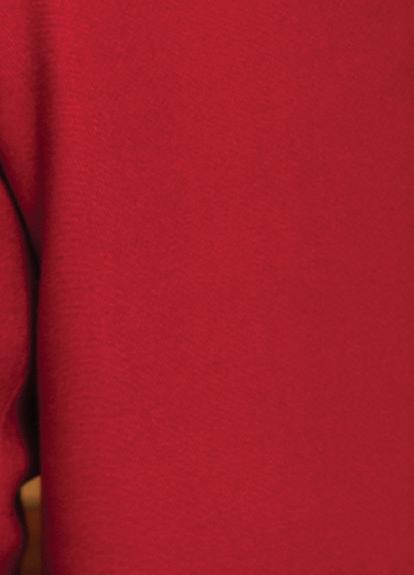




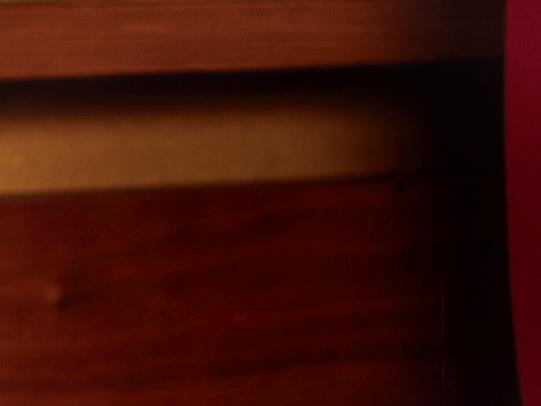
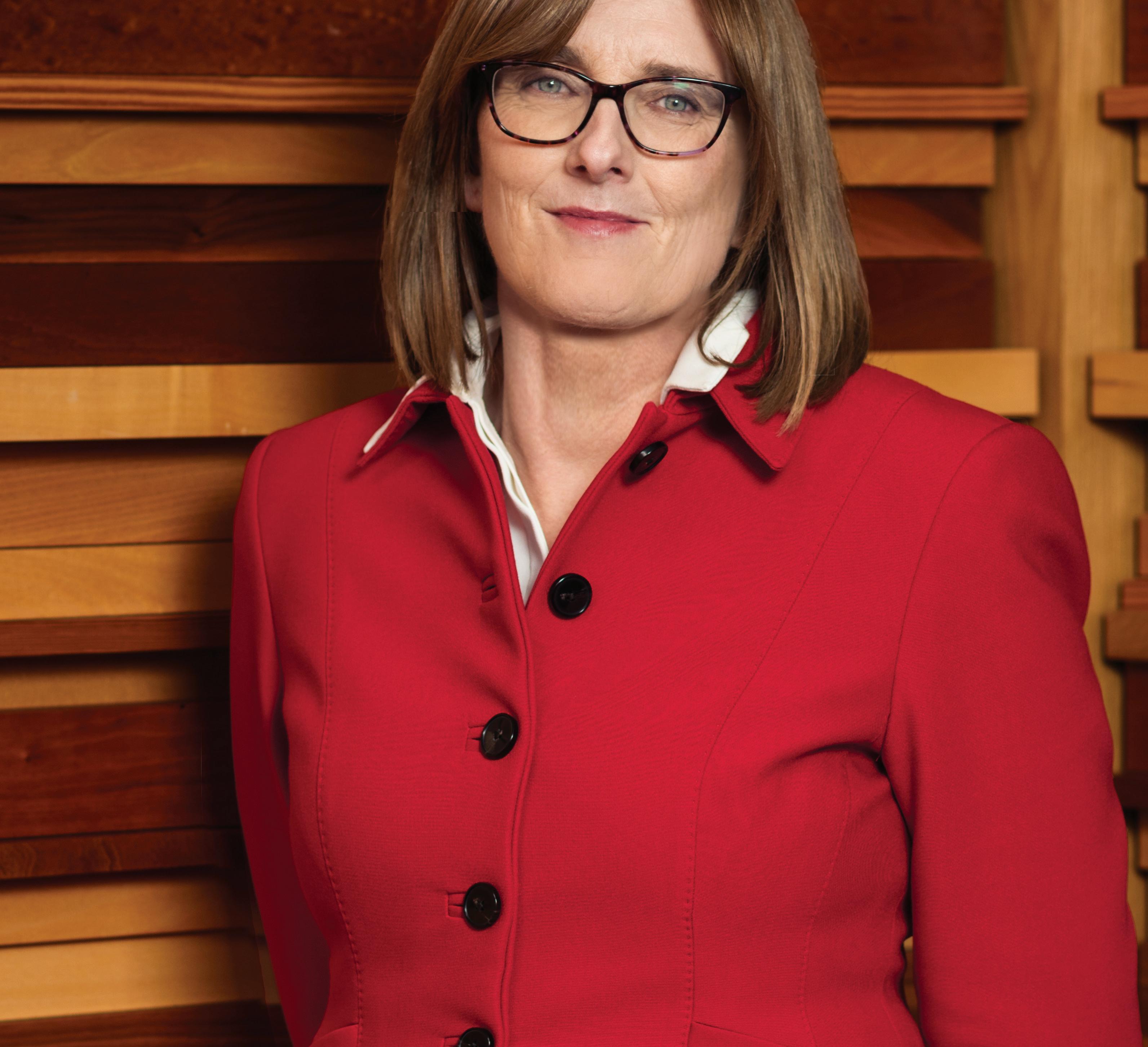
PARENTING HEROES
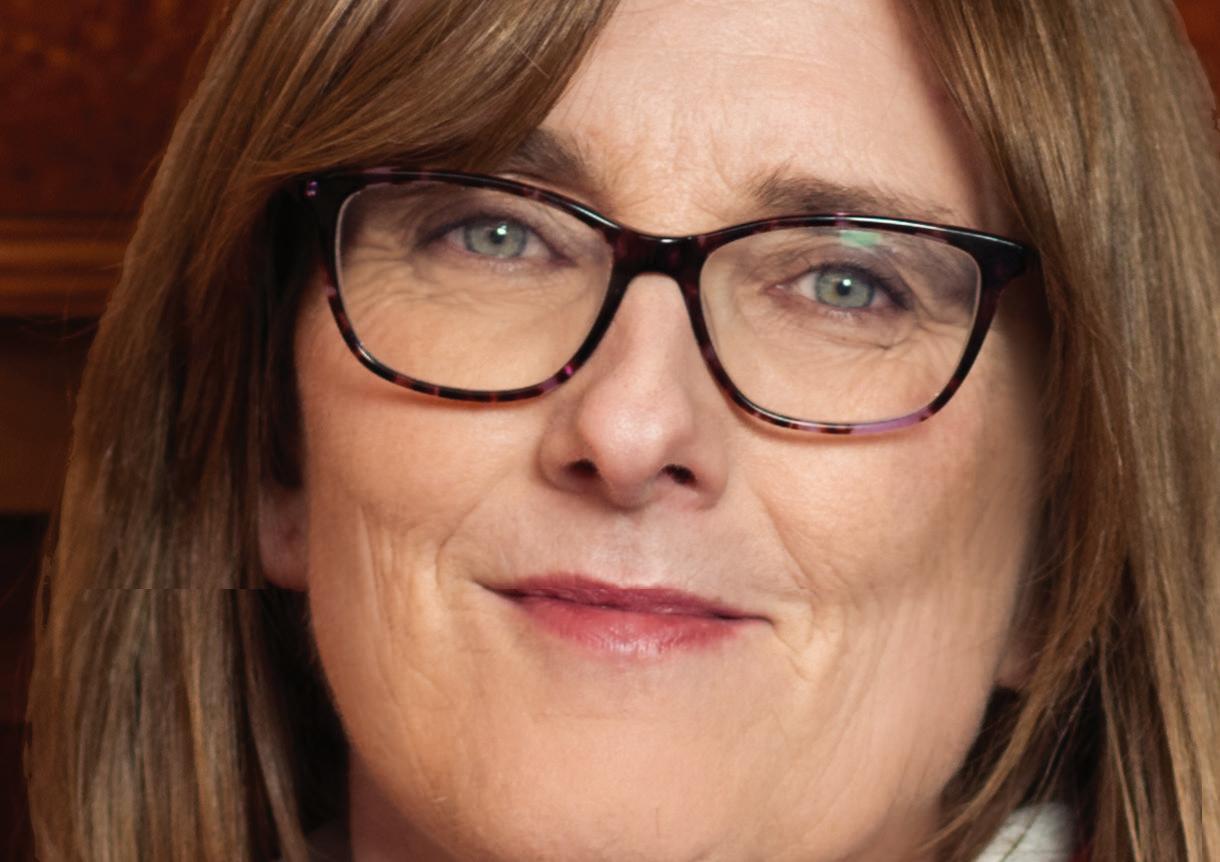
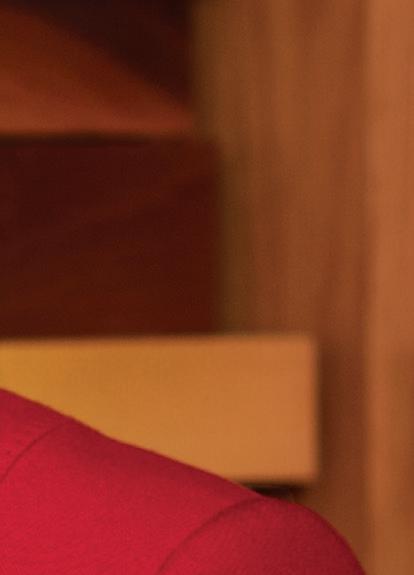
SUPPORTING ENTREPRENEURS | VALUING SMALL BUSINESS | REWARDING RISK TAKERS | SPRING 2023
SMALL
FOR PARENTS
WORKFORCE
MEET THE
FIRMS THAT ARE MAKING LIFE EASIER
BACK TO WORK SUPPORTING PROFESSIONALS BACK INTO THE
CHANGE
SFA’S NEW CHAIR
THE CHALLENGES
SMALL BUSINESS
LIFE BALANCE
MISCELLANEOUS
ACT 01 9 772009 911007 2.70 Standard
PUSHING FOR
THE
ON
FACING
GETTING THE BALANCE RIGHT UNDERSTANDING THE WORK
AND
PROVISIONS
BUSINESS
COMPETE ON A GLOBAL STAGE GERALDINE LARKIN
CEO Setting The
ON HELPING SMALL
TO
NSAI’S

cyclescheme.ie
Setting The


On the cover: Geradline Larkin, CEO, NSAI at the conference centre, Crowne Plaza Dublin Airport

Photography: Paul McCarthy
Editor: Denise Maguire

Creative Director: Jane Matthews


Designers: Alan McArthur Neasa Daly





Production Executive: Nicole Ennis


Managing Director: Gerry Tynan


Chairman: Diarmaid Lennon

Email: info@ashville.com or write to: Better Business, Ashville Media, Unit 55, Park West Road, Park West Industrial Estate, Dublin 12, D12 X9F9. Tel: (01) 432 2200
All rights reserved. Every care has been taken to ensure that the information contained in this magazine is accurate. The publishers cannot, however, accept responsibility for errors or omissions. Reproduction by any means in whole or in part without the permission of the publisher is prohibited. © Ashville Media Group 2023. All discounts, promotions and competitions contained in this magazine are run independently of Better Business. The promoter/advertiser is responsible for honouring the prize. ISSN 2009-9118
SFA is a trading name of Ibec.




WELCOME SPRING 2023

As this issue is my rst as Director of the Small Firms Association, I welcome you to this edition and thank members, stakeholders and colleagues for their warm welcome since I joined in February.
In this edition, the HR pages focus on key points from the Work Life Balance and Miscellaneous Provisions Act which was passed by the Oireachtas in March and has now been signed into law by the President. Our policy sector looks at proposed regulations to introduce an environmental levy on single-use disposable cups.

Elsewhere in these pages, you will nd guidance on the importance of carrying out ergonomic assessments. You will meet entrepreneurs from the eld of dentistry and from the parenting sector, we give you a roundup of our February Business Connect event and hear from Geraldine Larkin, Chief Executive O cer at the National Standards Authority of Ireland (NSAI) on how standards and certi cation from the NSAI can help small businesses compete on a world stage.
is magazine contains stories that inform, inspire and entertain. It showcases and celebrates the achievements of small companies, provides advice to help you in your business and keeps you up to date on the latest trends at home and abroad.
Ireland is a nation of small businesses. Of over 267,000 businesses in the country, 99% have less than 50 employees (small) and 92% have less than 10 (micro). ese companies can be seen in every city, town and village in the country and together they provide employment to half of the private sector workforce.
e SFA proudly represents a diverse membership of businesses with less than 50 employees: homegrown and spanning every sector of our economy. Our members can be found in every town and every city in Ireland. We want to make Ireland the most vibrant small business community in the world – an environment that supports entrepreneurship, values small business and rewards risk takers.
Better Business is the magazine of the small business community. We welcome your feedback, suggestions and ideas to info@sfa.ie or on Twitter @SFA_Irl.
David Broderick Director, Small Firms Association
SFA | BETTER BUSINESS 1 Welcome to Better Business, a magazine dedicated to the small business community.
BUSINESS SUPPORTING ENTREPRENEURS VALUING SMALL BUSINESS REWARDING RISK TAKERS SPRING 2023 BETTER BUSINESS SPRING 2023 PARENTING HEROES MEET THE SMALL FIRMS THAT ARE MAKING LIFE EASIER FOR PARENTS BACK TO WORK SUPPORTING PROFESSIONALS BACK INTO THE WORKFORCE PUSHING FOR CHANGE THE SFA’S NEW CHAIR ON THE CHALLENGES FACING SMALL BUSINESS GETTING THE BALANCE RIGHT UNDERSTANDING THE WORK LIFE BALANCE AND MISCELLANEOUS PROVISIONS ACT 01 772009 911007 a2.70 Standard ON HELPING SMALL BUSINESS TO COMPETE ON A GLOBAL STAGE GERALDINE LARKIN NSAI’S CEO
2 SFA | BETTER BUSINESS CONTENTS SPRING 2023 05 Big News for Small Business News, views and profiles from SFA members and small businesses in Ireland 14 Sector Spotlight Three professionals in Ireland’s dental industry talk about the challenges facing the sector 31 Top Tips With changes to work practices, SMEs must be alert to financial scams 38 HR Get to grips with the Work Life Balance and Miscellaneous Provisions Act 10 Recruitment Darina Mulligan on how returner programmes can help alleviate the skills shortage 12 Events The SFA recently held its flagship marketplace event, Business Connect 20 Cover Story The NSAI is helping small business compete on a worldwide stage 32 Interview New SFA Chair Geraldine Magnier talks about the challenges facing small business 46 Arts and Culture Mezzo-soprano Tara Erraught is taking the world by storm 26 Entrepreneurs Meet the small firms who are making life easier for parents 34 Career Change Ruairi Dooley is on a mission to change how we view upcycled ingredients 50 Travel Germany is an attractive option for small business looking for new markets



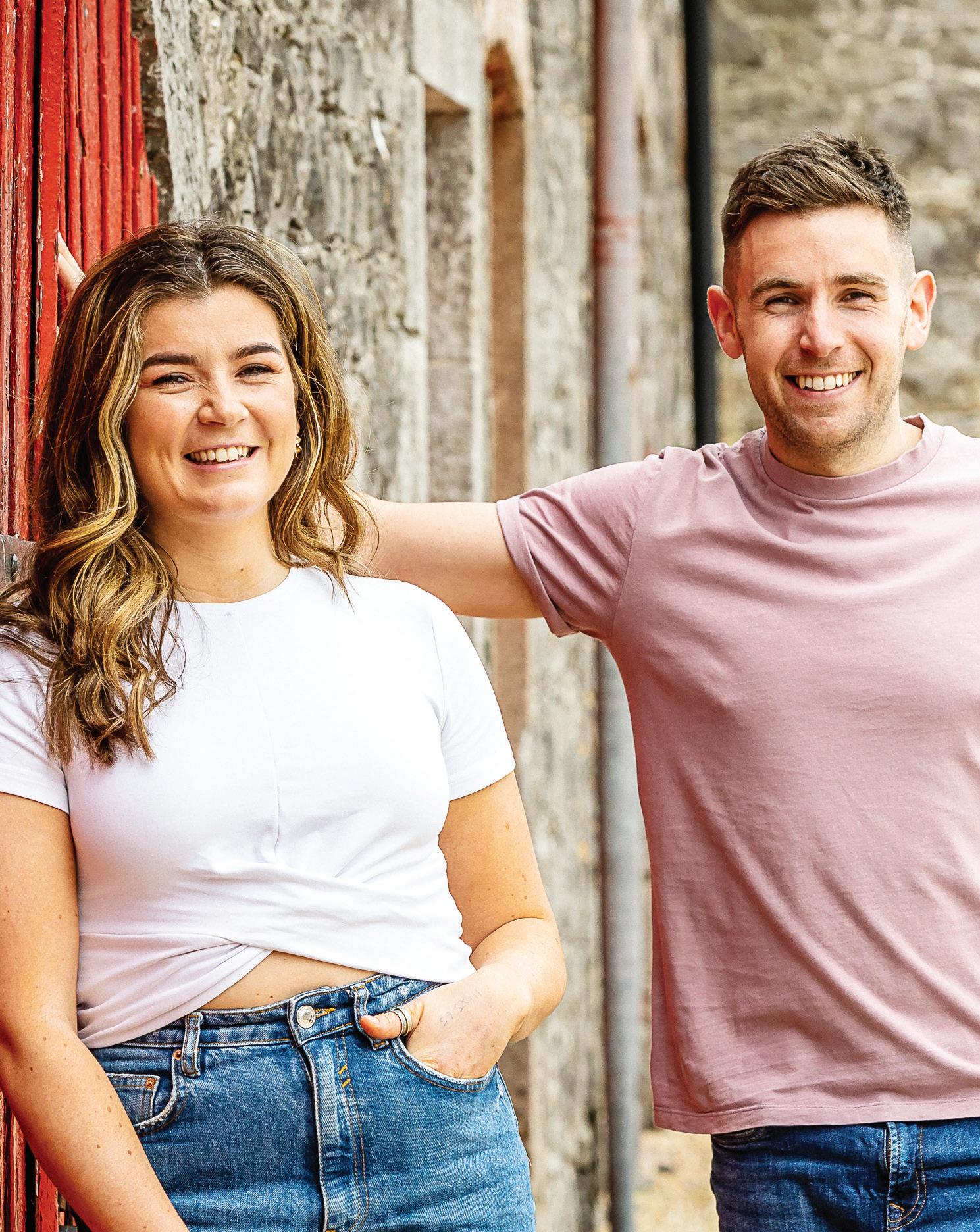
SFA | BETTER BUSINESS Spring 2023 Contents 3
FROM TOP LEFT: Irish Dental Association CEO Fintan Hourihan talks about staff shortages in the industry, page 14 // Geraldine Larkin, CEO at the NSAI, on helping small business compete at a global level, page 20 // Niamh and Ruairi Dooley are on a mission to change how we view upcycled ingredients, page 34 // Mezzo-soprano Tara Erraught is taking the world by storm, page 46




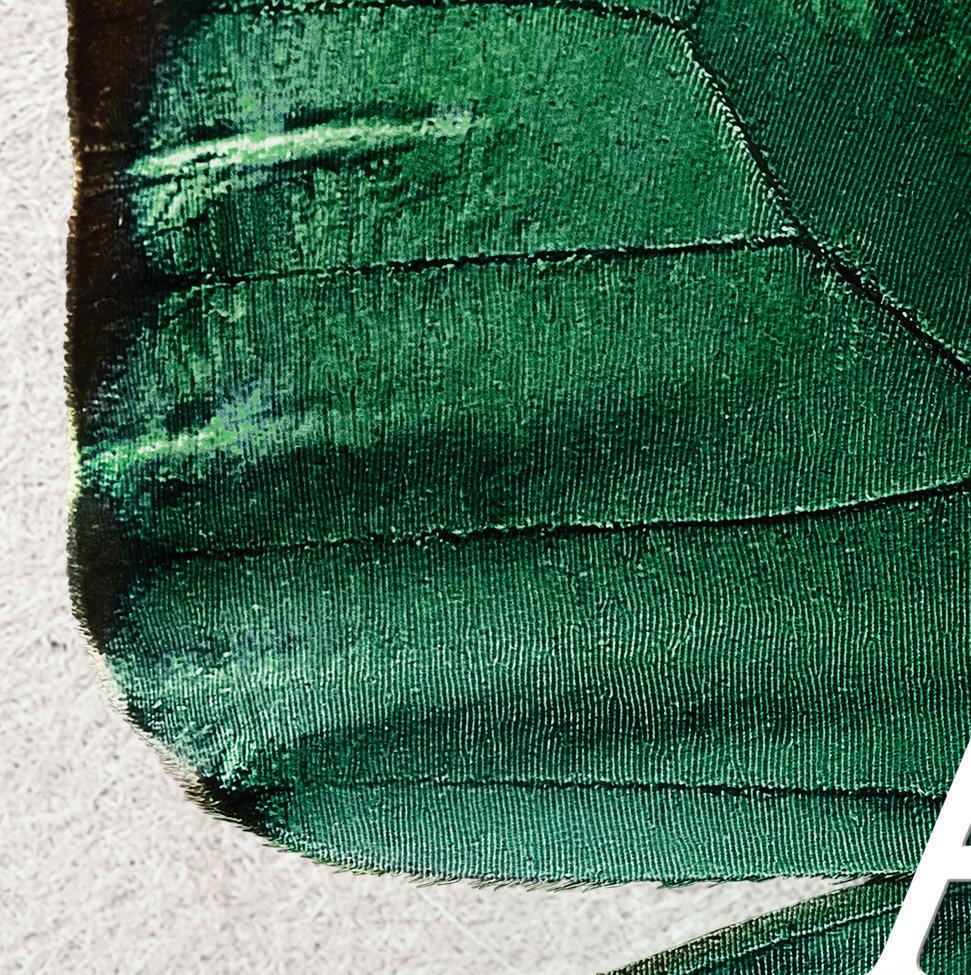

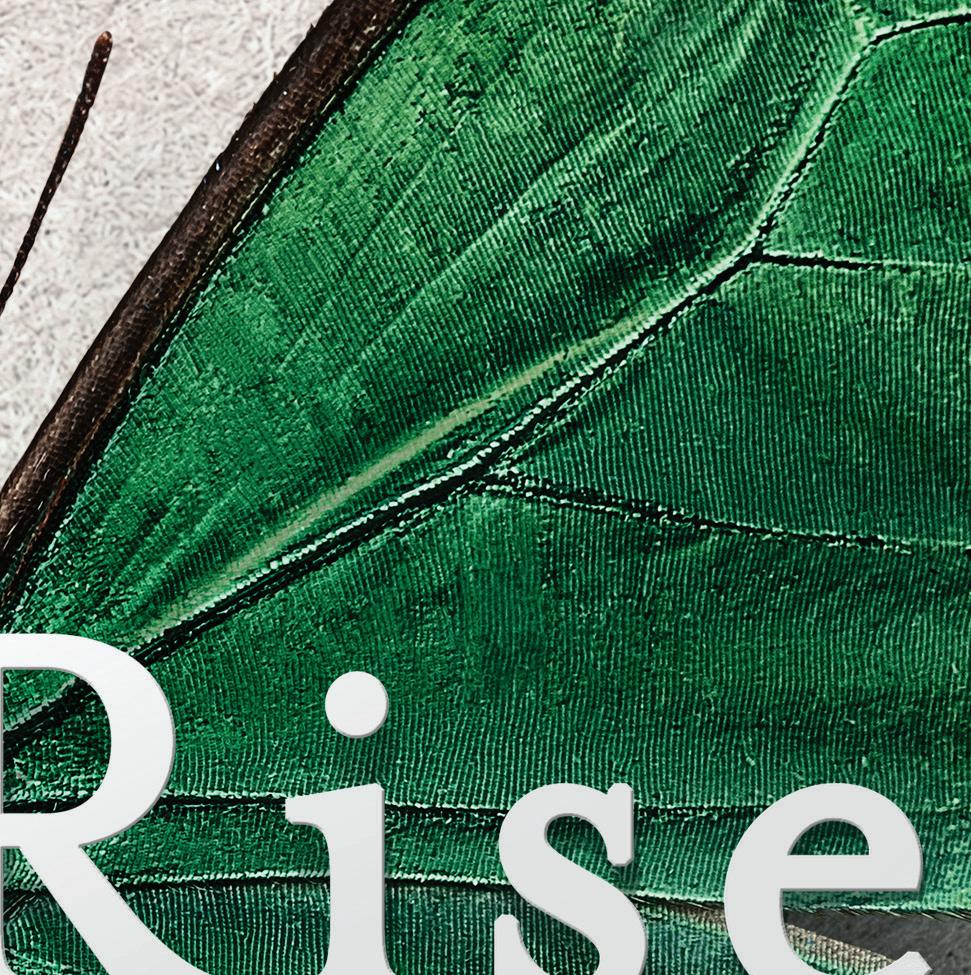


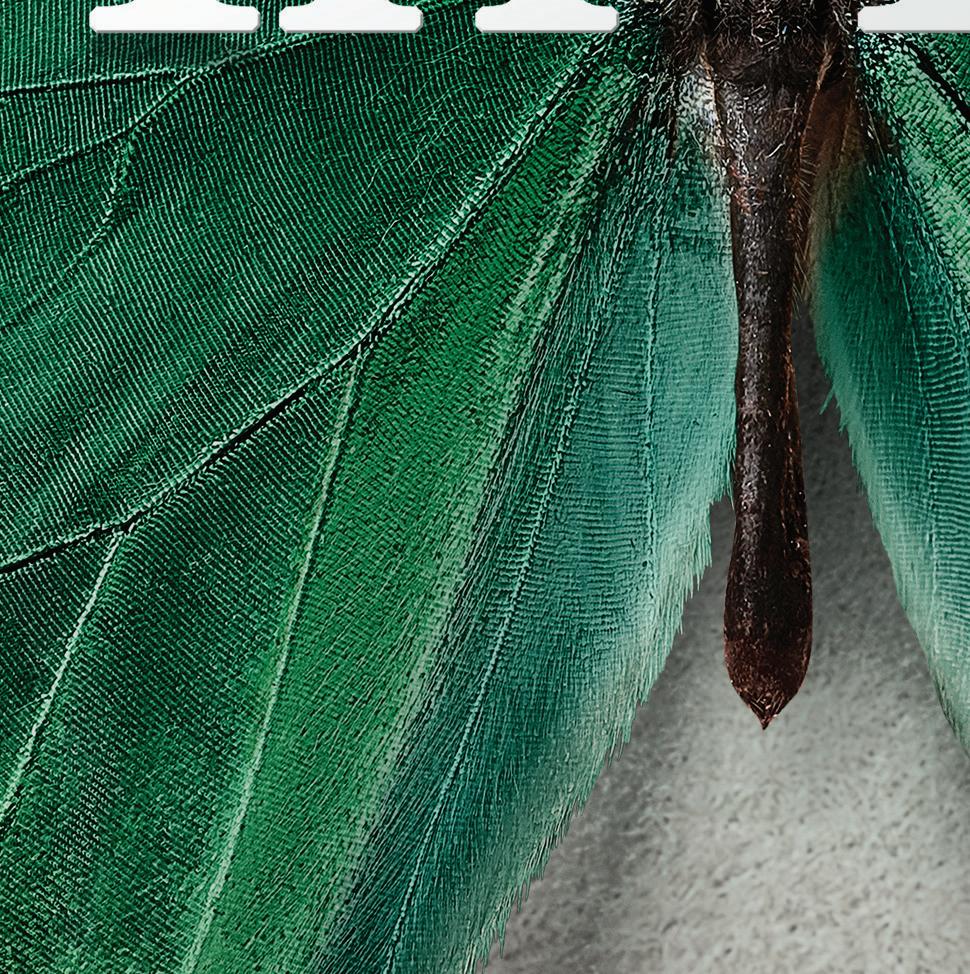
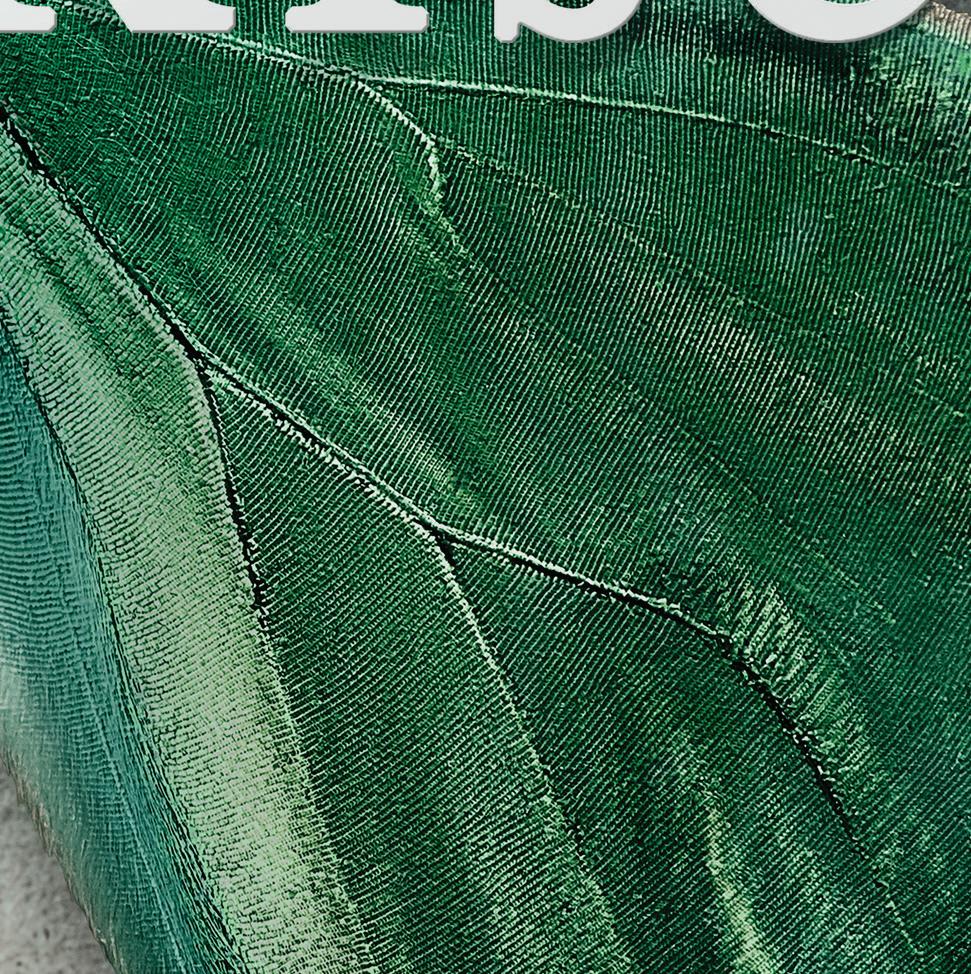
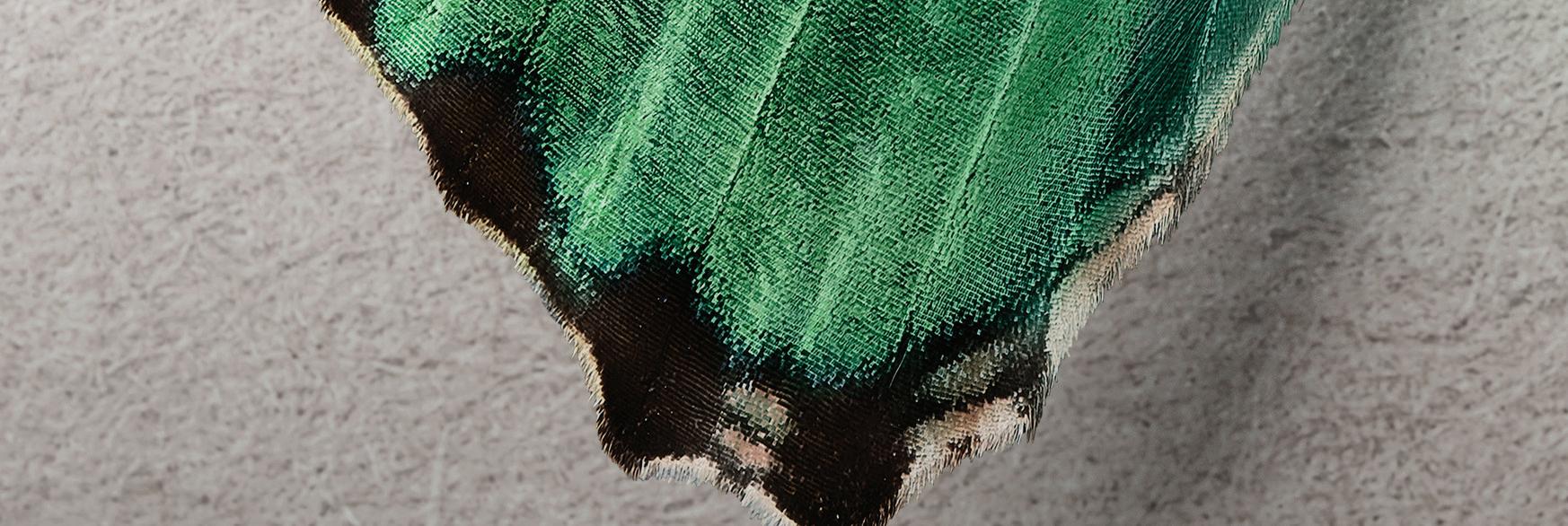
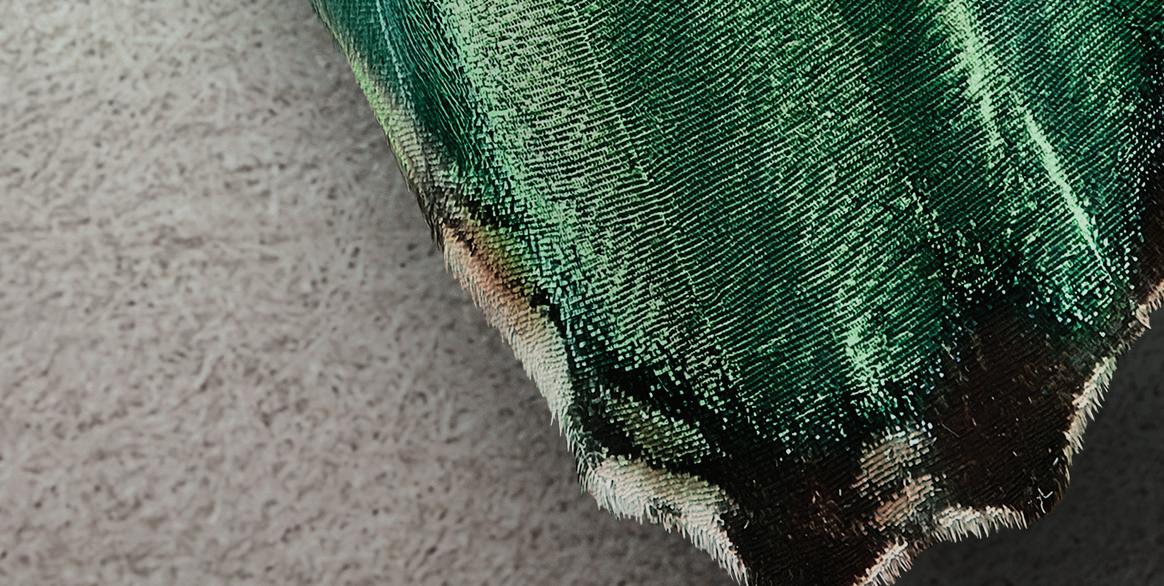





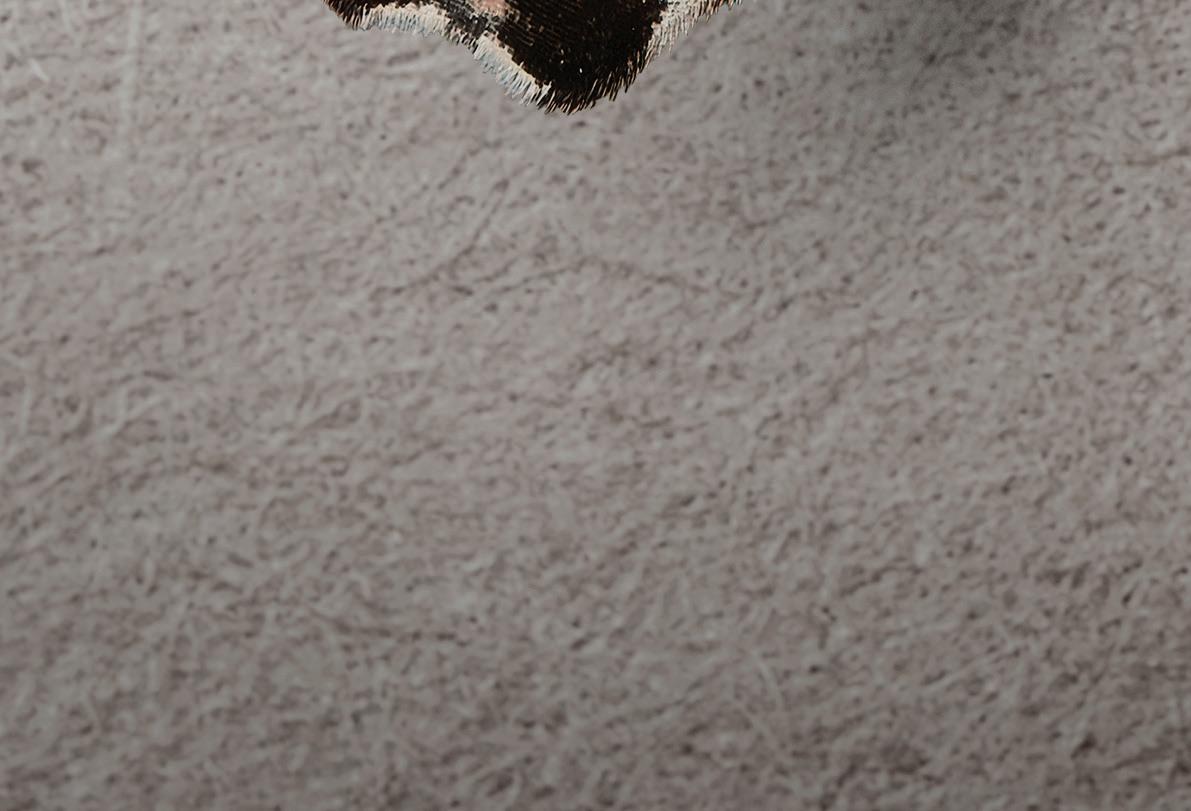

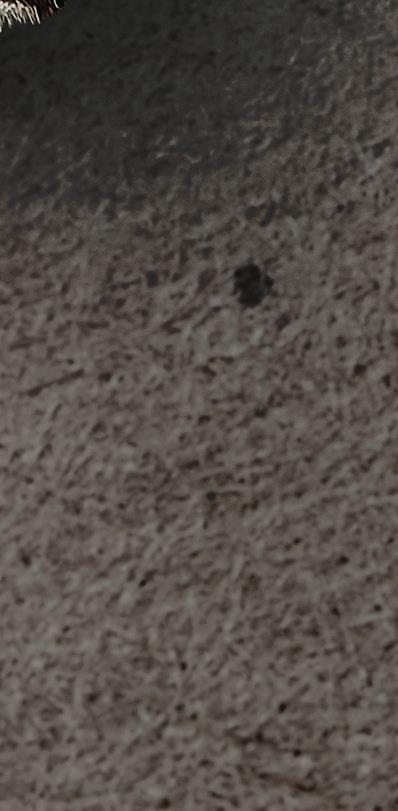
Ri s e All Ri s e Suppo r t loc a l to l i ft us a l l
All
Ch am p i o n G r ee n . i e
BIG NEWS FOR SMALL BUSINESS SFA MEMBERS

IF YOUR BUSINESS HAS SOME NEWS TO SHARE THAT YOU WOULD LIKE FEATURED IN THE NEXT EDITION OF BETTER BUSINESS, CONTACT ELIZABETH BOWEN ON (01) 6051530 OR ELIZABETH. BOWEN@SFA.IE
ETENDERS SYSTEM CHANGE UPDATE


GOING GREEN
Guinness Enterprise Centre invests in going green

The Guinness Enterprise Centre (GEC), a top global incubator in the heart of Dublin city and home to more than 160 innovative start-ups, is partnering with Techies Go Green and building out its sustainability cluster at its hub in Dublin. As part of this partnership, the GEC will become the new home of Techies Go Green, a movement of more than 300 IT and tech-oriented companies which are committed to decarbonising their businesses. Techies Go Green will use the facility as its base of operations, as well as for educational events for signatories. Recently nominated by Government as a Circular Economy Hub, the GEC currently houses 10 innovative organisations working in the sustainability space. This includes companies which are developing green technologies and sustainability solutions that will make a positive impact on the planet. Furthermore, the GEC is building on its own green strategy, investing €500,000 in making its premises more sustainable. Upgrades will cover heat-efficient windows, a new heat pump system and sensor-controlled LED light fittings, the installation of electric vehicle, e-bike and e-scooter chargers and a changing room facility to encourage workers to travel by foot or bike.
The Go-Live date for the new eTenders platform has been agreed as 15 May 2023. Competitions which have been published before 15 May 2023 can be completed on the existing platform, while all new competitions must be published on the new platform from Go-Live. As the Go-Live date approaches, users will be provided with a clear overview of any steps they may need to take upon first login to the new platform. SFA has been assured that all users will be supported in the transition to the new platform. Users of the eTenders platform are asked to visit gov. ie for regular updates and to learn more about training and platform functionality.

SFA | BETTER BUSINESS News Updates 5
Eamonn Sayers, Manager, Guinness Enterprise Centre; Eamon Ryan, TD, Minister for the Environment and Climate; Michael O’Hara, Co-Founder, Techies Go Green; and Dr Mary O’Riordan, CEO, HaPPE Earth
NEW COLLECTION FROM SCATTER BOX

Irish family run business Scatter Box launched its latest homewares collection at Ambiente Trade Fair in Frankfurt last month. The new collection, Edition 1 2023, is a contemporary and cosy curated range inspired by nature, positivity and sustainability. The new collection of cushions, rugs, ottomans and art is available in over 300 retailers across Ireland, the UK and Europe. The company was also delighted to welcome support from Anne-Marie Flynn, Irish Consul General in Frankfurt who took the time to visit the stand at Ambiente and check out the company’s Irish made products. Scatter Box has also been shortlisted at the second annual Guaranteed Irish Business Awards 2023 under two categories - Home and Lifestyle section of the Craft, Home & Gifting category and The Guaranteed Irish Advocate within a Business award. Best of luck to www.scatterbox.ie!
TARGET INTEGRATION AND VRYNO PARTNER UP FOR FRESH IDEAS

SUSTAINABILITY
Target Integration, a leading Dublin headquartered digital adoption service provider, has announced a new partnership with Vryno, a software-as-a-service company, also based in the capital. Vryno’s new homegrown CRM product for Ireland includes the simplicity of the interface and the complexity of the underlying business logic engine. The easy-to-use interface enables customers to use it with ease. The business logic engine allows more educated users to customise it without the knowledge of programming. Together, the two companies will be able to provide clients with a comprehensive suite of software solutions.
Announcing this partnership, Target Integration (TI) CEO, Rohit Thakral said: “This partnership is an important step for TI. TI provides unbiased advice to businesses around their digital transformation needs and having another CRM system in our toolbox allows us to provide options to our customers looking for alternatives to more established CRM vendors.”
For more information, go to www.targetintegration.com or www.vryno.com
BRIODY BEDDING –MOVING TOWARDS SUSTAINABILITY
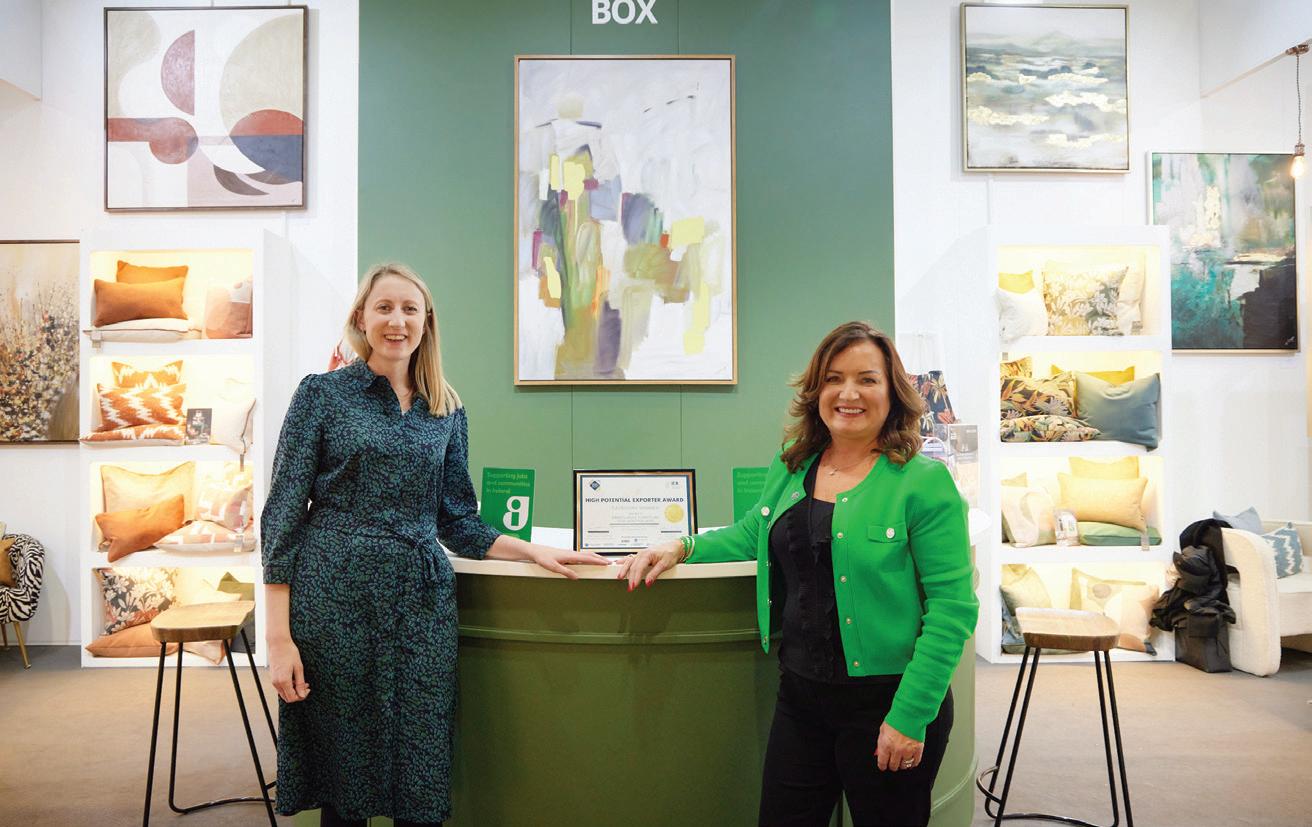
In 2020, the Briody Group, based in Co Meath, began work on a Circular Economy Strategy to build on practices already in place, such as using waste timber material to heat manufacturing facilities. The company sourced fabrics for mattresses from suppliers using Repreve materials which are made from upcycling plastic. Cut-off materials and foam, previously destined for landfill, are now recycled and returned to Briody Bedding as mattress pads. This has reduced their contribution to landfill by over 50% since March 2020. In February 2022, the largest project under the Strategy commenced when the business wholly funded the installation of solar panels on their facility. On 31 January 2023, the panels were generating 40% of the company’s required energy –this should rise to 70% over the year. Briody Bedding is proud to bring new and improved design options to market in an environmentally sustainable way.
To learn how your small business can begin its sustainability journey, visit SEAI.ie or contact your Local Enterprise O ce today.
Updates News 6 SFA | BETTER BUSINESS
Caroline Horgan, CEO of Abbeylands Furniture trading as Scatter Box and Anne-Marie Flynn, Irish Consul General in Frankfurt
TOP TWEETS
@ibec_irl
- The second episode in our Ibec Voices mini-series focusing on the small business community in Ireland is now available!
We are joined by:
Aine Kennedy, @thesmoothco, Jenny Diamond, @nannypayrollirl, Jamie Flannery, @DingleSeaSafar, Listen now: https://ibec.ie/ ibec-podcasts/ ibec-voices/episode-25
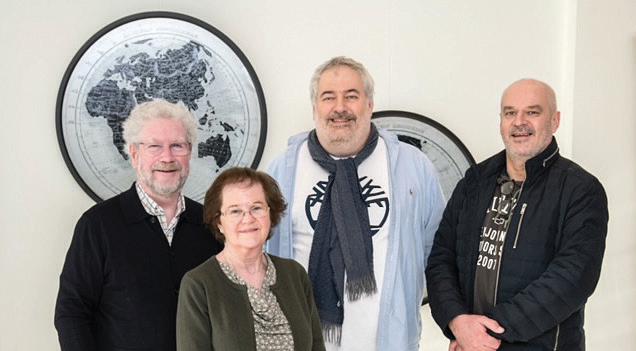
@siobhanlawlor3
- Best of luck with the @SFA_Irl event. #Colm’s presentation sets out free supports & services available nationwide to #employers through #WorkWithIntreo @jobsireland @welfare_ie
@EURESIreland @CBPES_online
For more information contact employer@ welfare.ie/ thru our social media
@Fexco_cpayments - Are you a small enterprise with foreign currency payment requirements?
If so Fexco can help. In the meantime, why not check out what @SFA_Irl has to offer your business.
@VoltedgeHR - Voltedge Management CMD Joyce Rigby-Jones Chartered and Rohit Thakral @TargetIntegration joined Steve Halpin @ProcessAdvisor for a Q&A on the benefits of new systems & processes last week at @SFA_Irl #BizConnect. Thank you Elizabeth Bowen & the team SFA Ibec for the invitation!
Two Small Craft Producers, Better Than One
Clonakilty Distillery and O’Hara’s Carlow Brewing Company have worked together again to release a second batch of Clonakilty O’Hara’s Cask Finish Special Edition. This limited-edition of 1600 bottles of whiskey hit the shelves on March 4th, just in time for St Patrick’s Day. The first release garnered a gold medal at the World Whiskey Awards 2022 and so the latest release was much anticipated. What makes this relationship work so well is how much these two small businesses resemble each other. According to Seamus O’Hara at Carlow Brewing Company: “We are a small volume craft brewery with big goals and our focus has always been on creating quality beers that push the envelope. Clonakilty has a similar story to tell about innovation in the whiskey industry.”
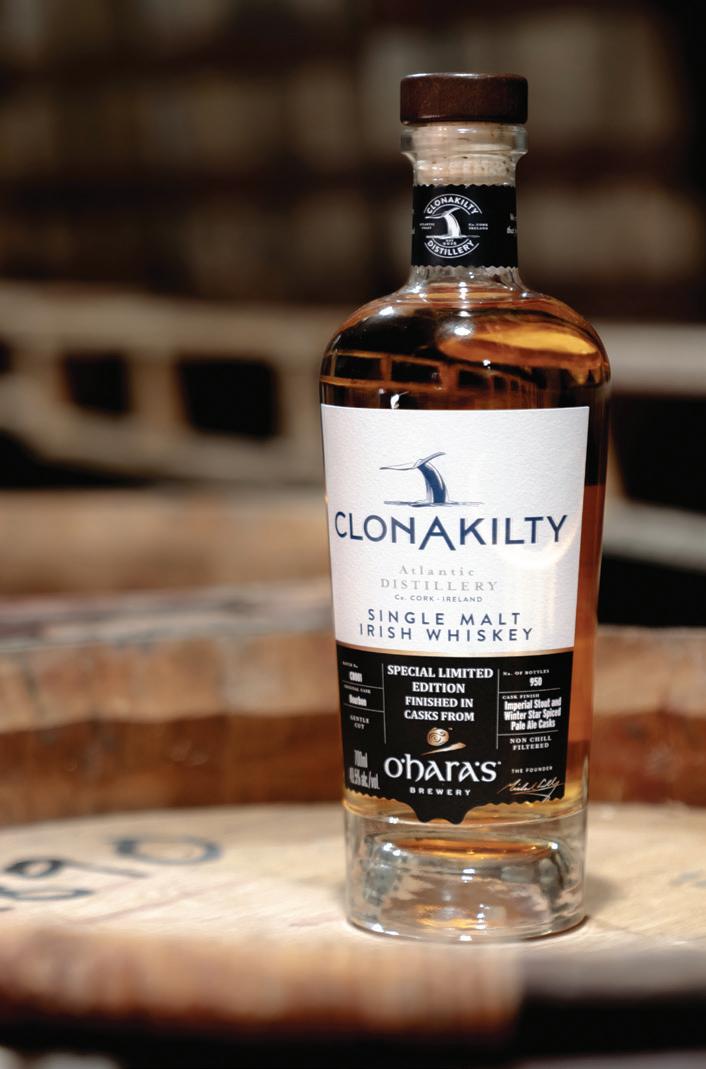
OAK TREE PRESS JOINS CORPORATE GROUP
Cork Publishing Ltd, the parent company of Oak Tree Press, has been acquired by JMB and is now part of the Corporate Group, an international publishing entity operating in three countries and five languages. Oak Tree Press is Ireland’s leading business book publisher. Corporate Group’s catalogue extends to more than 500 titles, most of them annually updated for all professionals in specific entrepreneurial domains such as business, law, tax, contracts and other company subjects. Oak Tree Press’s reputation in the Irish market and abroad has been built over the past 30 years through the dedication of their authors, publishing team and suppliers, as well as through the support of their customers – individual, organisational and trade. Corporate Group is an excellent fit for Oak Tree Press and offers new opportunities for its titles and authors.
COSMETIC ASSOCIATION TRADE SHOW HEADED BACK TO RDS
The Cosmetic Association Annual Trade Show is very excited to announce its return to the RDS on May 14/15/16th. This year the show is back in the Main Hall and Hall 3, after a successful but smaller event in 2022. At this year’s show, there will be a number of new exhibitors and a wide range of ‘never before seen’ products. Buyers at this not to be missed B2B event will have plenty of time to choose from the best ranges in the business. All the exhibitors are looking forward to the show and will rise to the challenge of decorating their stands to the highest level. This will be the brightest and most welcoming Cosmetic Association event all year.

SFA | BETTER BUSINESS News Updates 7
@SFA_IRL
EVENT
CRAFT
PRODUCT
(left to right): Brian O’Kane, Rita O’Kane (both of Oak Tree Press), Axel Neefs and Pierre Delroisse (both of Corporate Group)
“While it is disappointing to see applications to TBESS have been lower than expected, hopefully this new entry level and a more simplified application process will safeguard small firms most affected by rising energy costs.”
David Broderick,
SFA Director, on extended cost of business measures
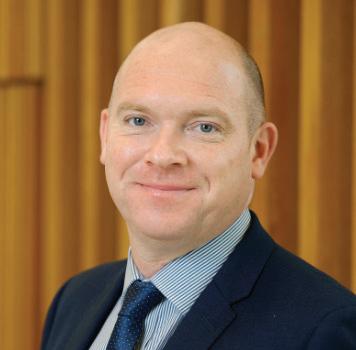
“Business Connect offers small companies and suppliers’ valuable insights from procurement experts in large companies, State agencies and successful small firms.”
Geraldine Magnier, SFA Chair, speaking at the SFA Business Connect Event
“SFA will continue to engage with the Department to achieve successful outcomes that bring about the important environmental objectives of this initiative, while recognising the short and long term needs of small businesses in the impacted sectors.”
Elizabeth Bowen, SFA Public Affairs Lead on the cup levy consultation (go to page 36 for more on this topic)
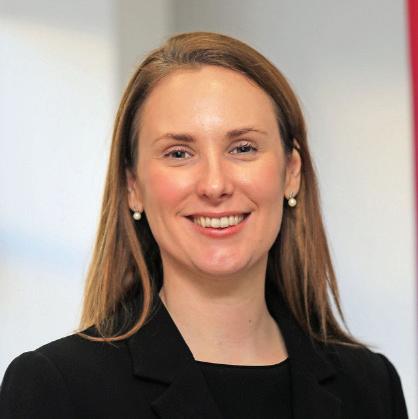

Carrolls Irish Gifts supporting small businesses
ON-SITE REFUELING IN SUSTAINABLE PARTNERSHIP WITH CAIRN
Cairn is proud to announce a partnership with On-site Refueling to supply Hydrotreated Vegetable Oil (HVO) for use in plant and machinery across all Cairn sites in Ireland. HVO renewable diesel is a drop-in-ready biofuel that is produced using organic matter or biomass such as vegetable oils or waste feedstocks and processed by hydrogenation (treated with hydrogen), making it chemically identical to traditional diesel. This switch to HVO will deliver Cairn a reduction in Scope 1 CO2 emissions and other harmful pollutants and will contribute towards the ongoing decarbonisation of the construction industry. Cairn has worked closely with On-site Refueling to procure a secure supply of certified and sustainably sourced HVO and will continue to do so throughout the partnership. On-site Refueling, based in Dublin 22, offers direct-to-equipment and direct-to-vehicle refueling with ISO certified fuel management technology solutions across Ireland. It serves a diverse range of markets including construction, commercial transport, government agencies, food distribution and airports.
Carrolls Irish Gifts has announced the launch of ‘Fáilte’, a new initiative that gives small Irish businesses the opportunity to become a part of the team and have their products stocked in Carrolls Irish Gifts stores nationwide and online. From April 3rd, Carrolls is encouraging small Irish businesses to apply for the competition and meet with its buying team to share the journey of their business so far. Applications will close on May 1st and successful businesses will go through an interview process before Carrolls Irish Gifts arrives at a final decision and selects one winner. The winner of the competition will receive a comprehensive support package, including stocking their products in multiple stores nationwide, online promotion of their brand worth up to €20,000 and a full day of business mentoring across a range of areas including marketing, finance, retail sales and operations and product strategy. CEO of Carrolls Irish Gifts, Peter Hyland said: “Carrolls Irish Gifts has been dedicated to supporting small Irish businesses for as long as I can remember. We are delighted to launch Fáilte and put a more formalised process in place to ensure we speak with as many talented Irish suppliers as possible.”
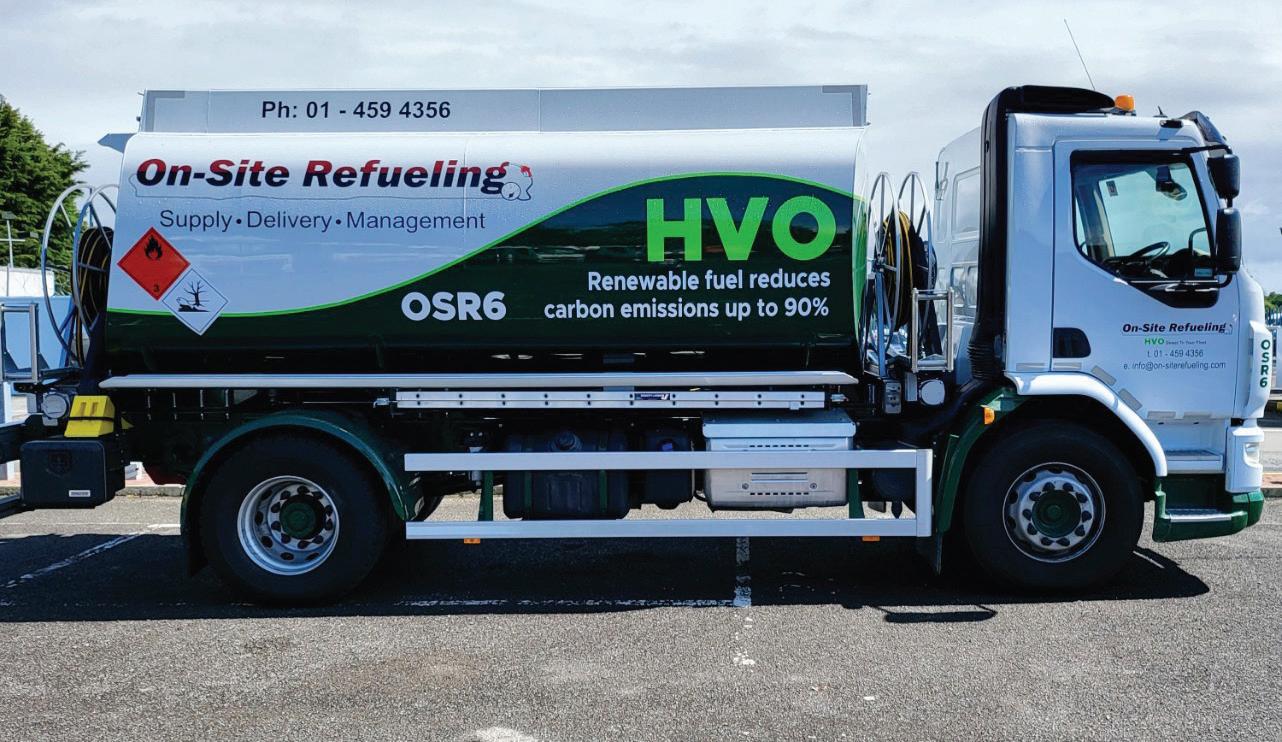
Updates News 8 SFA | BETTER BUSINESS
SUPPORT
Green skills for a sustainable future

• Develop new skills in your team
• Green your business for cost savings, competitiveness and profitability










































• Access highly subsidised flexible training boost skills – boost business


Contact your local Education and Training Board or visit skillstoadvance.ie

learning works
WOMEN RETURNERS COACH
DARINA MULLIGAN EXPLAINS








HOW RETURNER PROGRAMMES CAN HELP ALLEVIATE SKILLS SHORTAGES


















BACK TO WORK

Feature Recruitment 18 SFA | BETTER BUSINESS Recruitment BETTER BUSINESS
Formany employees, the days of working 9 to 5 in the o ce have well and truly disappeared. Covid has ushered in a new era of hybrid working and it’s one that employers want to be part of. In a recent survey carried out by NUI Galway, 76% of respondents said working from home made their jobs easier. Approximately 30% said they would change jobs if their remote working preferences were not facilitated, while 33% said they would do so even if it meant a pay cut. Increasingly, hybrid working means exibility and over the past few years, that exibility has enabled people who have been out of the workplace for an extended period to get back to work.
Darina Mulligan runs Camino Coaching, a company that specialises in leadership and entrepreneurship coaching. She also works as a coach with Women Returners, a network that works with employers and career returners to enable professionals to return to work a er an extended career break. Women Returners was established nine years ago by Julianne Miles who, a er taking a parental career break, decided to retrain as a chartered psychologist. She began running workshops for people who wanted to return to work, but didn’t know where to start. Women Returners was born from a desire to develop a large-scale support community for returners, but also to remove the ‘career break penalty’ by making extended career breaks a normal part of a 40 to 50 year career. “Covid has changed how we work. Increasingly, we’re seeing companies recruiting for hybrid working roles and that exibility is allowing more people to get back to work,” said Darina. Quite o en, the work returners market isn’t one that employers are even aware of. “With so many employers
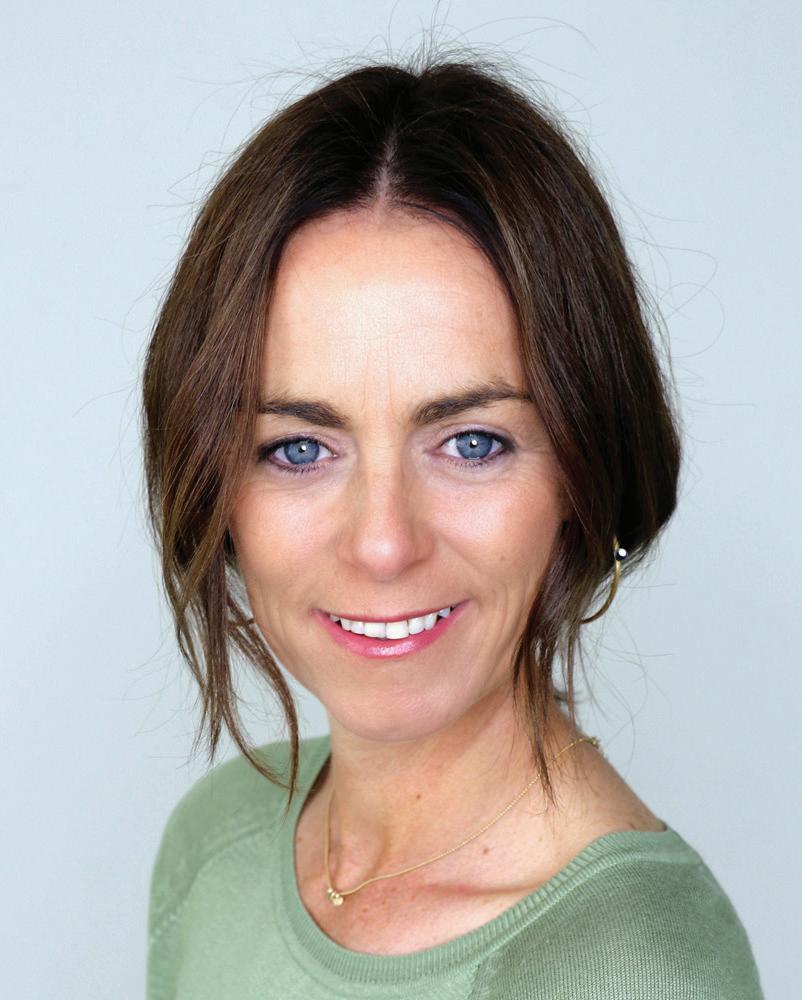
nding it di cult to source skilled sta , engaging with the returner talent pool makes perfect sense.” It’s not just people returning to the workplace who have taken a four or ve year break. “Recently, a woman on one of our programmes had been out of the workplace for 20 years. At Women Returners, one of our missions is to remove the idea that if you’ve been out of work for an extended period of time, you’re automatically out of the running for a role. Last year, we carried out a pilot programme with Deloitte which proved very successful. We had 10 returners on the programme and eight of them are now in full-time roles at Deloitte. We’ve had so many success stories. It’s really important to get the message out to employers that there’s a huge pool of talented, experienced professionals out there who want to get back into the workplace. It’s just a matter of being open to new ideas.”
In addition to coaching would-be returners, Women Returners also engages with employers to assess their needs around recruitment. “We would ask what they want to achieve, where the role will be in the organisation and what the requirements are. Taking on a returner is di erent to taking on someone who’s already in the workplace and we would talk to the employer about managing expectations at the beginning. We do line-manager and interviewer training to ensure that the right people in the company are engaged in the process. It’s also really important that there’s buy-in from senior level management as that enthusiasm and support will then lter down.”
at buy-in from senior level management is on the up. Returnships in Ireland are on the rise and although the process may take time, returners are increasingly lling much needed roles within Irish businesses. Employer concerns around hiring a returner tend to be around technology and training. “For a returner, if you’ve been out of work for three or four years and you’ve been asked to interview over Zoom, that can be very daunting. An employer may have questions around a person’s ability to, for example, look a er the company’s LinkedIn page or update a website. Training may be needed but we have found that when a returner decides to go back into the workplace, their enthusiasm and commitment is o the charts. From a professional perspective, that sense of achievement has perhaps been missing and is what drives a returner to excel. We typically have an 80 to 90% success rate with returners, which I think speaks for itself.”
For employers looking to bring women back into the workplace (and men who have also started to engage with the network), utilising the services provided by Women Returners is a great start. “It’s important to go about the process in the right way. We sometimes hear of rms that have taken on a returner in an ad hoc way, without the right support and the process has failed. e right support is crucial and that’s what we provide.”
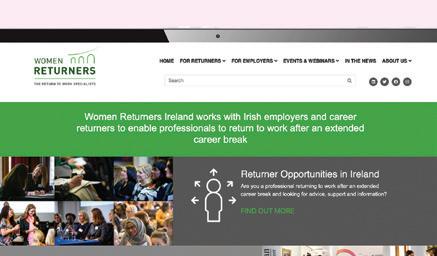
What’s the business case for returner hiring for your organisation?




Returners represent a wealth of untapped talent, with a huge amount of experience in the labour market They give companies the opportunity to reflect the society that we serve.
A returner programme allows both the employer and the returners to take on the risk that a hiring process brings in a safe environment.
It allows a company to wade into a pool of talent, who are highly capable, highly talented and uniquely brave because they’re taking themselves out of their comfort zone to return to work after an extended career break.
SFA | BETTER BUSINESS Recruitment Feature 19
Darina Mulligan
As 90% of people on a career break are women, returner programmes offer a fantastic opportunity to have a real impact on a company’s D&I agenda.
CONNECT AND GROW
THE SFA RECENTLY HELD ITS FLAGSHIP MARKETPLACE EVENT BUSINESS CONNECT, WHILE SMALL BUSINESS OWNERS GOT THE OPPORTUNITY TO SHARE EXPERIENCES AND KNOWLEDGE AT THE SFA NATIONAL SMALL BUSINESS AWARDS
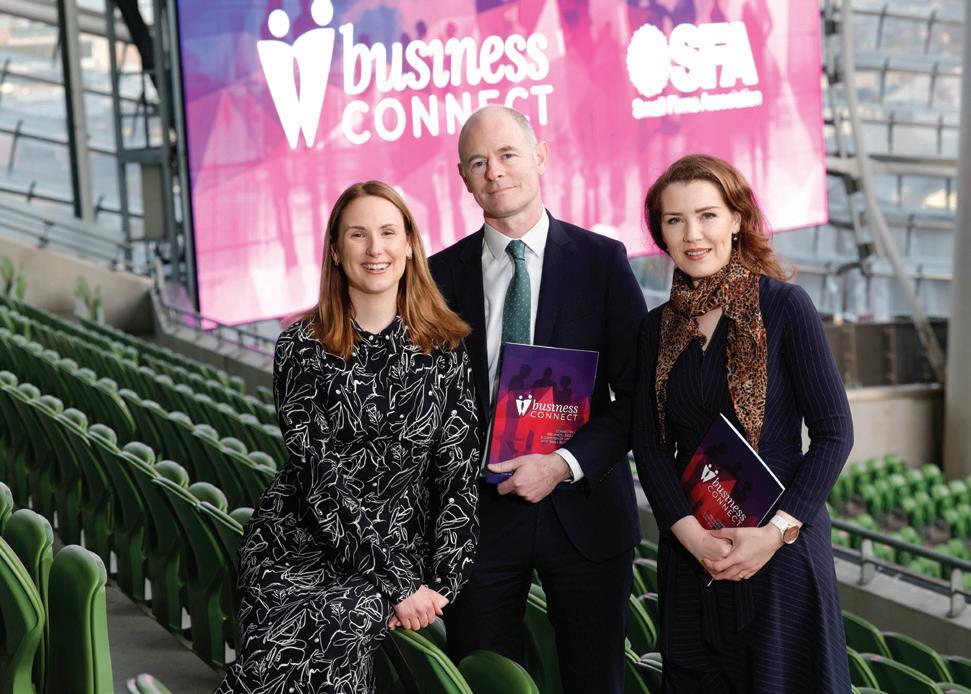
On8 February, the Small Firms Association was joined by over 300 small and large businesses at Business Connect, our flagship event in the Aviva Stadium. This marketplace event is aimed at small businesses looking to supply to large indigenous and multinational firms and bigger businesses interested in diversifying their supply chains. Thanks to its position as part of Ibec, the SFA was uniquely placed to create this marketplace event, bringing its members together with leading companies from across the Irish business ecosystem.
Business Connect was officially opened by Minister of State for Public Procurement, Ossian Smyth TD, who addressed delegates about the importance of SME participation in the public procurement process and a new eTenders platform. SFA Chair and Co-Founder and Director of Idiro Analytics Geraldine Magnier welcomed delegates to the event. Imelda Hurley, Ibec President and CEO of Coillte, spoke on her own experience of working for a small business participating in an international supply chain, plus her work with Coillte and its important place in public procurement.
Returning MC RTE’s Richard Curran introduced the three sessions and facilitated Q&A’s with panelists. In the first session entitled ‘Circularity Through the Supply Chain’, we were joined by Gillian Shields, Customer Sustainability Partnership Manager at Coca Cola HBC IOI; Brendan Palmer, CEO at Chevron Environmental; Eamonn Donlyn, Founder at Darwin & Goliath; and Ingrid de Doncker, CoFounder at Future Planet. We then heard from Keynote Speaker Paul McNeive, customer service expert, business advisor, double amputee and author of business book ‘Small Steps: Everything is Possible’, who spoke about planning, customer service and the importance of making your customers feel special.
In our second session, Steve Halpin, Owner of Lean Teams, Rohit Thakral, CEO of Target Integration and Joyce Rigby Jones, Joint Managing Director of Voltedge Management discussed innovative business processes. Finally, we were joined by Richard Maynes, Global Head of Fashion and Accessories at Aer Rianta International; Enda McDonnell, Dublin Regional Director of Enterprise Ireland; Darren Fortune, CEO of Ventac; and Troy Lavin, Managing Director of VitHit for the third session on discovering new markets and new opportunities.
Delegates also had the chance to visit the exhibition area of the SFA National Small Business Awards, where finalists displayed their businesses and showed why they are in the running to be named the next best small business in Ireland. Thank you to all the awards sponsors and event exhibitors – DeCare, Cisco, Enterprise Ireland, Permanent tsb, .IE, Bord Bia, NSAI, One4all, SBCI, Sage, O’Leary Insurances, Intertrade Ireland, DriverFocus, MentorsWork, Open Doors Initiative and Ibec.
EVENTS
If you didn’t get the chance to attend Business Connect this year, we have plenty of upcoming virtual and in-person events that you can register for now at www.sfa.ie/events, such as our SFA Quarterly Seminars. If there are any events that you would be interested in to either attend or host alongside the SFA, please contact info@sfa.ie
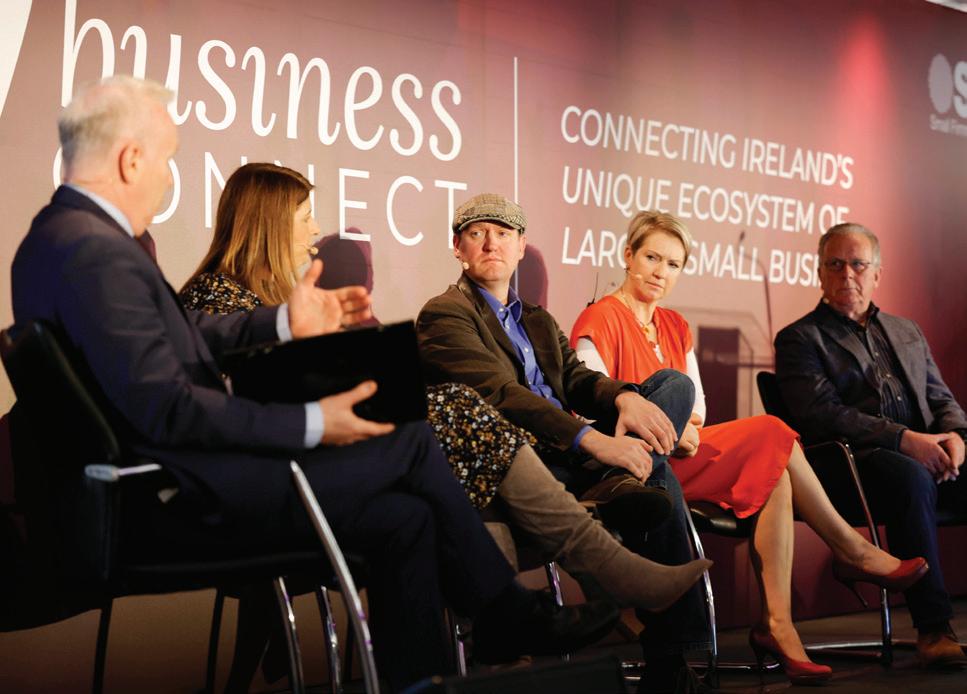
Events Business Connect 12 SFA | BETTER BUSINESS
SFA
SFA NATIONAL SMALL BUSINESS AWARDS
As part of the SFA National Small Business Awards finalist package, the 2023 finalists were immersed in entrepreneurial environments to stimulate new ideas for growth through our awards events such as the Management Masterclass Weekend in Athlone. These small business owners were able to share experiences, learn from the success and mistakes of others and build working relations with the other finalists and sponsors.
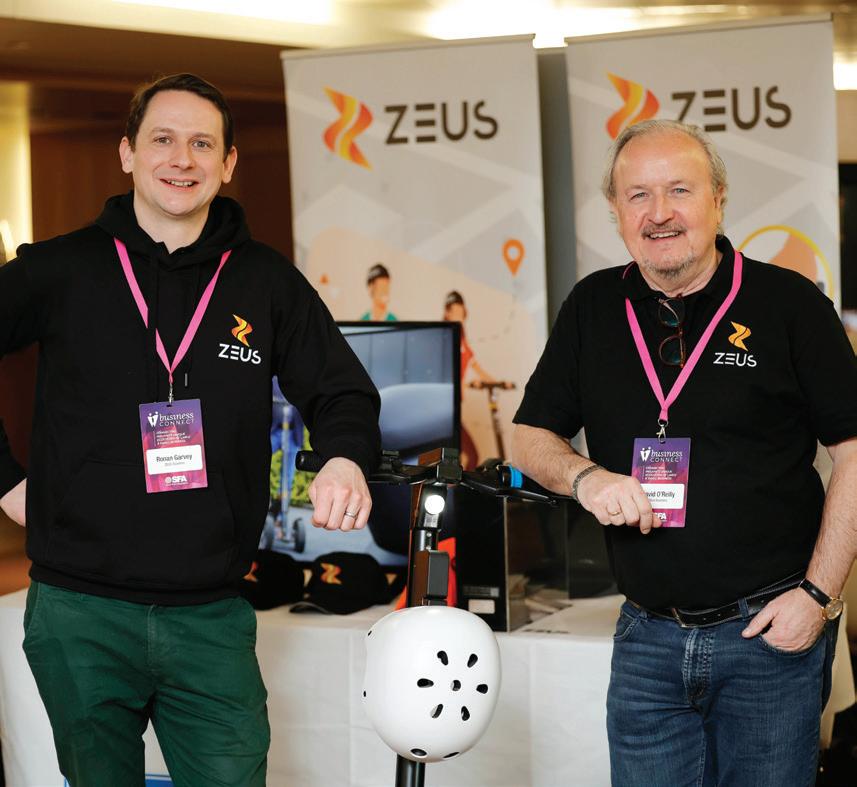
Some of the business experts the 42 finalist companies were able to learn from included Barry McLoughlin from The Communications Clinic, Maryrose Lyons from Brightspark, Valerie O’Keeffe from ClarityVP Consulting, The Agile Executive and an employment law update from SFA HR Executive Fiona Mulligan.
If you would like the opportunity to learn from other industry experts and build connections with other small businesses, be sure to apply to the SFA National Small Business Awards 2024 – applications will open in September 2023. Visit www.sfa. ie/events to register for our upcoming events.

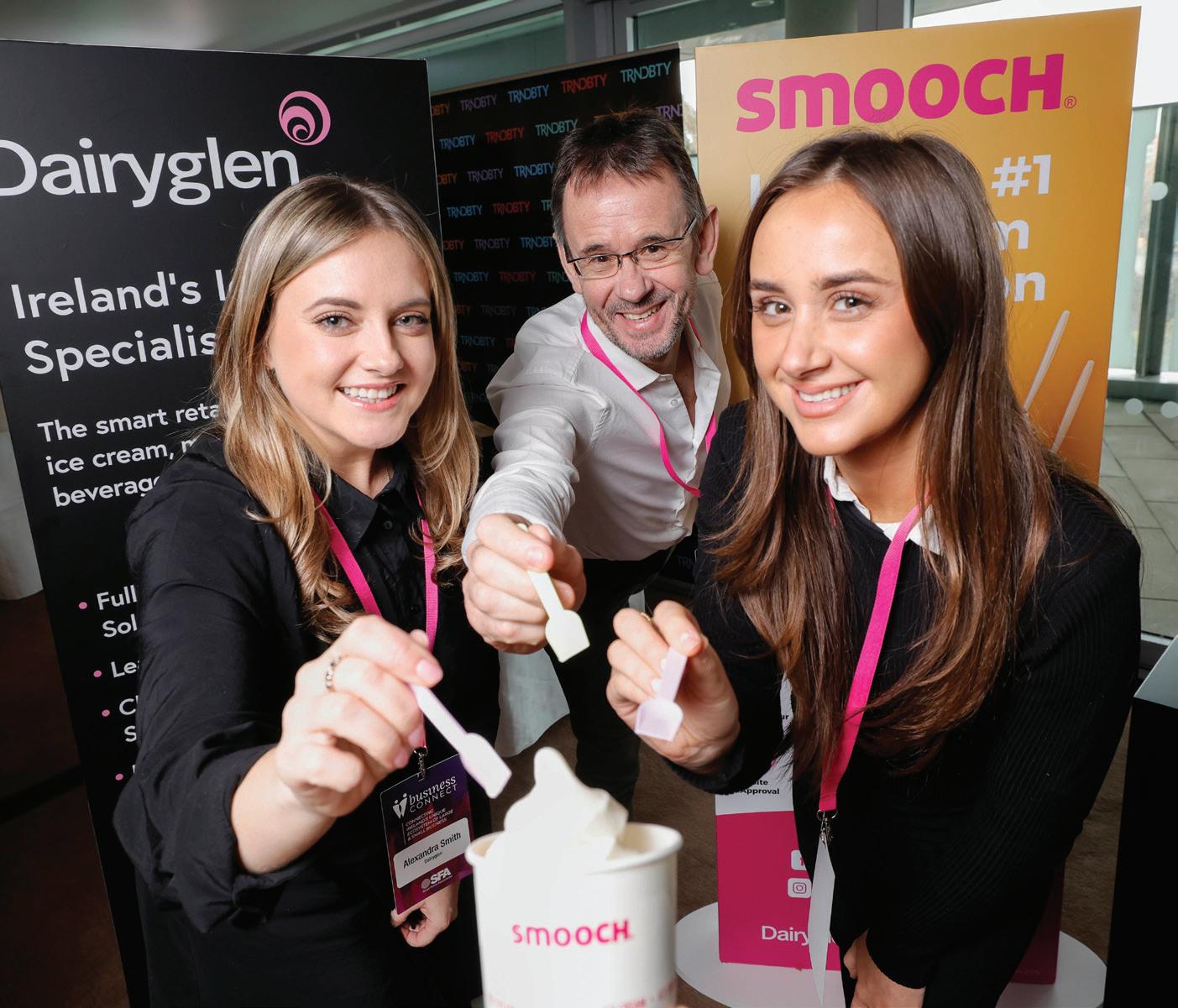
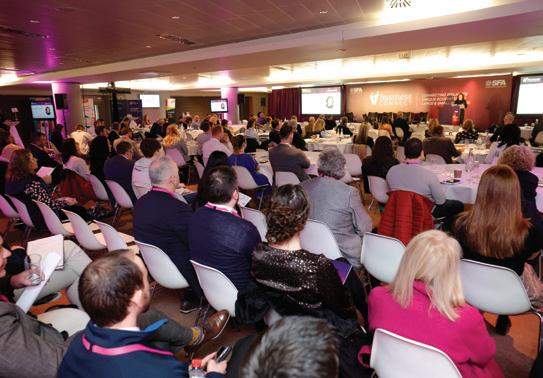
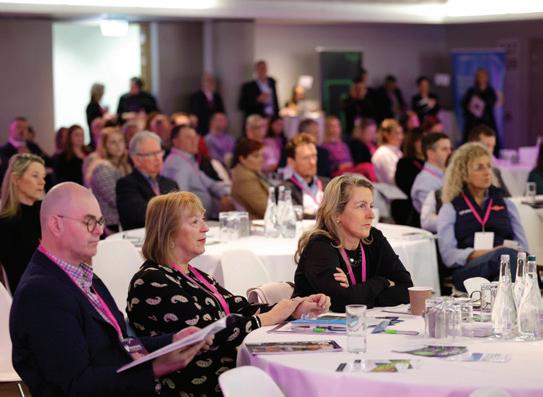
If you would like to suggest any event topics that you would be interested in, please contact info@sfa.ie

SFA | BETTER BUSINESS SFA National Small Business Awards Events 13
Dentistry spotlight under the












BETTER BUSINESS CHATS TO THREE PROFESSIONALS WORKING WITHIN IRELAND’S DENTAL INDUSTRY ABOUT THE CHALLENGES FACING THE SECTOR















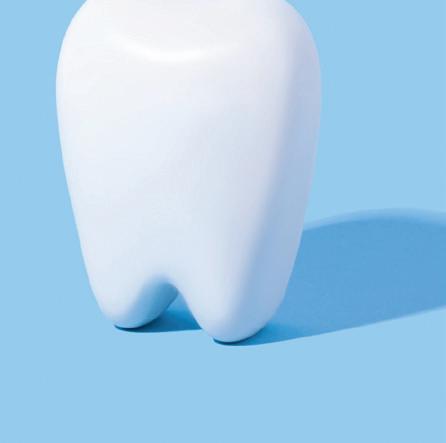

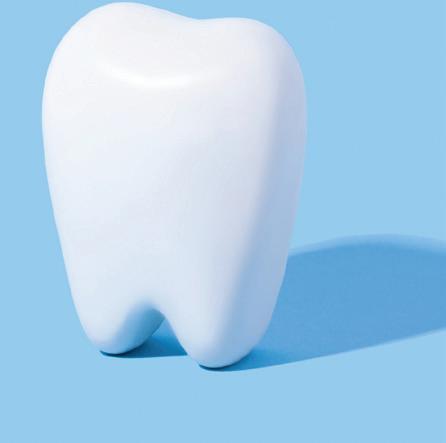





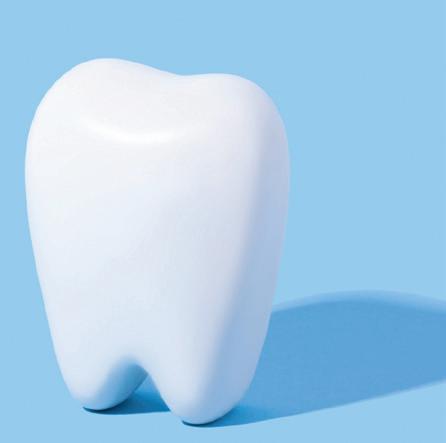




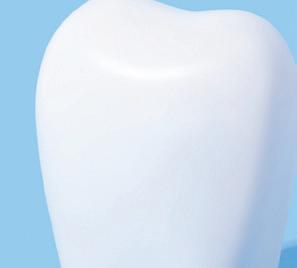



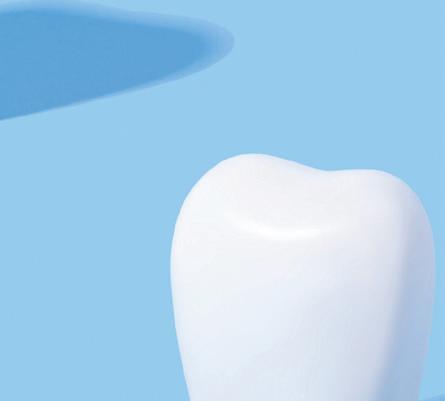







Sector
SFA |
Spotlight
BETTER BUSINESS
Last year,
several news outlets reported on the dire lack of dentists, dental hygienists and nurses working in Ireland. Dental clinics across the country were unable to deal with a growing volume of patients, while industry bodies were calling for a complete overhaul of the medical card (DTSS) scheme. Since then, the situation hasn’t changed. According to the Irish Dental Association, a record number of dentists are registered to practice in Ireland, despite the fact we have a shortage. “To me, that suggests supply isn’t keeping up with demand. There’s a huge mismatch between the demand for oral health in this country and the capacity to meet that demand. Our single biggest problem is a workforce shortage and that’s why the Association has identified it as its single biggest priority and why we will shortly be publishing a paper outlining a number of responses and solutions to enable dental practices to hire more staff,” said Fintan Hourihan, CEO at the Irish Dental Association. Those solutions are wide-ranging and include changes to the work permit system for dentists, changes to the list of occupations
eligible for Visas and an increase in the number of places in Irish dentist schools.
“The number of graduate places hasn’t increased in the last 50 years. Many of the classes in Dublin and Cork are made up of overseas students who are paying annual tuition fees of about €45,000, so effectively they’re cross-subsidising the other students. The result is that there are fewer places available for Irish secondary school leavers who wish to study dentistry.”
Over one and a half million adults are entitled to limited care under the DTSS scheme, says Fintan, but it’s just not happening. “Overnight, annual expenditure for that scheme went from €86 million to €10 million. Once the

recession hit, State spend was dramatically scaled back and it’s the same with the PRSI scheme. The financial crisis saw a reduction in the reimbursement levels to dentists, while treatments available to medical cardholders were suspended or available in emergency cases only. That situation hasn’t changed in the intervening period.” In Ireland, the vast majority of dental care is provided through private practice. A public dental service for children and special care patients is also in operation and over the last decade, the number of eligible under 16s for this service has increased by 23%. “That increase isn’t being met as the number of dentists available to treat them has fallen by 25%.”
Lobbying is an important element of the Association’s remit, whether that’s
SFA | BETTER BUSINESS Dentistry Sector Spotlight 15
“OUR SINGLE BIGGEST PROBLEM IS A WORKFORCE SHORTAGE AND THAT’S WHY THE ASSOCIATION HAS IDENTIFIED IT AS ITS SINGLE BIGGEST PRIORITY AND WHY WE WILL SHORTLY BE PUBLISHING A PAPER OUTLINING A NUMBER OF RESPONSES AND SOLUTIONS TO ENABLE DENTAL PRACTICES TO HIRE MORE STAFF.”
Fintan Hourihan, CEO, Irish Dental Association
around changes to Government policy on dental schools, policy on permits or Visas or policy on the recruitment of public service dentists. The work permits issue is high up on the Association’s agenda, says Fintan. “If you’re a non-EU graduate, of which there is a large number coming out of Irish schools, you can only work as an employee. In dentistry in Ireland, the vast majority of dentists are self-employed. Say for example you have a dentist from India. That person can only work as an employee dentist, despite the fact that 95% of the dentists in private practice are not employees. That immediately causes a problem. If Government was to amend that rule, the industry would feel the benefits straight away.”
The Irish Dental Association continues to lobby Government on the above issues. Dr Caroline Robins, President at the Association and owner of Kiwi Dental in Carlow, has first-hand experience of the skills shortage in the profession. “I currently have two full-time dentists, but I need three. For a little while last year I had three dentists and it was absolutely ideal. It took the pressure off and meant we could better accommodate our patients and properly deal with emergencies. Now if an emergency comes in, it’s not like I can ask a patient to get out of the chair and let someone else in. Time management is difficult when you’re short-staffed and this isn’t just an issue in my business. It’s country-wide – dentists across Ireland are crying out for more staff.”
Dentistry is an expensive profession to teach and that’s why Irish dental schools are so reliant on international students who pay higher fees than Irish students. “That’s not purely an Irish problem; it happens in the UK, in New Zealand, across the world. The problem is that international students often go home and even if they wish to stay in Ireland and work as a dentist, they can’t due to work permit issues.” As mentioned above, non-EU dentists can only work as an employee. “That means that their employer must take on their indemnity, which has its drawbacks. Dentists traditionally follow a self-employed model, meaning we are individually responsible for our own work. The current model makes taking someone on with a work permit a far from straightforward process.”
New Zealand born Caroline set up Kiwi Dental in Carlow town in 2012. Before that, she worked in Dublin’s Dental Hospital and completed her statutory exams with the Dental Council which allowed her to work in Ireland. Setting up on her own was a huge learning curve. “We’re trained to be dentists but we don’t get any training in business. It was a baptism of fire. Hiring staff, HR, compliance, risk assessments, all those elements were foreign to me.” Like any business, Caroline is having to deal with rising energy costs. “There are pieces of equipment in the practice that must run all day and despite our best efforts to turn anything unnecessary off, we have still seen a four fold increase in energy costs. Material costs have also gone through the roof. Balancing the bottom line is a constant battle, the goal posts are changing on a weekly basis.”
In her role as President of the Irish Dental Association, Caroline is kept busy lobbying Government on several issues. She is, she says, somewhat battle weary from liaising with the Department of Health and the HSE on the medical card scheme. Today, there are about
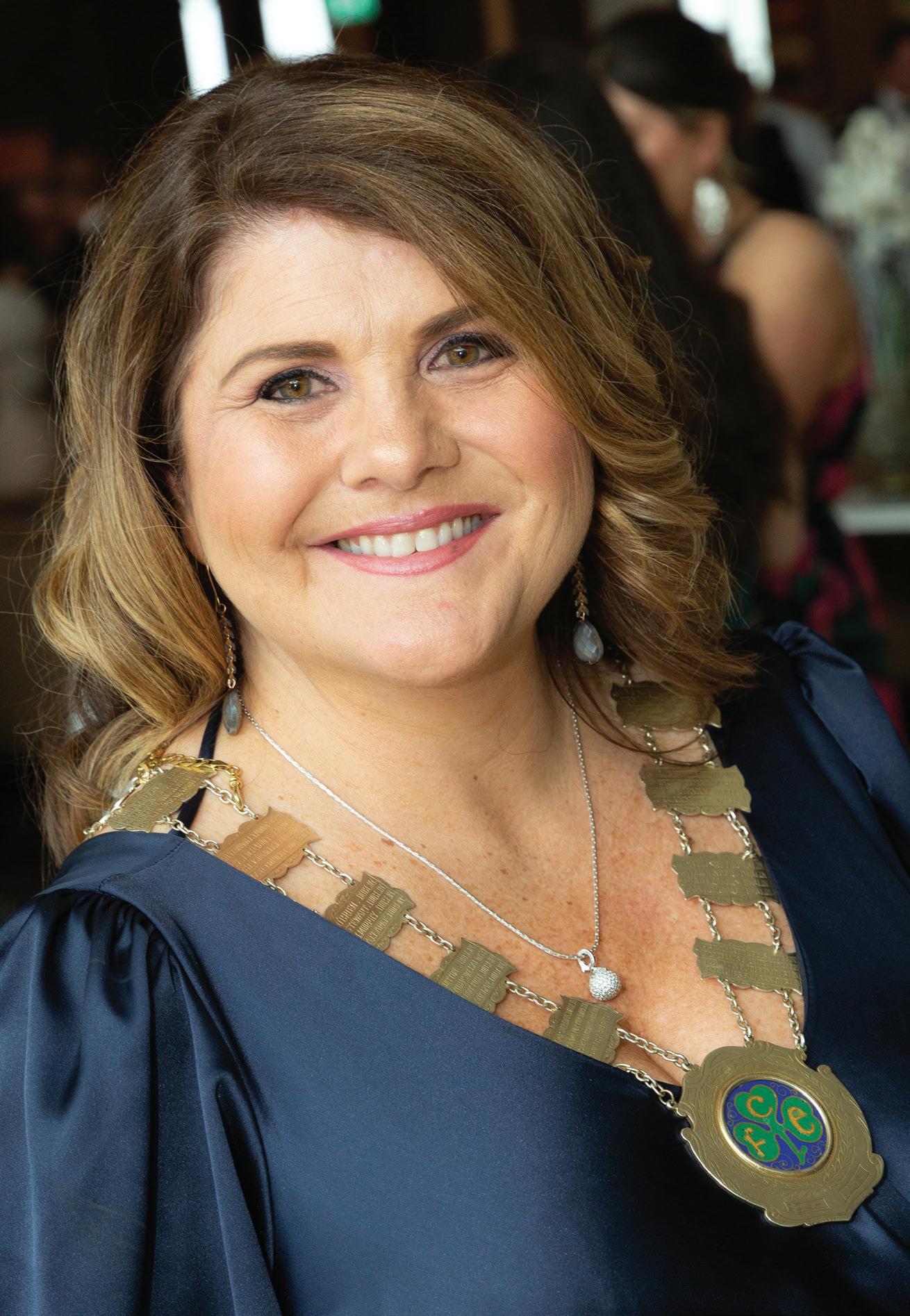
Sector Spotlight Dentistry 16 SFA | BETTER BUSINESS
Dr Caroline Robins, Irish Dental Association and owner of Kiwi Dental
“THE CURRENT MODEL MAKES TAKING SOMEONE ON WITH A WORK PERMIT A FAR FROM STRAIGHTFORWARD PROCESS.”
650 dentists operating in the public dental system, compared with 1,600 in 2012. “It’s so frustrating that politicians seem to place no priority on oral health. The people in our society with the greatest need are often not being provided for. I’m not holding my breath that the situation will change any time soon.”
Thirty years ago, Dr Garry Heavey acted as Chairman of the team that negotiated the DTSS scheme. “It should have been reviewed every five years, but it was neglected. Today, the scheme is totally unfit for purpose. Speaking personally, I haven’t participated in the scheme for 20 years because in my opinion, you cannot engage with the medical card scheme and provide an adequate service. There are some dentists participating in the scheme, perhaps out of the goodness of their hearts, but you’re forced to work very quickly.”
Garry believes the medical card scheme needs to be renegotiated. “There are a lot of people out there in significant dental need. Unfortunately, after 20 years of dealing with the powers that be, it’s very difficult to trust that they’ll do the right thing. What has been proposed to date is completely unworkable.”

Garry set up Sandycove Dental Care in 1985. Despite the challenges, it’s a profession he thoroughly enjoys. “My only regret is that I can’t start my career all over again. I’m also lucky in that my youngest son feels the same way and works with me at the practice. It’s one of those happy events that I ended up doing something I really enjoy.” Garry’s practice has six surgeries and employs 17 people. Back when he started out, there were very few practices of that size. “I’ve had the opportunity to run an effective business but also run a practice. From an early age, I
helped run the family business so I’ve never found that side of the practice daunting and I think I understood from the outset what made a small business successful in terms of the service that was required.” Garry computerised the practice quite early on and used KPI’s to evaluate the business on a monthly basis. Once the business was up and running, he began giving lectures in practice management. “I think at one stage, about a quarter of the practices in Ireland had taken a course with us. Gradually, I decided to put all my energy into dentistry, but I still give one-off lectures from time to time. It’s a nice mix.”
Garry’s career in dentistry began in 1980. In the intervening years, the industry has changed significantly. Treatments have evolved and patient expectations have grown. “When I started, appearance and aesthetics weren’t big issues. That has changed and the profession is so much more interesting for it.” Investment in technology has been a priority from day one. “We were one of the first practices to invest in intraoral cameras about 30 years ago and we also digitalized our X-rays 20 years ago. It’s wonderful to see so many practices investing in technology and training, which is of course costly, but helps to build trust between the dentist and patient.”
Garry’s ambition is to continually improve the service offering to customers. “We’ve just completed a refurbishment of the practice, which we undertake every 10 years or so. Keeping the space fresh, staying up to date with technology and ensuring our patients are happy and healthy are the priorities.”
SFA | BETTER BUSINESS Dentistry Sector Spotlight 17
“THERE ARE A LOT OF PEOPLE OUT THERE IN SIGNIFICANT DENTAL NEED. UNFORTUNATELY, AFTER 20 YEARS OF DEALING WITH THE POWERS THAT BE, IT’S VERY DIFFICULT TO TRUST THAT THEY’LL DO THE RIGHT THING. WHAT HAS BEEN PROPOSED TO DATE IS COMPLETELY UNWORKABLE.”
Dr Garry Heavey, Sandycove Dental Care
ENERGY
RESOURCES FROM SEAI CAN HELP SMALL BUSINESSES REDUCE THEIR ENERGY BILLS WHILE IMPROVING THEIR ENERGY PERFORMANCE
Feature Energy 18 SFA | BETTER BUSINESS Energy BETTER BUSINESS
AWARE GET
SEAI’s
annual analysis of energy in Ireland has reported that Ireland’s energy-related CO2 emissions increased by 5.4% in 2021. Looking to 2023, there are many measures we need to take to reduce our CO2 emissions and these actions are now more urgent than ever.
At SEAI we recommend that businesses take a step-by-step approach to energy e ciency
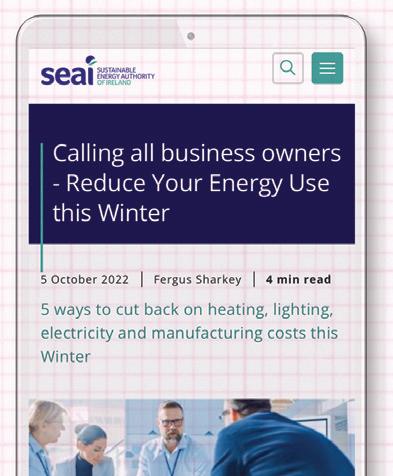

STEP 1: Understand your energy use. Our Energy Academy is the perfect resource for that
STEP 2: Develop an energy action plan which is where our “Introduction to Energy Management” workshop comes in handy
STEP 3: Complete an energy audit. If you’re spending more than €10,000 a year on energy, you can avail of a €2,000 voucher through our Support Scheme for Energy Audits
STEP 4: Invest in energy e ciency and renewable measures for which grants may be available
STEP 5: Continue to monitor, track and report on your energy use, using the tools and techniques acquired in energy management training.
e SEAI Energy Academy is an online e-learning platform designed to help businesses lower their energy bills by as much as 10% through shared awareness of energy e ciency and behaviour change. It’s the rst step for any business starting their energy e ciency journey. Upskilling your team on energy in the workplace helps to create a common understanding of why energy e ciency is important and what you can do today to make a di erence.
To join the SEAI Energy Academy, visit https://www.seai.ie/energyacademy/
An energy action plan will help you to improve your business’s energy performance through basic techniques and steps. SEAI’s ‘Introduction to Energy Management’ workshop will teach you how to develop and implement an e ective energy action plan. ese sessions, run by experienced trainers, will help you:
Understand and commit to energy management
Create an energy action plan outlining your business’s energy targets

Take action and start reducing your energy use
Review your performance and results
Sign up for the Introduction to Energy Management workshop: https://www.eventbrite.ie/e/introduction-toenergy-management-creating-an-energy-action-planregistration-547284180717?a =ebdsoporgpro le
SEAI is further encouraging Irish small and medium enterprises (SMEs) to take control of their energy use with the Support Scheme for Energy Audits (SSEA). e scheme provides eligible businesses with a €2,000 voucher to cover the cost of an energy audit. An energy audit identi es tailored energy saving opportunities that can save businesses up to 30% on their energy bills and help to reduce their climate impact. e audit also assesses whether renewable energy technologies are a viable option for their business.
To nd out more about the SEAI Support Scheme for Energy Audits and to apply, visit https://www.seai.ie/sme/energyaudits
Always get advice from a registered professional. Before you commit to purchasing and installing upgrades or investments, check if there is an SEAI grant available https://www.seai.ie/business-andpublic-sector/small-and-medium-business/supports/ nancial-supports/
BUSINESS TIPS
SEAI has prepared steps you can take right now to reduce your heating, lighting and electricity costs.
Heating
Reduce temperature setpoints so the heating turns o when temperature reaches 19 degrees. Set your AC to come on at 24 degrees or higher.
Lighting
Ensure lights are switched o when not needed and consider installing motion sensors in infrequently used areas such as storerooms, toilets and corridors to prevent lights being left on unnecessarily.
Electricity
Ensure you are on the best electricity tari available. Look at how much electricity you use on average and compare the tari s available from suppliers.
For further steps on how your business can reduce your use, please check out https://www. seai.ie/blog/five-waysto-cut-back-thi/
SFA | BETTER BUSINESS Energy Feature 19
“SEAI IS FURTHER ENCOURAGING IRISH SMALL AND MEDIUM ENTERPRISES (SMES) TO TAKE CONTROL OF THEIR ENERGY USE WITH THE SUPPORT SCHEME FOR ENERGY AUDITS (SSEA).”
WISE GUYS
SIX INDUSTRY EXPERTS SHARE ONE PERSONAL NUGGET OF ADVICE FOR ASPIRING ENTREPRENEURS.
Coaching
Rabia Mirza Owner & Founder, Rabia Mirza Consulting

Life is too short to be in a job or organisation or be with people that make us miserable. If we’re in this situation and can’t change it, we need to change our attitude towards our circumstances. To get out of this conundrum, professional coaching can signi cantly shi our situation. It takes integrity to take this step. Do it!
Food Patrick O’Sullivan Co-Director, M&P O’Sullivan Ltd

e success of your business is heavily dependent on your people. What makes a good employee? Apart from having the correct skillset, the right employee must share your company’s values and have a desire to make the organisation a better place. Build a business with the right people in the right seats and success will become that little bit easier.
Sheena Dignam Founder, Galway Food Tours
Perseverance in business is key. Trust your gut in making decisions and invest in your team as they’re a re ection of you and your business. I can’t stress this enough - teaming up with a good PR company who understand your ethos and what you do is worth its weight in gold. ey will create awareness, get you noticed and add credibility to your brand.

Advice Wise Guys 20 SFA | BETTER BUSINESS
Tourism
1 2 3
There are many definitions, but there’s one thing that all great business leaders agree on, and that’s how success can only come by persevering despite failure.
4 5
Andrew Lambe Director & Co-Owner, Company Bureau

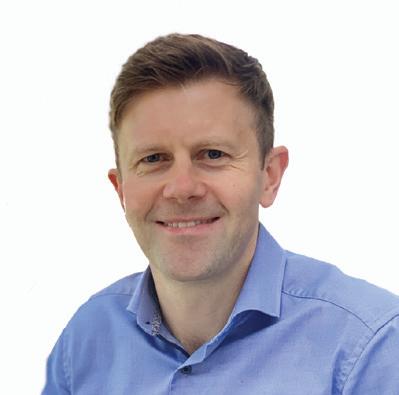
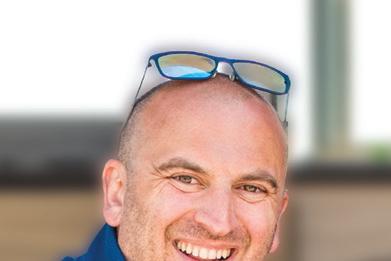
A good accountant will add value to your business and help to ensure you’re fully compliant. It can be tempting to try lots of things yourself at the start to keep costs down, however you don’t want to spread yourself too thin. Your main focus should be on your customers, so it’s best to outsource. Tap into your network for recommendations.
Pubs
Malachy Duggan Galway Pub Owner and Author

Try everything. If it works, do it again, with a twist. If it doesn’t, go back to it when the time is right. Know how to do everything in the job but make sure you are not the only one who can do it. Find the craic; it makes everything easier.
6
 Marian O’Gorman Champion Green Founder & Kilkenny Design Chairperson
Marian O’Gorman Champion Green Founder & Kilkenny Design Chairperson
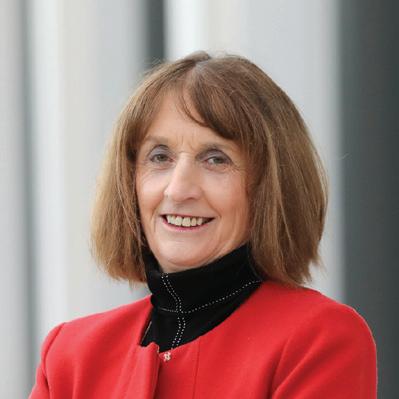
Connect with local business networks and advisors as much as possible. When you’re working hard in a business it may seem like extra work but the people you meet and the things you hear can make all the di erence. Even those few hours out of the business help clear your head of the daily minutiae that can block out the bigger picture.
If you are a business leader and you feel you have some words of wisdom to share with he small business community please email info@sfa.ie
SFA | BETTER BUSINESS Wise Guys Advice 21
Compliance
Retail
“If I was going to have the types of opportunities I felt I deserved, and continue to have them, I was going to have to start creating those opportunities for myself”
Lance Reddick Actor, 1962-2023
TheNational Standards Authority of Ireland (NSAI) was set up to help Irish businesses grow, develop and advance not just at home, but internationally. By providing companies with world-class standards, certification and measurement expertise, NSAI has been facilitating trade and supporting sustainable economic growth in Ireland for over 25 years. Last year, the Authority, which is under the aegis of the Department of Enterprise, Trade and Employment, launched its Strategic Plan 2022-2026, a framework that’s very much focused around small business and knowledge transfer. That ‘knowledge’ piece is intrinsic to NSAI; hugely knowledgeable teams of engineers, scientists and doctors in both the organisation and its networks are working to support clients across a range of sectors. The core pillars of the new Strategic Plan are around supporting and enhancing services to small firms across four key areas of the economy, says NSAI Chief Executive Officer, Geraldine Larkin. “Those four areas are digital, climate, medtech and housing. With the Strategic Plan, we want to build and enhance the services that we offer in each of those areas and really develop the internal capacities to drive that growth forward.”
The‘Housing for All’, the Government’s multibillion euro plan to improve Ireland’s housing system, aims to build 300,000 new homes by the end of 2030. NSAI has a key role to play when it comes to delivering that ambitious target. “One of the most important things we’re doing at the moment is certifying new types of construction methodologies and techniques. Recently we launched a certification for modern methods of construction which ensures that new types of construction methods that are coming onto the market are safe, reliable, meet industry standards and are built in accordance with building regulations.” On an ongoing basis, NSAI is creating standards to support Ireland’s evolving construction industry. Standards on best practice when it comes to retrofitting houses and standards on universal design are also available from the organisation.

Setting Standard
22 SFA | BETTER BUSINESS Cover Story National Standards Authority of Ireland (NSAI)
THE NATIONAL STANDARDS AUTHORITY OF IRELAND IS HELPING SMALL BUSINESS COMPETE ON A WORLDWIDE STAGE. CEO GERALDINE LARKIN TELLS BETTER BUSINESS JUST HOW EASY THAT PROCESS IS.
Paul McCarthy
Geraldine Larkin , CEO, The National Standards Authority of Ireland (NSAI)
NSAI STANDARDS
NSAI develops and publishes standards to meet international demands for the quality, design, performance, safety, and environmental impact of products and services. Through its consultative committee network and Irish representation on international standard committees, the NSAI facilitates input from experts and interested parties into the development of standards as Ireland’s national member of international standards organisations.
Legal Metrology
Legal Metrology (LM) is NSAI’s regulatory function responsible for upholding and enforcing accuracy and transparency in trade measures. This is achieved by inspection and certification of measures and measuring equipment used for trade in accordance with the Metrology Acts of 1980 to 2017.

National Metrology Laboratory
The National Metrology Laboratory (NML) is Ireland’s national metrology institute and as such is the custodian of measurement in Ireland. Part of NML’s core responsibility lies in establishing, maintaining, and developing national standards for physical units, as well as disseminating them to Irish users, particularly those in the manufacturing and pharmaceutical industries.

CertificationMedical Devices
NSAI o ers a full range of services relating to management system standards and product certification for medical device manufacturers. NSAI’s designation to European Medical Device Regulation (MDR) is an essential service to both the national and international clients in the medtech sector while NSAI also recently achieved designation under the In Vitro Diagnostic Medical Devices Regulation (EU) 2017/746.
SFA | BETTER BUSINESS 23 National Standards Authority of Ireland (NSAI) Cover Story
“These standards benefit all stakeholders involved, from manufacturers and users to regulators and society as a whole.”
In the medtech space, NSAI and NSAI Inc, which is its wholly-owned US subsidiary, made great strides in providing companies with the resources to trade on a global stage. According to the Irish Times, Ireland is the largest employer of medtech professionals in Europe per capita. With approximately 450 medtech companies employing 45,000 people across the country, global exports have reached €13 billion. NSAI provides essential regulatory services that Irish medtech firms require when exporting to Europe and to other jurisdictions accepting the CE mark. “Just recently, we became one of 10 notified bodies in Europe that has achieved designation under In Vitro Diagnostic Regulations, which is quite an achievement as it’s such a technical certification. There’s never been a better time for Irish medtech firms to engage with regulation; critical deadlines within the EU regulatory framework have been extended and I see that as a fantastic opportunity for companies to get their products on the European market. If I had one message to medtech companies, it would be to avail of the services the NSAI provides and gain the advantage of time over your competitors.”
A series of standards on climate adaptation to help organisations of all sizes and types address the impacts of climate change are also available from NSAI and form a key element of the organisation’s Strategic Plan. They will, says Geraldine, help organisations embed climate adaptation into their processes and incorporate it into existing environmental management systems. Digital transformation and security are another key area where NSAI is helping small businesses to excel. Alongside providing access to certification schemes such as the ISO/IEC 27001 Information Security Management System, NSAI is taking steps to become a designated certification body under the Cybersecurity Act. “That legislation probably won’t be enacted until 2024, but we’re currently working on how we will deliver and implement that solution to small businesses.”
For small firms, availing of services from NSAI couldn’t be easier. In 2022, NSAI implemented a number of initiatives to ensure it’s easy for businesses and in particular, small businesses, to engage with the organisation. “User friendly tools on our website allow small firms to check how far along the certification journey they are, while video tutorials help to demystify the process. So many standards are a pathway for small firms to really grow and develop their business. At NSAI, our priority is small firms. We’re very much focused on engaging with small businesses and that’s
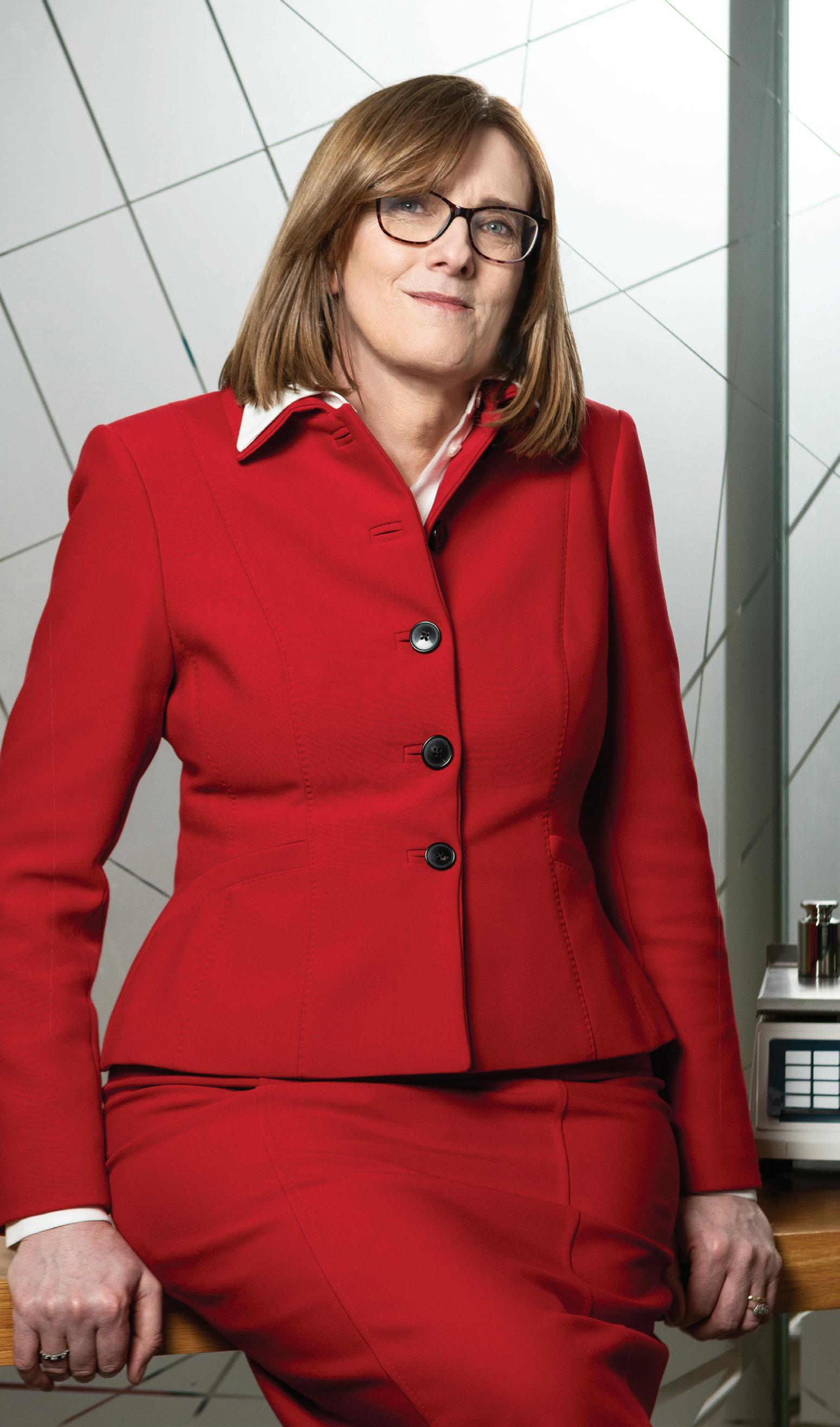
24 SFA | BETTER BUSINESS Cover Story National
of Ireland (NSAI)
Standards Authority
Geraldine Larkin , CEO, The National Standards Authority of Ireland (NSAI)
something that’s highlighted in our Strategic Plan.” Events around the country ensure small firms get the chance to engage with NSAI on a one-to-one basis.
“Quite often, we’ll hear from a company that had a really innovative idea but didn’t think to investigate best practice in that area and then encountered an issue around their product not being compliant with standards. Standards and certification are an international language. If a company has, for example, a quality management system standard or an innovation standard, that’s the same in Ireland as it is in Europe or across the globe. It’s international evidentiary proof of a product or service meeting best practice and that’s a very powerful thing. Once a small firm has that independent assessment of a product or service, it’ll carry them across the globe.”
To facilitate trade between Irish businesses and Great Britain, NSAI established NSAI Certification UK Ltd in 2021 to provide firms with access to UKCA product certification, initially for construction and medical device products. “We’re constantly looking at new ways to support small firms and make it easier for them to flourish and grow. For a small business, achieving certification is hugely beneficial but even if they opted to just pursue standards, they would still be ahead of the curve.” As our world becomes increasingly digital, one of the key advantages for a small business is interoperability. “When a firm develops a product, they want to be certain that product will work across different platforms. That’s where we come in.”
Since 2017, Geraldine has been at the helm of NSAI, helping small business optimise their value and trade on a global stage. “At NSAI, we all share the same belief that our work is for the betterment of Irish business. I’ve been very lucky throughout my career in that I’ve had the pleasure of working with people that really care about helping Irish businesses grow and thrive. I started my career as a civil servant in the Department of Justice and have held several roles, but I’ve always been surrounded by like-minded people that have put Irish business to the forefront.” For the rest of 2023 and beyond, the focus is on implementing the objectives set out in NSAI’s Strategic Plan 2022-2026. “Engaging with NSAI is a simple process which will help a small business develop and become more resilient. Our tagline is ‘Innovating to shape a safer, better, and sustainable future’. That’s what everyone at the NSAI will continue to work for.”
To nd out how NSAI can help your small business, visit NSAI.ie






CertificationSustainability and the Built Environment

NSAI’s Sustainability and the Built Environment division supports the construction and sustainability sector by providing certification under the Construction Products Regulation harmonised rules for the marketing of construction products in the EU.
Certification –Business Excellence
NSAI’s Business Excellence division focuses primarily on management system standards, which includes certification around Quality Management, Environmental Management, Occupational Health and Safety Management as well as Energy Management.
Certification –Market and Regulatory Support
NSAI is responsible for a range of automotive certification schemes which enhance the safety and environmental aspect of vehicles on the road in Ireland and Europe. It also approves test centres and authorised workshops for activities relating to tachograph, plating and road speed limiters.’
For the food and drink industry, NSAI o ers Food Safety System Certification 22000. This is a global food safety initiative, recognised and internationally-accepted as a food safety certification scheme.
NSAI Inc: U.S. & International Clients


NSAI Inc o ers a full range of management system standards and medical device certification schemes to both U.S .and international clients. NSAI is authorised for the Medical Device Single Audit Programme (MDSAP) and it provides access to R2 Responsible Recycling Management System Registration and Certification.
NSAI UK
Established in 2021, NSAI Certification UK was established to provide firms with access to UKCA product certification, which will initially be for construction and medical device products. It has successfully passed assessment audits for its work under the UKCA mark for Construction, Measuring Instruments and Non-Automatic Weighting Instruments.

SFA | BETTER BUSINESS 25 National
Authority of Ireland (NSAI) Cover Story
Standards
Paul McCarthy
“USER FRIENDLY TOOLS ON OUR WEBSITE ALLOW SMALL FIRMS TO CHECK HOW FAR ALONG THE CERTIFICATION JOURNEY THEY ARE.”
BETTER BUSINESS CHATS TO FOUR SMALL FIRMS WHO ARE MAKING LIFE THAT BIT EASIER FOR PARENTS









































































































































































Entrepreneurs Parenting Heroes 26 SFA | BETTER BUSINESS
Heroes
REGINA BUSHELL
“We have regular inspections from Tusla, the Department of Education, Pobal, the fire department etc. We’re always prepared for those inspections and we ensure we’re always compliant with all regulations. I think quite a few providers in the industry believe there are too many inspections; we absolutely need them but they should be condensed in some way.” While the National Childcare Scheme has been extremely positive for parents, many are unsure as to what their entitlements are under the scheme. “I would encourage parents to go onto gov.ie and register. It’s a simple process and well worth it, as all parents are entitled to some kind of reduction. The government has made great strides in terms of childcare in this country. There’s still work to be done, particularly around child minders, but the changes that have been made are positive.”
years ago, Regina Bushell decided to set up a day care facility in her hometown of Athlone. It was, she says, a good time to make the transition from providing Montessori services in her own home to purchasing and converting a bespoke daycare premises. “The Marriage Bar had been lifted and women were increasingly looking for childcare options that would allow them to go back to work. I launched Grovelands Childcare in 1992 and since then, I’ve designed and purpose-built five more centres in Athlone, Mullingar and Tullamore.” Today, Regina employs 130 staff members who take care of 700 children every day. Implementing a governance led structure from day one has contributed to the success of the business.

Finding and retaining staff is Regina’s single biggest issue at the moment. “When we do manage to find staff, we can’t source accommodation for them. The current pay freeze, which prevents us from increasing our fees, is exacerbating the situation. When we agreed to the pay freeze, we didn’t have the war in Ukraine and costs hadn’t yet skyrocketed. I predict a great deal of negotiation over fee increases next year. Too many people are struggling with the cost of service.”
Establishing more centres isn’t off the cards but getting the location right is crucial. “New centres must be both sustainable and profitable. There’s no point in investing a couple of million into a new centre and then finding that the demand isn’t there. We’re constantly evolving so new centres may be on the horizon, but we’re in no hurry. I’m in the lucky position that my daughter is running the business with me so she’ll take over when I eventually retire, which won’t be for a while yet!
SFA | BETTER BUSINESS Parenting Heroes Entrepreneurs 27
“NEW CENTRES MUST BE BOTH SUSTAINABLE AND PROFITABLE. THERE’S NO POINT IN INVESTING A COUPLE OF MILLION INTO A NEW CENTRE AND THEN FINDING THAT THE DEMAND ISN’T THERE.”
JENNY DIAMOND
“Astrid has a lot of experience in project management and HR so we felt the three of us were well placed to start the business. It grew very quickly and today, we offer a more rounded service. Not only do we offer a complete payroll service but we also provide clients with employment contracts and we’re there to give them help and advice when they need it.”







Having a nanny/minder coming into your home is quite different to a more straightforward employer/employee relationship. “It’s so much more personal, but I think that makes it all the more important to ensure all the formalities are in place. We also offer a Garda vetting service, which ensures the children are properly safeguarded. Clients often tell us our service allows them to come home from work and focus on the children, rather than trying to figure out their nanny’s payroll.”
In 2019, Revenue declared that if you hire any kind of home help, you must register online as an employer and submit weekly or monthly returns on your employee’s behalf. That change placed a massive burden on parents, says Jenny.
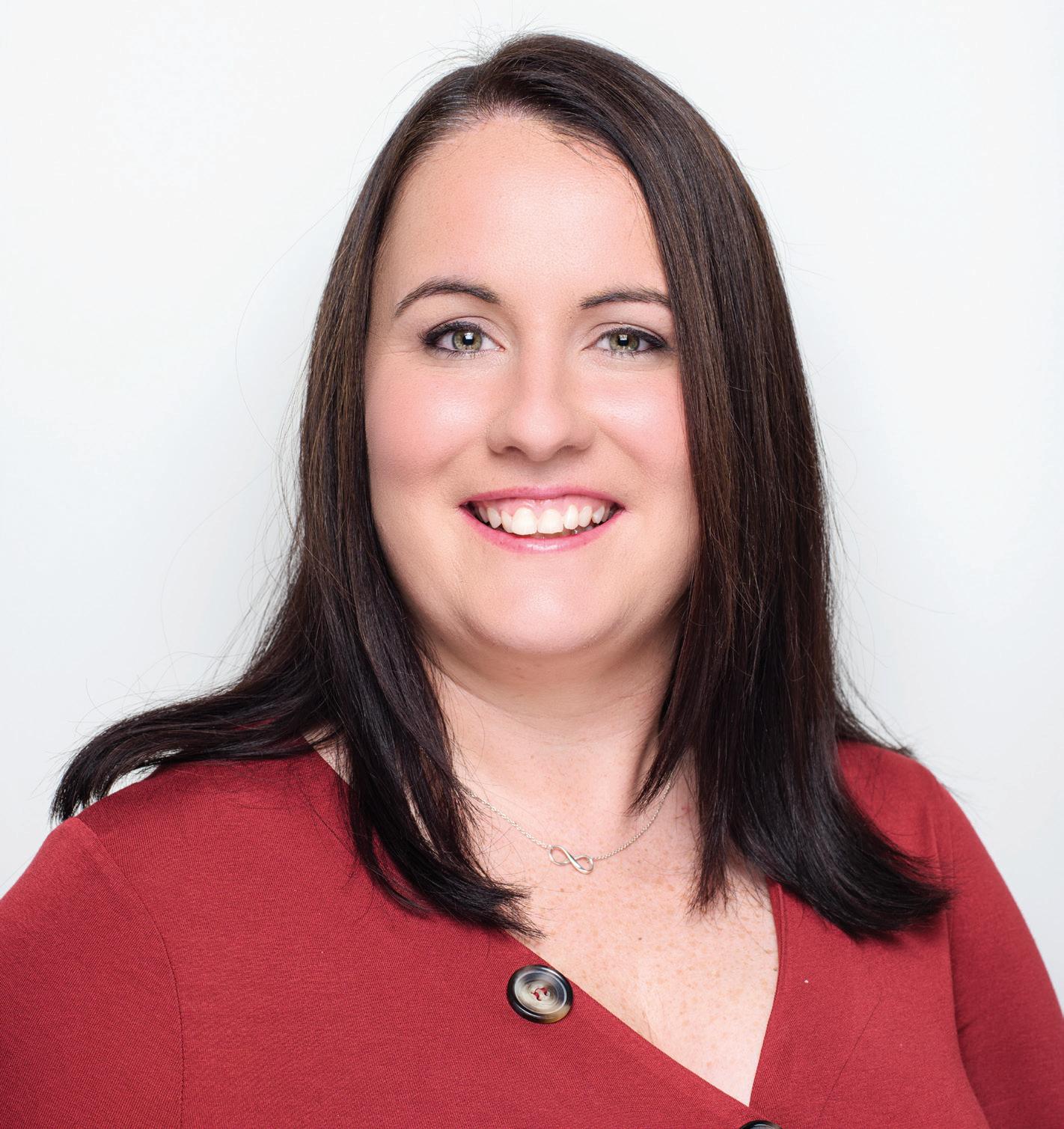
along with HR advice to families who employ a nanny or a minder in their home. “People are so busy these days, trying to juggle work and childcare. That’s actually how the business started. My brother and his wife, both engineers and both short on time, asked me for help in sorting out the payroll for their nanny as I have a background in accountancy. I had the idea that maybe this could be a viable business and it just went from there.”
Jenny partnered with Fiona Chandler, a childhood friend and a tax manager by profession and her sister Astrid Hamilton.

“We aim to take away that burden. I think it’s also important to remember that there is a childcare crisis in Ireland at the moment. Parents can’t secure creche places. The most affordable method of childcare is having a minder and it’s also so nice to have your children looked after in their own home. There’s peace of mind knowing where they are.”
Nanny Payroll has continued to grow year on year; for the trio, 2023 is all about upping their game around digital marketing and launching Minder Finder. “That’s going to be a new branch of the company focused on actually finding minders for parents. We’re putting systems in place for that at the moment and we hope to launch early next year.”
Entrepreneurs Parenting Heroes 28 SFA | BETTER BUSINESS
Nanny Payroll Ireland o ers a complete payroll service
“WE AIM TO TAKE AWAY THAT BURDEN. I THINK IT’S ALSO IMPORTANT TO REMEMBER THAT THERE IS A CHILDCARE CRISIS IN IRELAND AT THE MOMENT.”
ERICA HARGADEN
ERICA HARGADEN WAS INSPIRED TO SET UP BABOGUE AFTER A FEW TOO MANY SLEEPLESS NIGHTS.

A mother of three, she struggled with her first child’s sleep pattern, more often than not getting up with her baby 12 times a night. “I know the impact that sleep deprivation can have on a parent, it can really drive you to the brink. I began to educate myself around sleep – I read every article and book and magazine that I could find. This was before smart phones, we’re talking dial-up internet. I went on to have two more children and I used that information to help me when it came to their sleep. Both of them slept through the night quite early, at six weeks and at eight weeks.” Amongst her friends and work colleagues, Erica became known as the person to talk to when your baby won’t sleep. “Someone jokingly said to me one day, Erica you should be doing this for a living. That’s when the lightbulb went on.”
After studying at the Family Sleep Institute, Erica became a certified child sleep consultant. Babogue was set up in 2017, providing parents with the tools they need to understand their children’s sleep and empower them to create settled sleep in their homes. In 2019, Erica decided to change tack slightly. “Within six months of starting the business, I was completely booked up. I couldn’t take on any more families and in terms of growth, it just wasn’t a viable business. In 2018, I released some video content on Instagram which was proving really popular. I was trying to figure out how to monetise that content and that’s when I had the idea for what’s now known as the Sleep Series.” The Sleep Series, a suite of video-based courses designed around Erica’s ‘7 Steps to Better Sleep’, provide parents with an on-demand method of getting to grips with their children’s sleep. Since


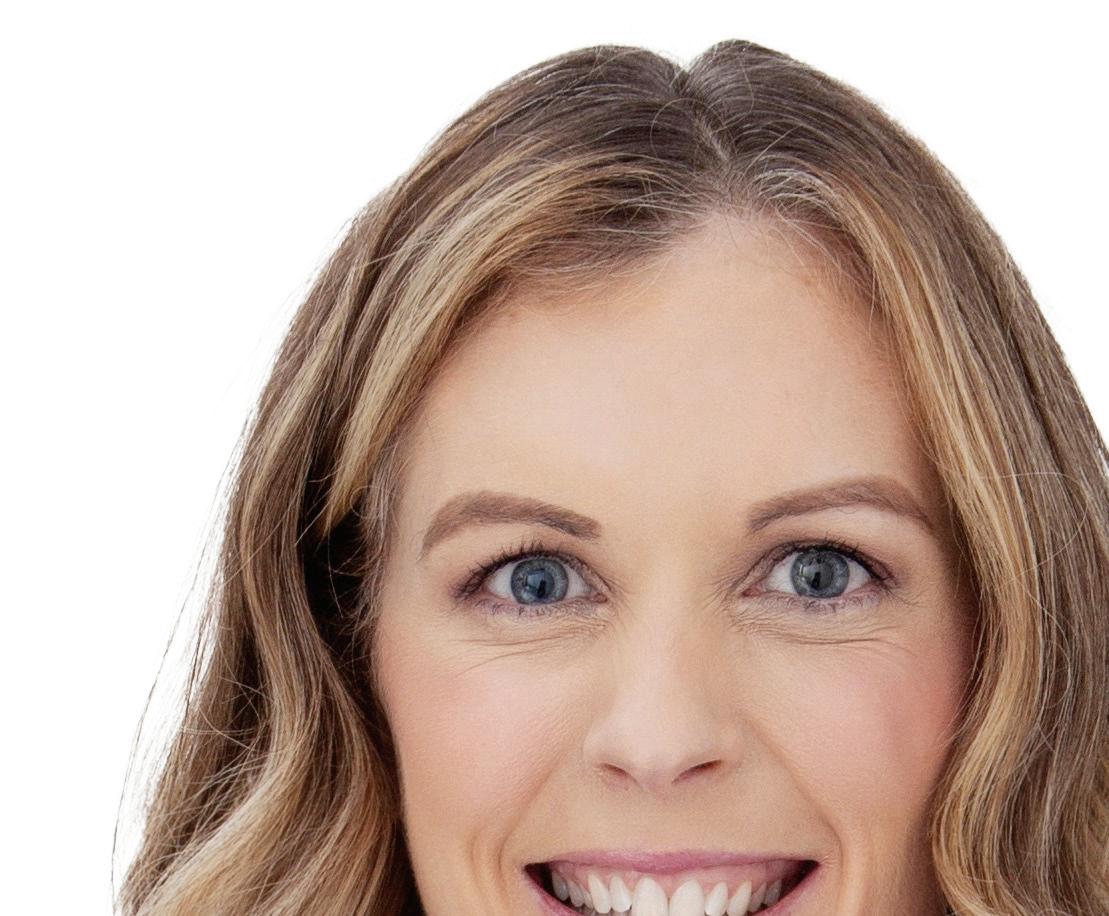
launching in 2019, over 4,500 families all over the world have used the series. During Covid, parents used the time at home as an opportunity to deal with sleep challenges they may have ignored previously, further driving sales. Babogue is currently working with Enterprise Ireland to expand the B2B side of the business. Erica and the team are also working with companies to help them support employees experiencing difficulties around their children’s sleep. “We’re looking at creating a more tailored online experience for our users, along with a really responsive app that will help parents while they’re working through those challenges.”
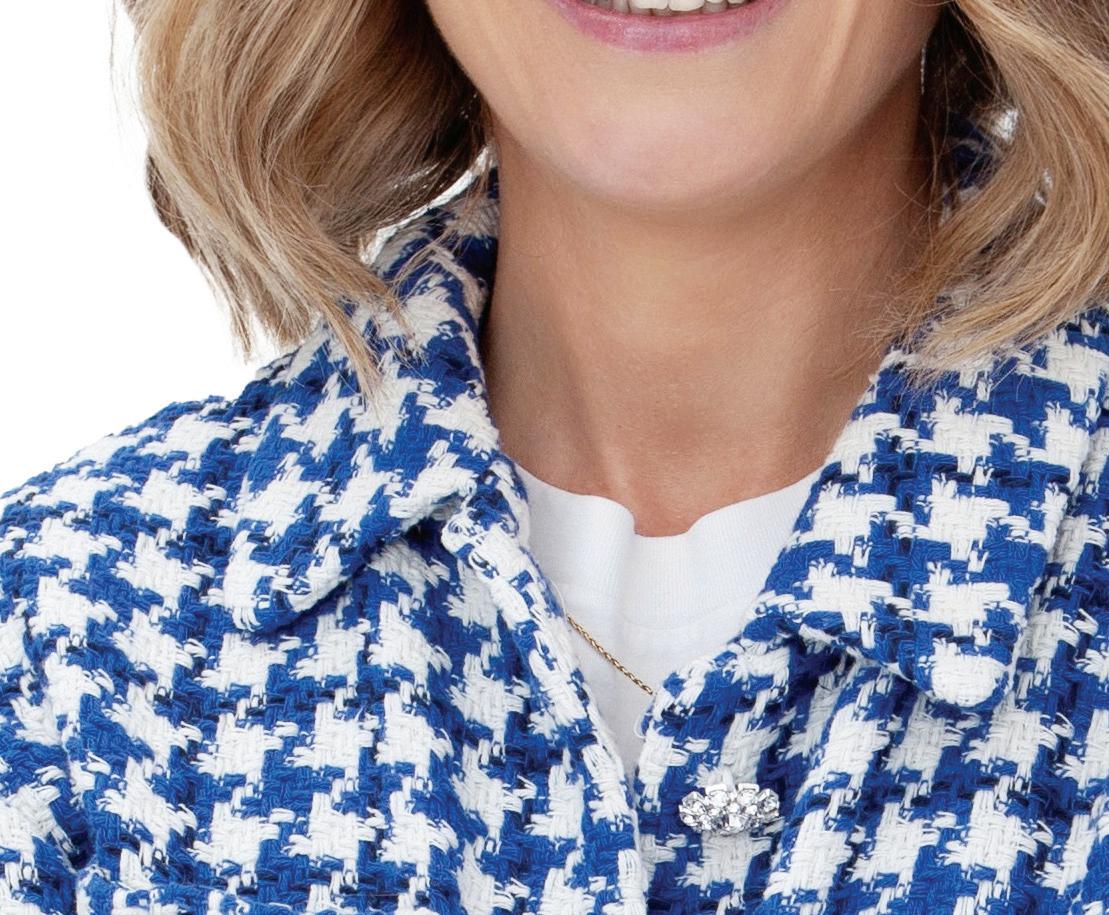
SFA | BETTER BUSINESS Parenting Heroes Entrepreneurs 29
“WE’RE LOOKING AT CREATING A MORE TAILORED ONLINE EXPERIENCE FOR OUR USERS, ALONG WITH A REALLY RESPONSIVE APP THAT WILL HELP PARENTS WHILE THEY’RE WORKING THROUGH THOSE CHALLENGES.”
KATIE BRANDON BYRNE
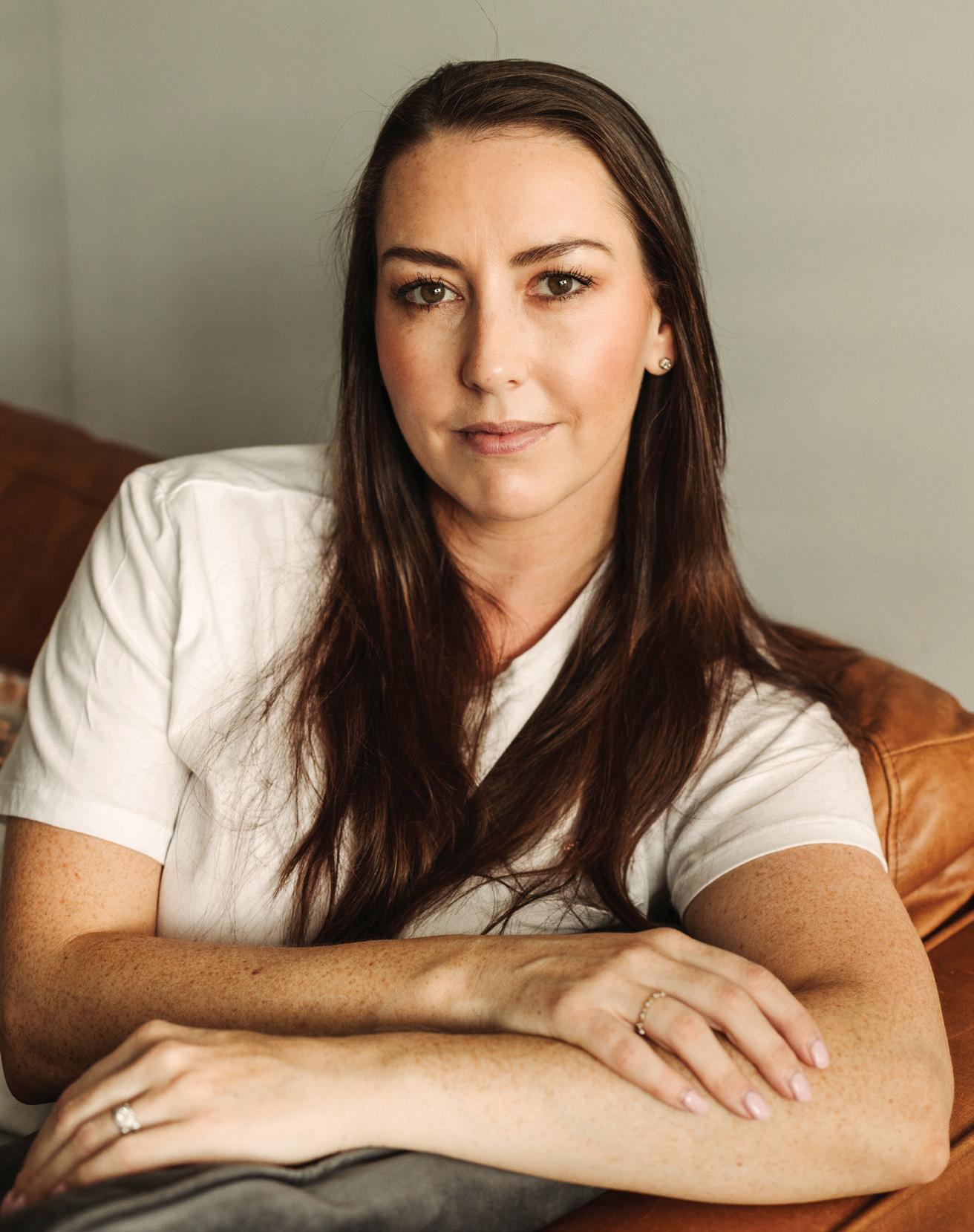
Alack of natural, organic babygros on the Irish market led Katie Brandon Byrne to set up Lil & Izzy in 2019. “My daughter Isabelle suffers very badly with eczema and allergies. When she was a baby, I found it really difficult to source products that wouldn’t irritate her skin. At night-time, she would scratch so badly that there would be blood on the sheet.” Katie’s background is in fashion design, buying and product development so she decided to create her own babygros to suit the particular needs of her daughter. “I had been buying babygros made from organic and sustainable materials from Australia and the US as I couldn’t get anything at home. It all started from there.”
Katie designs all the products in the Lil & Izzy range herself. Considerable thought has gone into the design of each and every item; babygros feature two way zippers and reinforced knee patches for crawling, everything is made from organic cotton and customers also have the option of having their baby’s name or initials embroidered on the clothing. Although the brand is performing well, Katie’s business plan hasn’t followed the trajectory she set out in 2019. Brexit made exporting to the UK very difficult, while UK customers are impacted by custom charges and long delays. “Brexit has been extremely challenging. We had great plans to export to the UK, but they had to be shelved. Our vision for the business has changed, we’ve had to pivot but I think we’ve proven ourselves to be adaptable in very difficult circumstances.” The Lil & Izzy brand is available online and also in boutiques around the country, including Avoca. Just recently, Katie converted what was her design studio in Bray into a physical store. “There was a demand for it. People were coming to the door and looking to buy the products, so we decided to take the leap.”
Plans are also in place to move the brand into boutiques across Europe. “That should have happened this year, but we’ve been faced with so many challenges that we decided to focus a little bit on our strategy and take our time. That move is scheduled for next year.” New products will launch on the Lil & Izzy website this year and the plan is to further expand the brand’s presence in Ireland and eventually, abroad. “We don’t want to oversaturate the market. We’re very strict when it comes to the stores we supply to; Lil & Izzy is very much a unique, special brand and we aim to keep it that way.”
Entrepreneurs Parenting Heroes 30 SFA | BETTER BUSINESS
“WE DON’T WANT TO OVERSATURATE THE MARKET. WE’RE VERY STRICT WHEN IT COMES TO THE STORES WE SUPPLY TO; LIL & IZZY IS VERY MUCH A UNIQUE, SPECIAL BRAND AND WE AIM TO KEEP IT THAT WAY.”
Pat McDonagh, Owner Supermac’s, Trócaire Supporter.



























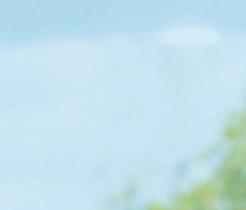

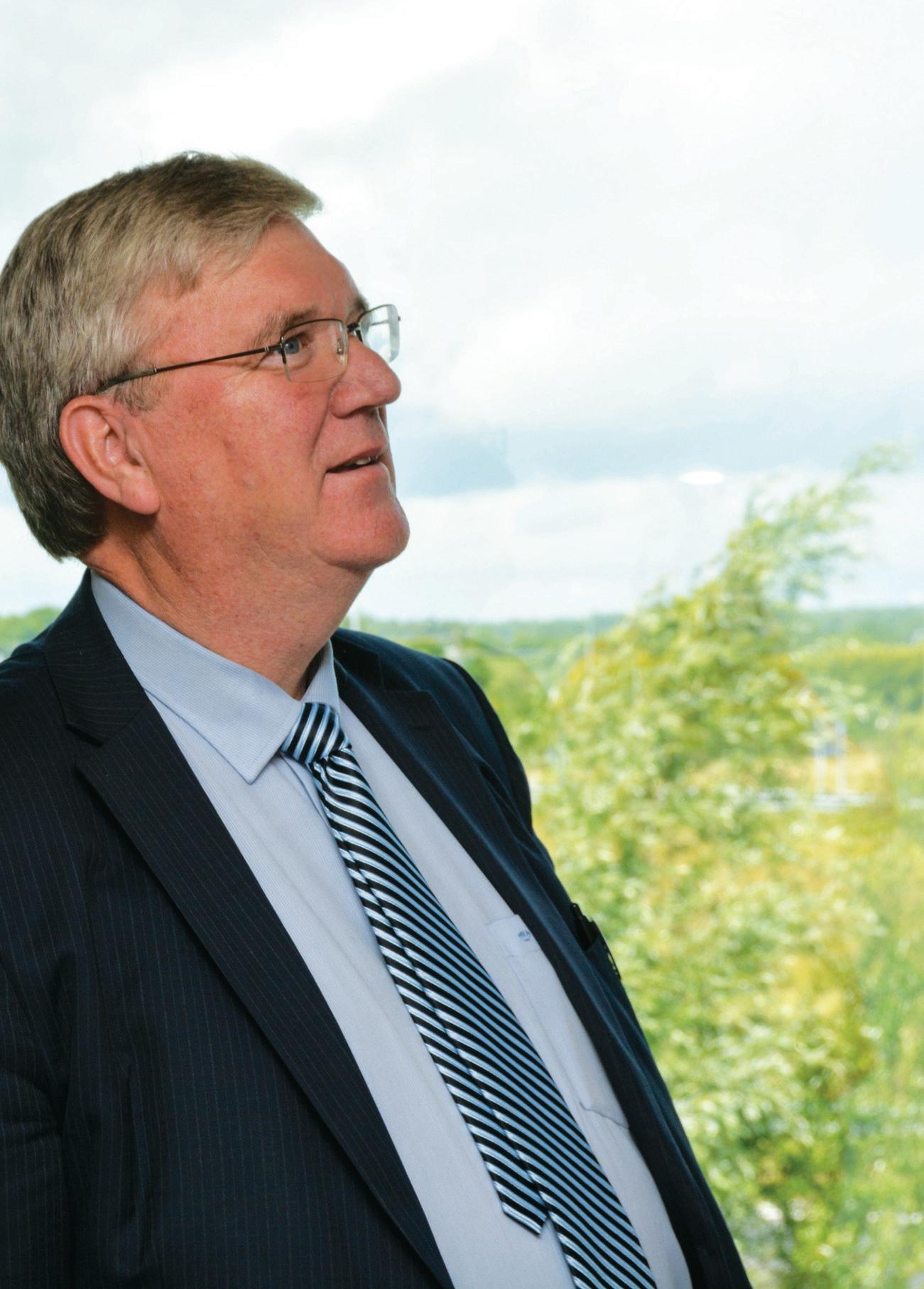
Find out what your business can do by partnering with Trócaire: Please contact us on 00 353 1 629 3333 or visit trocaire.org Trócaire Head Office, Maynooth, Co. Kildare, Ireland Irish Charity No. CHY 5883
“ my business has helped children go to school and provided water to vulnerable villages in zimbabwe my business has helped children go to school and provided water to vulnerable villages in zimbabwe “

45 MAGAZINE TITLES 10 EVENTS 3.6 MILLION REACH ▲ ▲ DID YOU KNOW Ashville Media Group is Ireland’s largest publishing and events company. You’ve almost certainly read our magazines or attended our events. Our mission is to connect your brand with the largest audience in Ireland. (01) 432 2200 ▲ www.ashville.com
Niamh Davenport, Head of Financial Crime, Banking & Payments Federation Ireland (BPFI)
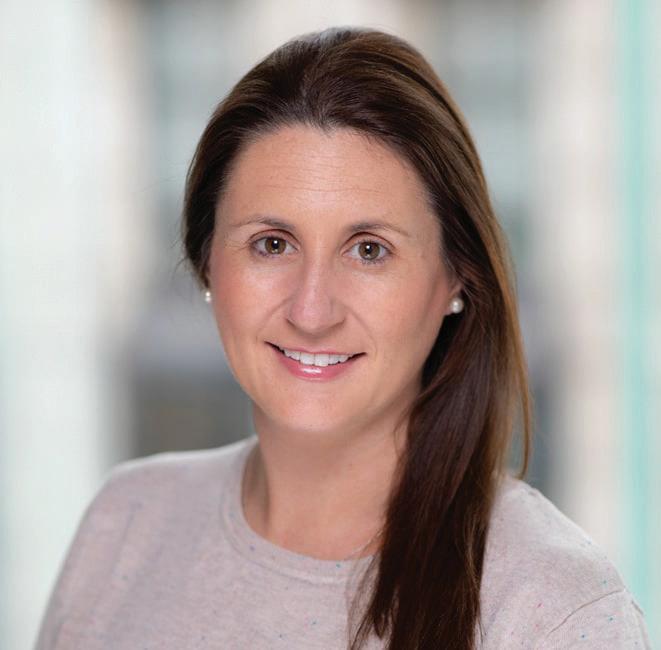
Is your business FraudSMART?
SMES MUST BE ALERT TO FINANCIAL SCAMS, ESPECIALLY WITH RECENT CHANGES TO HYBRID AND WORK FROM HOME PRACTICES, WRITES NIAMH DAVENPORT
Most businesses would like to think they are protected against fraud but unfortunately, SMEs continue to be a key target of scams. The Covid-19 pandemic forced businesses to adopt a hybrid work model under pressurised circumstances, which has added another layer of risk. For many, the speed of change to work from home practices didn’t allow time to put in place sufficient precautions and processes, training for staff or appropriate and robust security systems suitable for remote work.
Over the past 24 months, FraudSMART members have seen an increase in CEO fraud in particular. A fraudster will either hack into the legitimate email of a CEO or senior executive or fake the email address, commonly sending an email to an employee who deals with payments. The fraudster will then generally take an opportune moment when they know the CEO is away or on annual leave to send an email requesting that the employee pay a ‘supplier’ through a bank account listed in the email.
It is often difficult for an employee to identify the fraud, so it is important for businesses to be on the alert. Review your business security measures and take proactive steps to protect against scams. Businesses should prioritise educating employees on best practices, staying up to date on current threats and ensure that technology is secure.
ADVICE
FOR
1. Secure your devices with up-to-date antivirus software, firewalls and encryption
2. Establish clear policies and procedures on how to handle sensitive information and financial transactions
3. Use two factor authentication (2FA), which means you will need to enter a code sent to your phone or email in addition to your password to access your work accounts
4. Limit access to sensitive information to only those who need it to do their jobs
5. Conduct background checks prior to hiring new staff
6. Ensure staff are given appropriate training on cyber security with a focus on phishing emails
7. Don’t allow staff to bring physical files from office to home
1. Keep your home Wi-Fi network, work laptop and smartphone secure by setting strong passwords
2. Avoid using public Wi-Fi networks to connect to work devices
3. Keep your work area secure; don’t have passwords taped on the wall and lock your computer when you are away from your desk
4. Stay up to date on company policies including data security, remote work and fraud prevention
5. If you receive an unusual email from a senior member of your organisation, contact them using a known email or phone number. Do not reply to the email or use contact details in the mail
SFA | BETTER BUSINESS Networking Tips 33
EMPLOYERS
FOR FURTHER TIPS: Log onto www.fraudsmart.ie and sign up to receive the latest fraud alerts at www.fraudsmart.ie/alerts EMPLOYEES
ADVICE FOR
Pushing change for
Towards the end of 2022 Geraldine Magnier, Director and Co-Founder of Idiro Analytics, was named the new Chair of the Small Firms Association. It’s a big role and one that comes with several responsibilities – to aid the council in implementing the SFA strategy 2022-2025 “Small Business: Ireland’s Future”; to work with Government and other stakeholders on the delivery of the new Department of Enterprise, Trade and Employment’s White Paper on Enterprise; and to appropriate policy for small rms and family businesses. Having served two terms on the SFA National Council and held the role of Vice Chairwoman for the council in 2021, the Carrick-onSuir native is well up to the job. “In Ireland, 98.4% of private companies are small and micro businesses.

ose businesses employ nearly half of the private sector workforce in Ireland, which is an astonishing gure. ese are the people that I aspire to serve – the people that get up each day to run a business that creates employment and vibrancy in cities, towns and villages across the country.”
Idiro Analytics, an AI company and pioneer in advanced analytics, was set up 18 years ago.
Geraldine knows rst-hand the value that small rms can derive from digitalisation. “In my tenure as Chair, I’d love to see all small businesses digitalised. For those already on the journey, I would strongly encourage them to continue their digital transformation to remain competitive. AI and big data shouldn’t just be for large businesses. Information is power and to remain competitive in the uncertain climate we nd ourselves in, small businesses need to equip themselves with all the resources they can.” In Ireland there’s still a digital divide, where 90% of Irish customers are online but almost half of those customers don’t have a website. “ at translates into a lot of lost opportunities for small businesses to optimise and leverage a thriving online customer base.” In addition, market research that’s already available in open source should be more easily accessible and centralised in its availability, says Geraldine. “ at would help small businesses to better understand their customer and predict their needs so that they can be proactive rather than reactive in customer relationships.”
As Chair, Geraldine is keen to bring small businesses into the ESG conversation. Every day, small rms across the country support local initiatives such
Interview Geraldine Magnier 34 SFA | BETTER BUSINESS
THE SFA’S NEW CHAIR TALKS TO BETTER BUSINESS ABOUT THE CHALLENGES FACING SMALL FIRMS AND HOW SHE HOPES TO EFFECT CHANGE
as sports and fundraising events – that support needs to be acknowledged as their part in the ‘S’ of ESG. “As the saying goes, what gets measured gets done. But what gets done doesn’t always get acknowledged and that’s very much the case with the contribution that small businesses make to the fabric of life socially across our island.”













e cost of doing business is front and centre for all small rms operating in Ireland. Government investment is key says Geraldine, as is improving initiatives around talent acquisition. Helping rms become future-ready is also on the agenda, through training and leadership, digital readiness and nancial management. When it comes to e-tenders, there’s light at the end of the tunnel for small businesses. “We have been heard by the Department of Expenditure and Reform who now understand the need to make the public tendering process for small businesses more friendly. We look forward to a new platform coming soon.”
e SFA is also actively working to make small businesses part of the solution to climate change. “As a community, we very much want to embrace the transition to a low carbon economy. We can only do that if Government and state agencies put in place supports to level the playing eld and help small rms make the transition.”













































Since Covid, the business landscape has changed enormously. Supply chain challenges, rising energy costs and general in ation are putting pressure on the employer, who is o en unable to pass on rising costs to the customer. “ is makes margins slimmer and tighter. Government legislation, such as auto-enrolment where businesses will have to pay into pension schemes for their employees, is also having an impact, as will mandatory sick pay. ese measures have made doing business more expensive and time consuming for small rms. Staggering these initiatives would lessen the burden on companies already trying to cope with additional admin.”


































































As SFA Chair, Geraldine is working to convince policymakers that a small business policy for Ireland is a must. Broader ambitions include creating awareness around the need for AI, transparency and explainability so as to eradicate bias in AI and allow for a more balanced and fair society and economy. “AI is fast coming down the track and we need users of this technology to be aware of how it works and its capabilities. is isn’t about futureproo ng for technological reasons; it’s futureproo ng for the next generation and for the fast-changing world we live in.”

SFA | BETTER BUSINESS Geraldine Magnier Interview 35
“IN IRELAND, 98.4% OF PRIVATE COMPANIES ARE SMALL AND MICRO BUSINESSES. THOSE BUSINESSES EMPLOY NEARLY HALF OF THE PRIVATE SECTOR WORKFORCE IN IRELAND, WHICH IS AN ASTONISHING FIGURE. THESE ARE THE PEOPLE THAT I ASPIRE TO SERVE – THE PEOPLE THAT GET UP EACH DAY TO RUN A BUSINESS THAT CREATES EMPLOYMENT AND VIBRANCY IN CITIES, TOWNS AND VILLAGES ACROSS THE COUNTRY.”
From tech to food
RUAIRI DOOLEY AND HIS SISTER NIAMH ARE ON A MISSION TO CHANGE HOW WE VIEW UPCYCLED INGREDIENTS
Have you ever wondered what happens to the grains that are used to make craft beer?
For most people, it’s probably not a question you’ll have asked yourself as you enjoy your favourite craft tipple. For food scientist Niamh Dooley and her brother Ruairi, it was a question that demanded an answer and one that’s led to a successful business venture that looks set to change how we view upcycled ingredients. In 2020, the Athlone natives launched BiaSol, a nutritious food additive made out of spent brewers grain that can be added to breads, pizza bases, soups and smoothies to add nutrition and a complexity of flavour. When they came up with the
idea for the business, Ruairi was living in Australia and Niamh was at home in Ireland. “We thought we’d pool our resources and try and come up with an idea for a food business. We wanted to create a food product that would address people’s nutritional needs while also reusing food and drink byproducts. We started looking into grain and after a lot of research, we found that a large amount of protein and fibre are left in grains once they’re spent.” Ruairi was working in IT and Niamh had been working with Bord Bia on a healthy eating programme for primary schools but
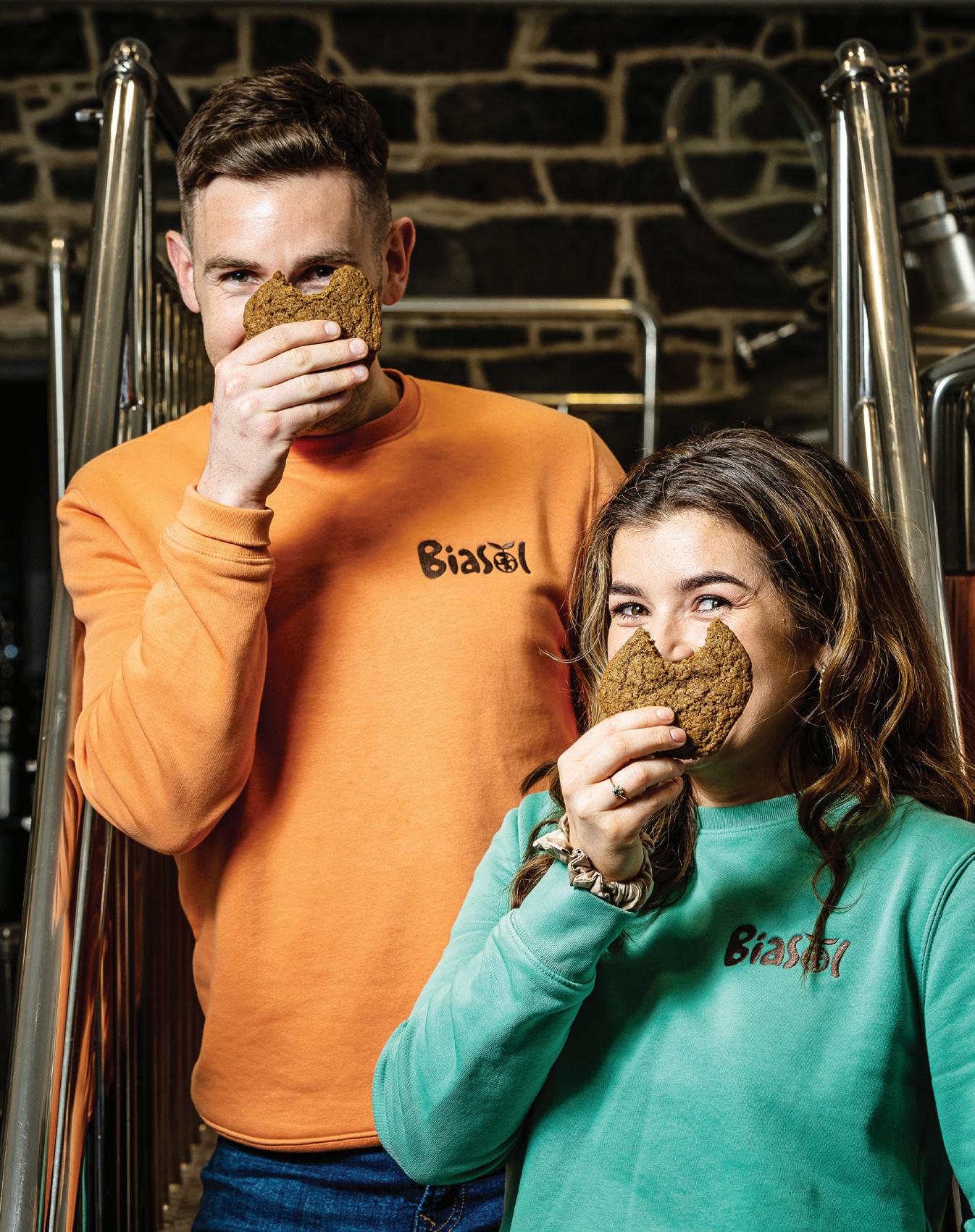
Career Change BiaSol 36 SFA | BETTER BUSINESS
Ruairi and Niamh Dooley
once Covid hit, she was let go. “Once we realised that there was real potential in our idea, I had to decide if leaving Australia was worth it or not,” said Ruairi. When the pair were awarded €50,000 from Enterprise Ireland from its Competitive Start Fund, the decision was made. “I came back and we moved into a manufacturing facility in Tullamore.” In the past couple of years, the brand has expanded to include ‘Crafty Cookie Mix’, ‘Granny’s Soda Bread Mix’ and ‘Super Scone Mix’. Business is good and today, BiaSol is stocked in 150 stores nationwide and used by restaurants around the country. “We’re also an official supplier to the IRFU, so teams competing in the Six Nations would have been fed with it!”
BiaSol works with four craft breweries including Galway Bay Brewery, Carlow Brewing Company, Dead Centre Brewing and Ballykilcavan Farm and Brewery. Sustainability is very much at the heart of the business. “We want to continue upcycling as much spent grain in Ireland that we can. Instead of grain being used as livestock feed or going into the ground as waste, we’re putting it back into the human food chain so everyone can benefit from it.”
Before setting up BiaSol with food scientist sister Niamh, Ruairi’s career was on a very different trajectory. “I studied accounting and finance in DCU and then began consulting for a company involved in finance and technology. I began branching more into the tech side and for about five years before setting up BiaSol, I worked in IT project management. So, I moved from tech to food, which was a huge step but a very satisfying one!” Niamh’s food science knowledge combined with Ruairi’s business know-how has made for a good team. “Before we launched the brand, we had no real clue how it would go. We hoped the concept would catch and luckily it has. Without Niamh’s knowledge, we certainly wouldn’t be where we are today.” To up her business acumen, Niamh also participated in the Department of Agriculture, Food and the Marine’s six-month ACORNS (Accelerating the Creation of Rural Nascent Start-Ups) programme.
In the past few months, the pair have gone a step further and launched the Circular Food Co (CFCO), a food business that specialises in upcycling plantbased food. As the wholesale division of BiaSol, it made sense to split the business in two, says Ruairi. “With the BiaSol brand and now with CFCO, we’re targeting two completely different markets. Now, we have a recognised brand that sits on the retail side and a separate brand that appeals to larger food brands.” From the outset, even before BiaSol launched, the pair had a very clear mission – to reduce food waste in Ireland and turn surplus food streams into ingredients again. “When we embarked on this mission, we started by bringing that concept to the end consumer with BiaSol, which is very much a product for the retail consumer. Our overarching
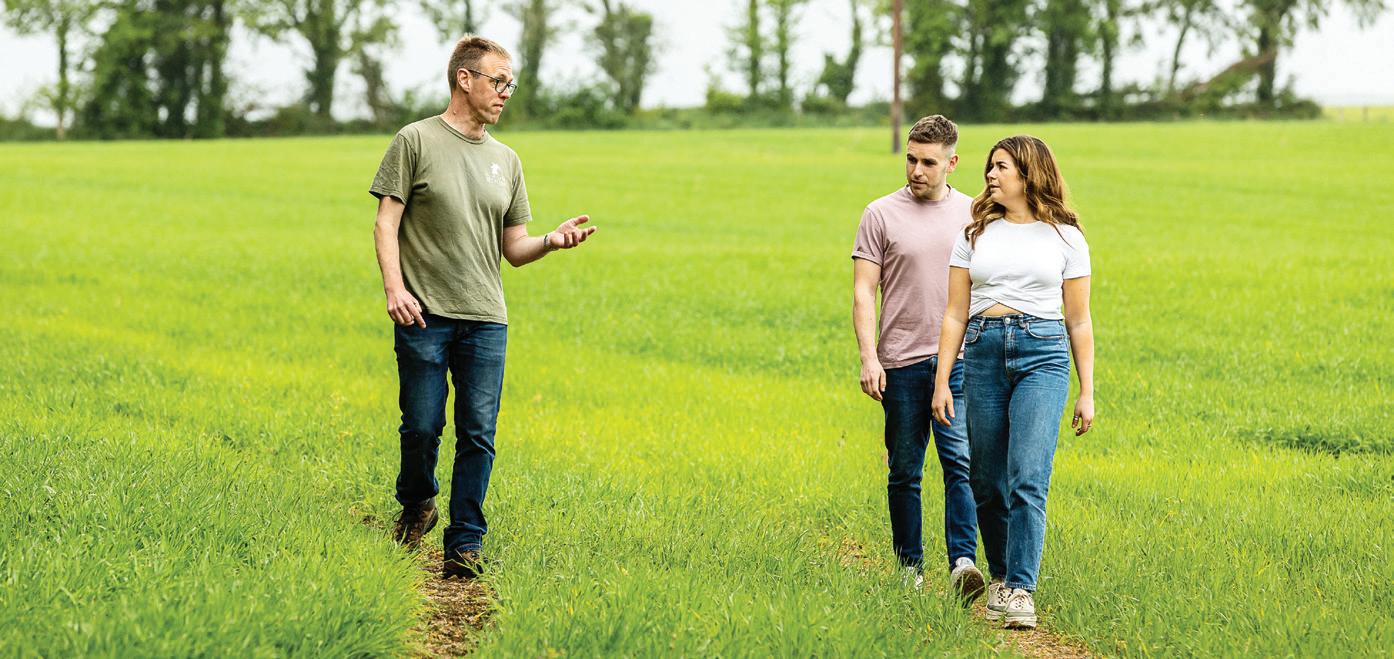
mission is to have a bigger impact and to encourage other food brands to get involved in the upcycle journey.” The initial target market is bakeries, although requests have been coming in from meat producers, biscuit companies, snack foods and health foods. “These food companies are interested in either creating a new product based around our upcycled ingredients or uplifting an existing product by using an upcycled ingredient.” So far, Ruairi and Niamh have created a range of natural upcycled functional foods that includes Fibr-Up, an ingredient that can boost fibre claims, Colr-Up which can help transform or enhance the colour of a finished product and Flavr-Up, an ingredient that can bring a range of flavours to a finished product, from sweet to rich malt. The range can, says Ruairi, help companies to improve the nutritional claims of their food products, enhance flavour, enhance or add natural colours and speed up fermentation. Our vision, says Ruairi, is a zero-waste world. “Creating ingredients from excess food is our way to help address climate change. Our plant-based portfolio is high in fibre, protein, vitamins, minerals along with phenolics, prebiotics and antioxidants. Engaging with CFCO is also a great way of supporting Irish business; you’re not only supporting us, but you’re also supporting the local producers where we source our foods.”
With BiaSol stocked across the country and CFCO beginning to make a name for itself, the future is looking bright for the pair. An initial seed round is closing soon, which will push the business to the next level. As a High Potential Start Up (HPSU) with Enterprise Ireland, there’s also very real potential for overseas expansion. “For us, I think real success is getting our hands on ingredients outside of grains. Later in the year, we’re hoping to release new upcycled products that aren’t from breweries or distilleries, but are sourced from other food distributors such as fruit and veg companies. We want to expand our portfolio of upcycled ingredients so we’re busy doing trials on alternative ingredients at the moment. Watch this space!”
30% of all food produced globally goes to waste
Globally, upcycled foods is worth €40 billion with a 5% annual growth rate
SFA | BETTER BUSINESS BiaSol Career Change 37
60% of people want to buy more upcycled food products
95% of us want to do our part to reduce food waste
Over
David Walsh-Kemmis, Ballykilcavan Brewing Company with Niamh and Ruairi Dooley
RE-USE, REDUCE SINGLE-USE WASTE
CONSULTATION ON DRAFT REGULATIONS TO INTRODUCE AN ENVIRONMENTAL LEVY ON SINGLE-USE DISPOSABLE CUPS
The national Waste Action Plan for a Circular Economy sets out a Government commitment to introduce new environmental levies to encourage more responsible behaviour and phase out single-use products in the same way as they have done before through the Plastic Bag Levy.
The Minister of State for the Circular Economy plans to introduce an environmental levy on single-use cups for hot drinks to incentivise people to choose to re-use and to help reduce single-use waste. The levy will also encourage more people to think about other steps they can take in their daily lives to reduce waste and contribute to climate action.
The target date for the making of the levy regulations was December 2022. However, following representations by the Small Firms Association jointly with our colleagues in Ibec, the introduction was delayed until a public consultation was undertaken and the results reviewed.

THE NEW REGULATIONS PROPOSE:
Customers who purchase their hot drink in a singleuse disposable cup will be charged the levy at the point of sale. Customers who choose to purchase their hot drink in a reusable cup will not be charged the levy. Many have already made this switch and many cafes and shops have been incentivising the use of reusable cups by providing a discount when you bring your own cup
INFebruary, a SFA delegation met with the new Minister for Enterprise, Trade and Employment, Simon Coveney, T.D., and his officials. Headed by SFA Chair Geraldine Magnier, the delegation included SFA Director, David Broderick, SFA Public Affairs Lead, Elizabeth Bowen and Director of Childhood Services Ireland, Darragh Whelan.
The meeting, the first since the Minister was appointed last December, focused on a number of small business issues including:
Employment law
Rising regulatory burden
Town centre renewal
Housing
Access to talent
Sustainability and digital transition
The meeting was a great opportunity to raise the concerns of Ireland’s small business owners with the Minister and his Department officials. SFA looks forward to working with the new Minister through the Department’s Enterprise Forum, of which he is Chair.
The proposed levy will be charged at a flat rate of 20 cent, applicable to all single-use disposable cups containing a hot drink, including those described as compostable, biodegradable or recyclable. Compostable, biodegradable or recyclable cups are single-use and the overall aim is to move away from single use towards reuse. These cups do not minimise the use of resources and if not disposed of correctly, add to waste for disposal
The levy will be shown as a separate charge on the invoice/receipt
The proceeds from the levy will be ringfenced in a Circular Economy Fund for projects relating to environmental and climate action objectives and will be administered by the Department. The specific types of projects which can be funded through this Fund are set out in Section 8 of the Circular Economy Act
All businesses/traders who sell hot drinks in singleuse disposable cups will be required to register for the levy with the Collection Authority, when appointed. Guidance, like that provided for the plastic bag levy, will be made available to retailers in due course.
SFA Policy Cup Levy 38 SFA | BETTER BUSINESS
A DELEGATION FROM THE SFA MET WITH THE MINISTER FOR ENTERPRISE, TRADE AND EMPLOYMENT TO DISCUSS THE FUTURE OF SMALL FIRMS AND PROPOSED LEGISLATION
CONSULTATION RESPONSE
SFA, in partnership with a number of Ibec Trade Associations, responded to the public consultation in November to outline concerns from businesses in the retail, catering, hospitality and entertainment sectors about the introduction of a cup levy.
The SFA submission stated that Irish business is committed to its role in supporting the transition towards a Circular Economy. We support a collaborative approach between Government and all actors across the supply chain to ensure this is achieved in the most efficient way possible.
Given the strong signals from Government that further levies are likely to follow, SFA called for a clear framework for the introduction of such levies that respects a number of important general principles and is embedded during the development of this levy and carried through to any future levies.
EXEMPTIONS NEEDED:
An exemption for either or both of compostable and recyclable cups from the proposed levy, so that industry will be incentivised to transition to a more sustainable packaging model

Exemptions will be required in circumstances where either public safety and/or the health and safety of the consumer or service staff override the environmental objectives, for example:
▶ Cups used to serve hot beverages in transportation environments – onboard planes, trains, ferries, etc
▶ Hospitals and other medical, clinical and healthcare settings
▶ Certain events and/or venues and their environs where the use of reusable cups is not possible or feasible due to health and safety considerations, and where and when directed by An Garda Síochana for reasons of public safety or otherwise.
ADDITIONAL ISSUES RAISED:
The proposed levy must only be introduced as part of a strategic and comprehensive waste management plan, aligning all stages in the circular economy and all actors in the supply chain, supported by significant improvements in the collection and recycling infrastructure in Ireland. The levy must only be introduced after proper waste solutions, appropriate infrastructures and other necessary supports have been rolled out.
An implementation timeline that adequately prepares industry and consumers for the introduction of the proposed levy in detail is needed at least 12-18 months before it takes effect.
The submission also focused on areas such as the current cost environment for businesses and consumers, food safety considerations, general health and safety and operation complexity for small firms and by businesses in the night-time economy operating between 6pm to 6am.
SFA will continue to engage constructively with the Department of Environment, Climate and Communications to achieve successful outcomes that bring about the important environmental objectives of this initiative, while recognising the short and long term needs of small businesses in the impacted sectors.
For more information contact SFA Public Affairs Lead elizabeth.bowen@sfa.ie. Join the SFA to learn more about our lobbying activity
SFA | BETTER BUSINESS Cup Levy SFA Policy 39
“THE SFA SUBMISSION STATED THAT IRISH BUSINESS IS COMMITTED TO ITS ROLE IN SUPPORTING THE TRANSITION TOWARDS A CIRCULAR ECONOMY.”
Getting the balance right
e Work Life Balance and Miscellaneous Provisions Bill 2022 will introduce a range of measures to improve family-friendly work practices and support women in the workforce.
is Bill will give e ect to the EU Work Life Balance Directive, which was due to be transposed into Irish legislation by 2nd August 2022. While this deadline was missed, the Work Life Balance and Miscellaneous Provisions Bill 2022 (the WLB Bill) is expected to be enacted soon.
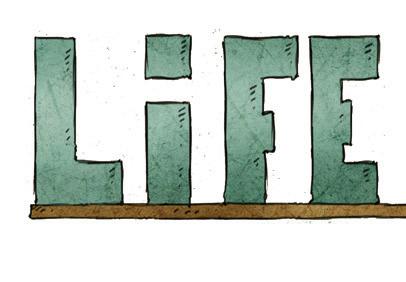
On 9th November 2022, the Government approved the integration of the Right to Request Remote Work for all employees into the WLB Bill. e Bill will also give parents and carers of children under 12 the right to request exible work. It will introduce ve days unpaid leave for medical care reasons and extend paid entitlement to breastfeeding breaks from six months to two years. In addition, the Bill will see the introduction of paid leave for victims of domestic violence.
KEY POINTS OF NOTE UNDER THIS BILL




Right to request remote working

Under the integrated Bill, remote working will be de ned as one type of exible working and all employees will have a right to request remote working. e right to request any other type of exible working, such as reduced working hours or adjusted working patterns, will remain limited to parents and carers, as de ned in the Bill. e fundamental di erences in the integrated Bill compared with the original Right to Request Remote Working Bill are in the grounds for refusal and the right to redress. e Right to Request Remote Working Bill provided for 13 speci c grounds upon which an employer could refuse a request, as well as a general “business grounds” provision. Under the integrated Bill, the speci ed grounds will be replaced by an obligation on the employer to consider both their needs and the needs of employees when considering a request. e WLB Bill removes the statutory requirement for an employer to have a remote working policy but provides that guidance will be set out in a Code of Practice.
A right to request flexible working arrangements for caring purposes, for parents and carers

Employees who have a child up to the age of 12 (or 16 if the child has a disability or long-term illness) and employees who are providing personal care or support to a family member or someone they live with, will have the right to request exible working arrangements for caring purposes for an agreed period. Flexible working arrangements have been referred to in the Bill as changing work arrangements, work patterns or hours of work. An employee must have six months continuous service before a period of exible working arrangements can commence and eight weeks’ notice of a request must be given to the employer. An employer must respond to such requests within four weeks of receipt and this time period may be extended by a further four weeks if the employer is having di culty assessing the viability of the request. An employer can postpone a request for exible working arrangements, but they must consult with the employee before postponing. e grounds for postponement are similar in nature to those that apply in the context of postponing parental leave.

SFA HR Work Life Balance 40 SFA | BETTER BUSINESS
DUE TO BE ENACTED SOON, IT’S TIME TO GET TO GRIPS WITH THE WORK LIFE BALANCE AND MISCELLANEOUS PROVISIONS BILL
A right to unpaid leave for medical care purposes, both for parents and carers
A new leave for medical care purposes is being introduced, whereby employees will be entitled to ve days unpaid leave per calendar year to provide care or support to a care recipient for serious medical reasons. Care recipient includes a family member or a person who lives in the same household as the employee. is entitlement is in addition to existing statutory entitlements to carer’s leave and force majeure leave. e leave can be fragmented, but not in periods of less than one day. No service requirement is required, nor prior notice is required. Employees will be required to con rm to their employer in writing, as soon as reasonably practicable, that they intend to take or have taken this leave. Employers may request ‘relevant evidence’ such as a medical cert con rming the need for signi cant care or support of a serious medical issue.
Paid domestic violence leave
e WLB Bill provides for the introduction of ve days paid domestic violence leave over a 12-month period.
Amendments to the Maternity Protection Acts



e WLB Bill will extend the period during which there is an entitlement to breastfeeding breaks from 26 weeks to 104 weeks. e Bill also provides for the extension of maternity leave entitlements to transgender men.
Managing employee absence
Return-to-work interviews can act as a deterrent to ongoing employee absence
Return-to-work interviews are a powerful control mechanism when dealing with employee absence. The interviews demonstrate the employer’s strong commitment to controlling absenteeism in the workplace. Putting a procedure in place to investigate and discuss absence with employees can serve as a deterrent to employees debating whether to take illegitimate sick leave. The manager should use the interview to explore any issues that the employee may have which are causing absences.
In summary, return-to-work interviews include:
One to one meeting with an employee’s manager/ supervisor – it’s an informal meeting and isn’t part of the disciplinary process
Purpose of the meeting is to understand reason/cause of the absence, document it and ascertain if there are any underlying problems
Brief the employee about the current situation, what tasks are now priorities, what work has already been carried out and where the employee should now focus his or her e orts
Review attendance record (if needed) and highlight high absence matters or patterns emerging i.e. reoccurring absence on a Monday/Friday etc
Review absence policy (if needs be), i.e., if the employee failed to adhere to the notification requirements
AGREE ON IMPROVEMENT IF REQUIRED.
Where there is a concern about the level or pattern of absence, this should be expressed to the employee. It is during this meeting employers should present the employee with their attendance record, outline their absences to date and explain the disruptiveness such absences have on the company. Where excessive absence is an ongoing issue, the company’s disciplinary procedure and its application to unacceptable absence should be explained to the employee.
e Work Life Balance and Miscellaneous
Provisions Bill 2022 is available to view on www.oireachtas.ie.
In summary, return-to-work interviews will not be successful unless they are consistent and fair. To this end, no exceptions can be made for any employee and all levels of management should be informed of the importance of having a consistent approach when managing such matters.
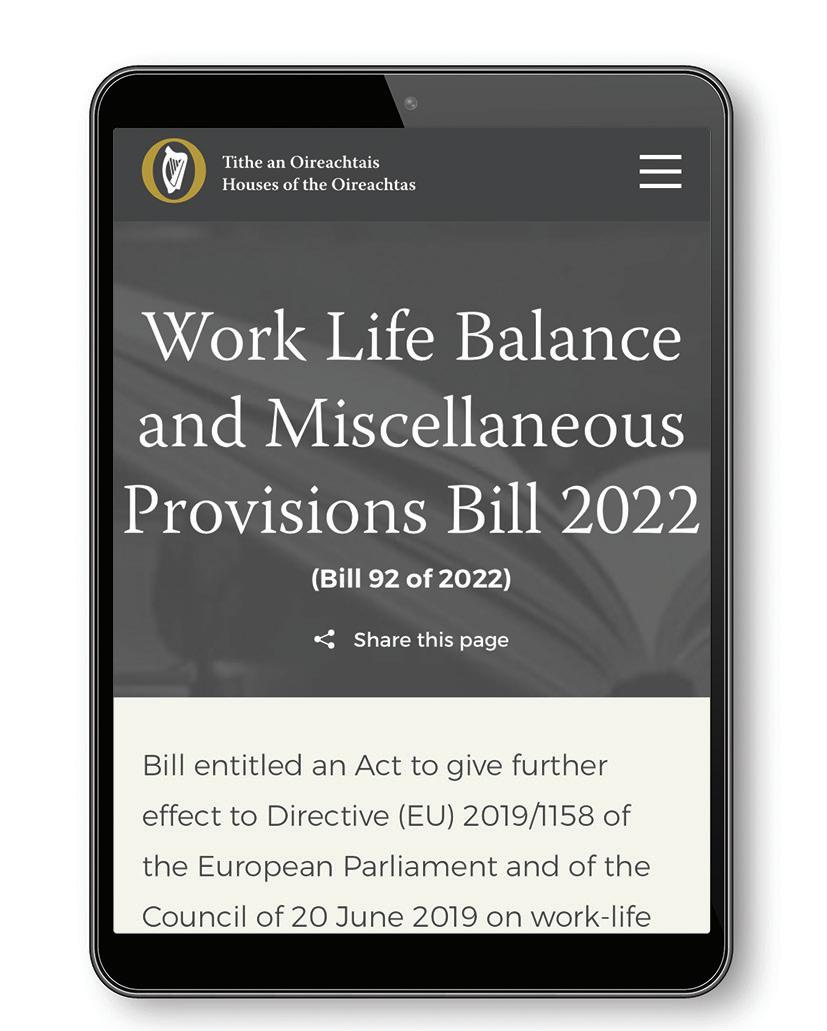
SFA | BETTER BUSINESS Employee Absence SFA HR 41












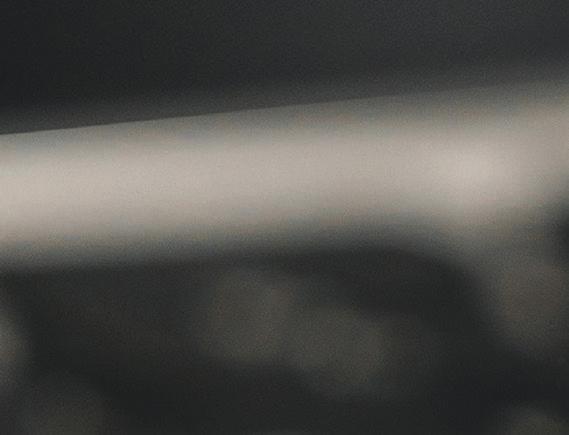








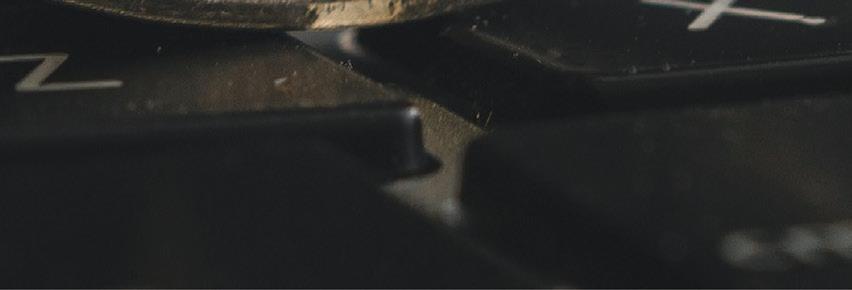
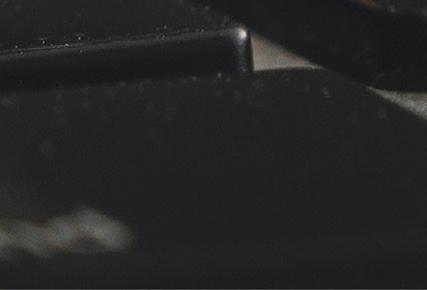









Visit our website and follow us on social media for information on: • your duties and obligations as a company director; • your rights as a company member/shareholder; • how to submit a complaint, expression of concern or protected disclosure to us; and • upcoming career opportunities with us. www.cea.gov.ie info@cea.gov.ie PROMOTING HIGH STANDARDS OF CORPORATE BEHAVIOUR THROUGH THE ENFORCEMENT OF COMPANY LAW
MSDs the risk of Reducing
EMPLOYERS CAN SAVE COSTS AND INCREASE PRODUCTIVITY BY CARRYING OUT HSA-APPROVED ERGONOMIC ASSESSMENTS




Musculoskeletal disorders (MSDs) remain the most common work-related health problem in Ireland, costing businesses thousands of euros each year due to higher levels of absence and reduced productivity. MSDs are impairments of bodily structures such as muscles, joints, tendons, ligaments, nerves, bones and the localised blood circulation system. If MSDs are caused or aggravated primarily by work, they are known as work-related MSDs.

According to the most recent HSA statistics, MSDs are the most commonly reported work-related incidents, with manual handling being the top reported incident trigger.
So, how can employers reduce the risk of work-related MSDs? First and foremost, it is essential to identify what activities in the workplace present a risk to the musculoskeletal system. Previous research has identi ed several physical working conditions that may increase the risk of developing MSD complaints.

ese physical risk factors (also known as biomechanical risk factors) include posture-related risks (working in painful or tiring positions, li ing heavy loads, carrying heavy loads, repetitive hand or arm movement, working with computers) and job hazards (vibrations from tools and machinery, poor workstation design, working in low temperatures).
e HSA recommends using the ergonomic assessment tools of MAC, ART and RAPP to assess the risk of MSDs in workplaces. e





MAC/ART/RAPP assessments
DSE/VDU Assessor led assessments















DSE/VDU Self assessments with integrated training
Reduce assessment time by up to 80%
Generate summary reports in seconds
Generate detailed reports (PDF or Excel) in seconds
Assign responsibility for actions and track to completion
Engage stake holders with easy to understand graphics and KPIs

MAC tool is best suited to assessing tasks involving li ing and carrying. e RAPP tool can be used for assessing tasks involving pushing and pulling of items with or without wheels/casters. e ART tool is for assessing tasks involving repetitive movements of the upper limbs.
Many other assessment tools will only enable the assessor to identify the level of risk for a task. However, MAC, ART and RAPP help the assessor identify the level of risk and identify the focus areas for improvements. For example, if a li ing task is assessed as a high risk, by using MAC, the assessor can identify if the focus for improvement should be on reducing the weight of the object being li ed, reducing the frequency of the li or making changes to the storage location of the item. Having this level of detail can save time and money when making improvements.
e prevalence of MSDs proves that training alone is not enough to reduce the risk and costs of MSDs on a business. Reducing the risk of work-related MSDs requires risk assessment to identify suitable controls to reduce the risk.
Carrying out ergonomic assessments using the HSA approved ergonomic assessment tools of MAC, ART and RAPP should really be considered by all employers.


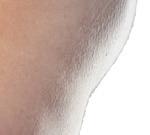
For more information on workplace ergonomics, training on MAC/ART/ RAPP and DSE/VDU assessments, go to www.LCE.ie or www.EZErgo.com

SFA | BETTER BUSINESS Musculoskeletal disorders (MSDs) Health 43
THE PROCESS OF ASSESSMENT COULD NOT BE EASIER THAN USING EZERGO, THE CLOUD-BASED SYSTEM THAT SAVES TIME AND MONEY. EZERGO CAN BE USED FOR:
GUIDANCE DESIGNED TO TAKE THE UNCERTAINTY OUT OF WASTE SEGREGATION FOR BUSINESSES IS NOW AVAILABLE FROM MYWASTE, IRELAND’S OFFICIAL GUIDE TO WASTE
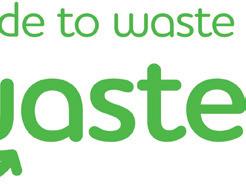
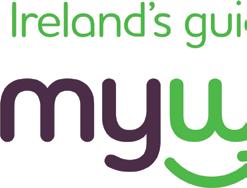
This government funded initiative provides a free and extensive suite of signage and training materials to help workforces make accurate recycling decisions. This will assist Irish businesses to achieve greater Circular Economy performance through increased recycling and composting rates.
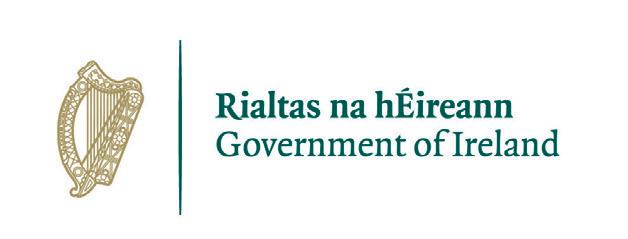
empower small and medium size businesses, particularly those in the retail, hospitality, manufacturing and corporate sectors to further improve how their waste is managed. With clear language and visuals, the materials will make it easy for sta to quickly understand
A waste characterisation study by the Environmental Protection Agency (EPA) found that almost 70% of materials being placed in the general commercial waste bins is waste that should be placed in the recycling or food waste bins. Targeted materials (those suitable for recycling) accounted for only 60% of the materials in the mixed dry recycling bins, with food waste among the contaminants. The study found that by improving waste segregation practices, businesses could divert significant amounts of waste from the general waste stream annually.
Speaking on behalf of the Regional Waste Management Planning O ces, Kevin Swi t, Connacht Ulster Region Waste O ce said: “This initiative will
what waste goes in what bin. This should help significantly increase the amount of recyclables and food waste diverted from the general bin and correctly placed in the recycling and food waste bins.”
The toolkit is free to download or order from www.mywaste.ie/business
44 SFA | BETTER BUSINESS Partner Profile Southern Advertising
WASTE
MANAGING YOUR
food Visit mywaste.ie for more information Raw food Cooked food Unwanted leftovers Paper towels & napkins Tea bags & coffee grinds no glass no plastics no metals Compostable bags Certified to EN13432 Compostable packaging Certified to EN13432 Greenery & flowers general Visit mywaste.ie for more information Non-compostable disposable cups Wet wipes Soiled aluminium foil & containers Broken crockery Broken glassware no food no recyclables no batteries Floor sweepings Contaminated items Disposable face masks & gloves Plastic bottles & containers Plastic tubs & trays Soft plastics Cardboard Cartons Paper & magazines Cans & tins Aluminium cans clean dry & loose recycle Visit mywaste.ie for more information
“THIS INITIATIVE WILL EMPOWER SMALL AND MEDIUM SIZE BUSINESSES, PARTICULARLY THOSE IN THE RETAIL, HOSPITALITY, MANUFACTURING AND CORPORATE SECTORS, TO FURTHER IMPROVE HOW THEIR WASTE IS MANAGED”

Forums, Group Support, 1to1 Counselling, iphone enabled You’re not alone when it ComeS to CopinG www.turn2me.org what’s on your
world feet


MEZZO-SOPRANO






















































TARA ERRAUGHT IS TAKING THE WORLD BY STORM, ONE STAGE AT A TIME


SFA | BETTER BUSINESS
46 SFA | BETTER BUSINESS
Tara Erraught
Ireland

Today, opera is going through a revival in Ireland, with singers like mezzo-soprano Tara Erraught leading the revitalisation of an art form that was once so ubiquitous in Ireland

Originally from Ravensdale, County Louth, Tara is one of the most sought-a er mezzo sopranos on the international opera stage. She has performed all over the world, from the Bavarian State Opera, the Welsh National Opera and the Opéra de Paris to New York’s Carnegie Hall and Dublin’s Gaiety eatre. Critics have described her “beautifully formed mezzosoprano voice” and as Maria Stuarda for the Irish National Opera, hers “was a voice that inspired pity that would have moved even the stoniest of hearts”. Tara is currently in Munich performing in a production of Ariadne auf Naxos. Known as an opera within an opera, the rst half of Richard Strauss’ backstage comedy is a ‘prologue’, which sets the scene for the ‘performance’ in the second half. e opera begins in a 1950s Italian studio, where two di erent lms are being made – a comedy starring the irtatious Zerbinetta and a serious opera about Ariadne from Greek mythology. Chaos breaks out when the Producer announces there isn’t enough money to shoot both lms, so they must merge into one. Cue much outrage from the opera’s Prima Donna, Tenor and from the Composer, sang by Tara. A er Ariadne, Tara will travel to Hamburg for a production of Falsta . “Being able to travel again and perform across di erent cities is a delight. ese performances were signed pre-Covid, so they’ve been a long time coming.”
Fourteen years ago, Tara enrolled in the Young Artist program at Munich’s State Opera. A er completing the programme, she spent eight years there as resident principal soloist. Today, Tara lives between Munich, Dundalk and life on the road. It’s the life she dreamed about as a child. When




SFA | BETTER BUSINESS
Arts and Culture 47
Tara Erraught
Back in the 1700s,
was regarded as a mecca for opera. If, as an opera singer, you didn’t sing in Dublin, you simply weren’t on the map.
Tara Erraught
she was 13, on summer holidays in Italy, her parents brought her to see Aida. “My parents wouldn’t have been huge opera fans, but going to see a performance was very much on the tourist trail. We went to the arena in Verona and it was just spectacular. e music, the costumes and the sets were amazing and I decided there and then that was what I wanted to do.”
By then, Tara knew she could command a room with her voice. At the age of 9, she had begun singing lessons with well-known teacher Geraldine Mcgee. “Geraldine has this great ability to explain to a child that a performance isn’t so much about the voice, it’s about entertaining the audience. I remember singing whatever I had learned in my rst lesson for my grandparents and experiencing a change in the room. I could feel they were hanging on my every word. From the very beginning, I was addicted to the buzz of a performance.” A er returning from her summer holidays, Tara asked Geraldine if she would teach her opera. “Up until then, I had learned traditional Irish and folk songs but I was adamant that I wanted to learn about opera. Geraldine was so patient with me and taught me arias in English so I understood the story.” A er her Leaving Cert, Tara studied at the Royal Academy of Music under Veronica Dunne, who sadly passed away during Covid. In the middle of her degree, was o ered a place at the Young Artist programme at the Bulgarian State Opera in Munich. “I’ll always be so grateful to Geraldine, Veronica and to my parents. ey invested in my love of something that was, at the time, quite strange! My dad got me a subscription to an opera magazine which would arrive every six weeks with a DVD and a little book. In the book, there would be a synopsis and a little bit about each character and maybe something about the composer. at was my only way of seeing opera because of course, we had very little live opera in Ireland at the time.”
at all changed in 2018 with the launch of the Irish National Opera, Ireland’s new national opera company which aims to produce high-quality, accessible opera in

venues throughout Ireland and overseas. It’s giving students something that wasn’t available to Tara when she was studying at the Royal Academy of Music. “ e Irish National Opera is providing incredible employment opportunities for students.

ey can join the chorus, take up larger roles and see how the industry really works, which is so important. It’s also a touring company so they travel around the country, bringing opera to all parts of Ireland. I’m also on the board of directors so I get the opportunity to o er my experience. It’s a big learning experience for me to see how a company is actually run.” Tara sang in the Irish National Opera’s very rst performance. “It was in the Gaiety eatre and I was so proud. I sang Susanna in the Marriage of Figaro. It was a role that my teacher had sung in the Dublin Grand Opera Society, which also performed at the Gaiety. Pavarotti himself sang in the Gaiety, so I felt like I was part of this legacy and to play a role in the rebirth of opera in Ireland was such an honour.”
To pursue a career in opera, Tara’s only option was to move abroad. With the establishment of the Irish National Opera, that’s all changed. “I would still recommend living abroad for a while to most young singers. It’s so important to learn other languages when you’re singing opera and experience di erent cultures. I sing in German, French, Italian, Czech, Russian and Spanish; you have to be able to sing opera in the language it was written in. e Irish public deserve the very highest level of performance and I think like anything else, you’ve got to invest also in the product that you’re putting out there.”
Understanding the business side of the industry is just as important as being able to hold a note, says Tara.





Earlier this year, she led a weekend of professional development and vocal health masterclasses, workshops and concerts in Drogheda. “One piece of advice I always give young singers is, when you’re going for an audition you must learn to treat yourself as a business product. You’re not going in to seek approval, you’re going in to showcase your product. Auditions place people in an extremely vulnerable position, so it’s important to approach it logically.” Over that weekend, speakers ranged from a tax accountant, the casting director at the Metropolitan and Dr Paul Kwak, a laryngeal surgeon at the New York University Voice Center. “It was great to be able to impart really sound, practical advice to young singers and let them know what the industry is like.”
As an opera singer, once you reach your mid-30’s it’s time to make a repertoire change. “ at will be a big change. You go from younger characters to more serious, grown-up female parts. I’ve got some really big, exciting roles planned in some really big houses which I’m not really allowed talk about, but they’re going to be amazing. I’m terri ed but also very much looking forward to these new roles.” Continuing her involvement with the Irish National Opera is also a priority.







“I’m looking forward to seeing how it grows and develops. I want to play a role in that progession and in the rebirth of opera in Ireland.”

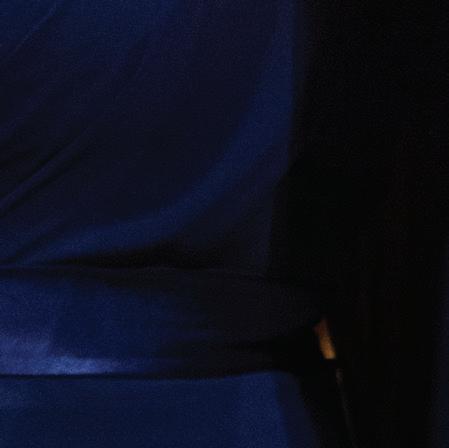



Arts and Culture Tara Erraught 48 SFA | BETTER BUSINESS
Tara Erraught


















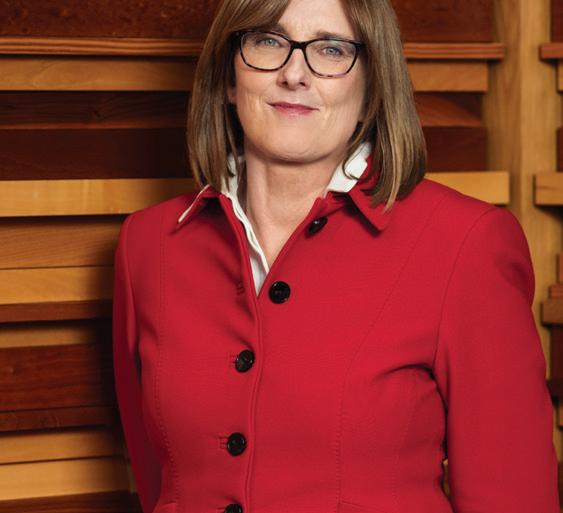

































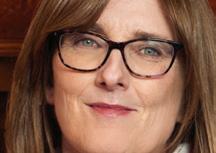






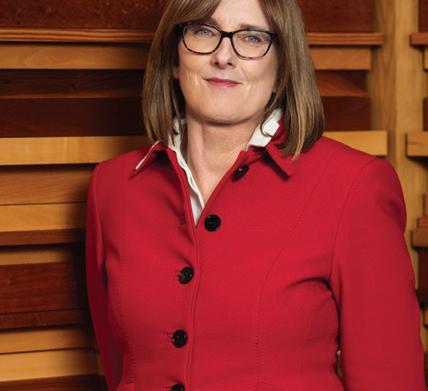






































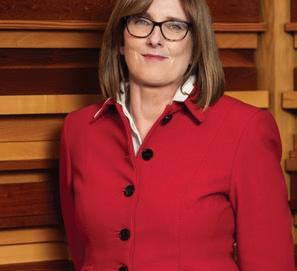























Ashville Media’s online digital publications are now available to view our website www.ashville.com/library Available in SMALL, MEDIUM and LARGE BUSINESS SUPPORTING ENTREPRENEURS VALUING SMALL BUSINESS REWARDING RISK TAKERS SPRING 2023 BETTER BUSINESS SPRING 2023 PARENTING HEROES MEET THE SMALL FIRMS THAT ARE MAKING LIFE EASIER FOR PARENTS BACK TO WORK SUPPORTING PROFESSIONALS BACK INTO THE WORKFORCE PUSHING FOR CHANGE THE SFA’S NEW CHAIR ON THE CHALLENGES FACING SMALL BUSINESS GETTING THE BALANCE RIGHT UNDERSTANDING THE WORK LIFE BALANCE AND MISCELLANEOUS PROVISIONS ACT 01 772009 911007 2.70 Standard ON HELPING SMALL BUSINESS TO COMPETE ON A GLOBAL STAGE GERALDINE LARKIN NSAI’S CEO Setting The BUSINESS BETTER BUSINESS SPRING 2023 PARENTING HEROES MEET THE SMALL FIRMS THAT ARE MAKING LIFE EASIER FOR PARENTS BACK TO WORK SUPPORTING PROFESSIONALS BACK INTO THE WORKFORCE PUSHING FOR CHANGE THE SFA’S NEW CHAIR ON THE CHALLENGES FACING SMALL BUSINESS GETTING THE BALANCE RIGHT UNDERSTANDING THE WORK LIFE BALANCE AND MISCELLANEOUS PROVISIONS ACT 772009 911007 2.70 Standard ON HELPING SMALL BUSINESS TO COMPETE ON A GLOBAL STAGE GERALDINE LARKIN NSAI’S CEO Setting The BUSINESS PARENTING HEROES BACK TO WORK SUPPORTING PROFESSIONALS BACK INTO THE WORKFORCE PUSHING GETTING THE BALANCE RIGHT Standard ON HELPING SMALL BUSINESS TO COMPETE ON A GLOBAL STAGE GERALDINE LARKIN NSAI’S CEO Setting The
NOT JUST A GREAT PLACE FOR TOURISTS, GERMANY IS AN ATTRACTIVE OPTION FOR SMALL BUSINESS LOOKING FOR NEW MARKETS




Take a trip to Deutsch land
Whether it’s Munich, Berlin or Frankfurt, doing business in Germany is an increasingly attractive option for Irish businesses. As one of the largest industrial and export economies in Europe, Germany offers small firms a vast spectrum of opportunities across a range of sectors. According to Enterprise Ireland, 600 companies sold over €1 billion of goods and services into the German market in 2019 and in 2021, indigenous Irish companies exported almost €2 billion to the German-speaking region, driven primarily by sales in ICT, high-tech construction, life sciences and industrial products and services. That figure represents an increase of 17% on the previous year and the reasons for that upturn are varied. German customers place great value on innovation and quality and they’re willing to pay for it. Irish businesses are known for their innovative products and services, making the German market a great place to do business. For Irish firms interested in exporting to Germany, it’s important to note that German customers prefer to deal with suppliers that can speak the language and understand the culture. A physical presence in Germany, along with regular visits, are advised. Of course, Germany is also a great place to visit as a tourist. In 2022, about 163 million people visited the country to experience Germany’s culture, its cities and its huge range of outdoor activities. Whatever you’re after, Germany’s got it all.
163 million
tourists visited and experienced Germany’s culture in 2022
Travel Germany 50 SFA | BETTER BUSINESS
BERLIN
Germany’s capital is known for its dynamic culture, great food, cutting-edge architecture and 24/7 nightlife. It’s also a major centre of media, politics and science. Take a trip to Museum Island, visit the Berlin Wall, stroll around Schloss Charlottenburg or pay a visit to the Reichstag.

W: www.visitberlin.de/en
SCHLOSS
Located on top of a rugged hill above the village of Hohenschwangau in southwest Bavaria, Neuschwanstein Castle is straight out of a fairytale. The 19th century palace, which is open to visitors all year round, inspired the Sleeping Beauty Castle at Disneyland in Anaheim, California.

W: www.neuschwanstein.de
For small firms interested in finding out about the supports that are available for doing business in Germany, visit www.globalambition.ie
SFA | BETTER BUSINESS Germany Travel 51
NEUSCHWANSTEIN
oss Neuschwanstein
RHINE VALLEY
A UNESCO World Heritage site, Germany’s Middle Rhine Valley (Rheintal) is an area of outstanding natural beauty. Along this stretch of the river you’ll find castles, historic towns and unique flora and fauna and plenty of opportunities to take a hike, a bike ride or a trip aboard a riverboat.

W: www.germany.travel/en
MUNICH
Travel to Munich for Oktoberfest but stay for the city’s famous attractions, such as the Frauenkirche (cathedral), Marienplatz and Altes Rathaus (main square and Old Town Hall), Olympiapark (Olympic Park) and the Kunstareal (museum area) with its world-famous museums.

W: www.munich.travel/en
MINIATUR WUNDERLAND
Voted the most popular tourist attraction in Germany, Miniatur Wunderland is the world´s largest model railway. Adults and children alike will be wowed by the miniature countries, miniature airport and the special exhibits that run each year.

W: www.miniatur-wunderland.com
BLACK FOREST
Whether it’s to see the largest cuckoo clock in the world, sample a slice of Black Forest cake or follow a hiking trail, the Black Forest region in southwest Germany has it all. The Romans named the mountain range “Black Forest” because of the densely packed, dark green conifer trees found in the area.

W: www.blackforestgermany.com
POTSDAM
Potsdam, located right next to Berlin, is the place to visit if you’re a fan of palaces. The city is home to 16 palaces and three historic parklands and is also the birthplace of film as we know it. Grand Budapest Hotel, Inglorious Basterds and Bridge of Spies were all filmed in the picturesque city.
W: www.potsdam-tourism.com

Travel Germany 52 SFA | BETTER BUSINESS
their

their entire
There are almost 4,000 children homeless in Ireland. Donate now. focusireland.ie 1850 204 205


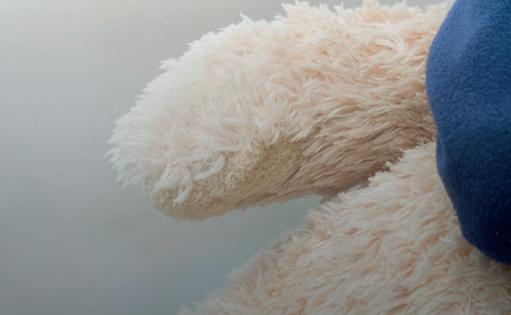
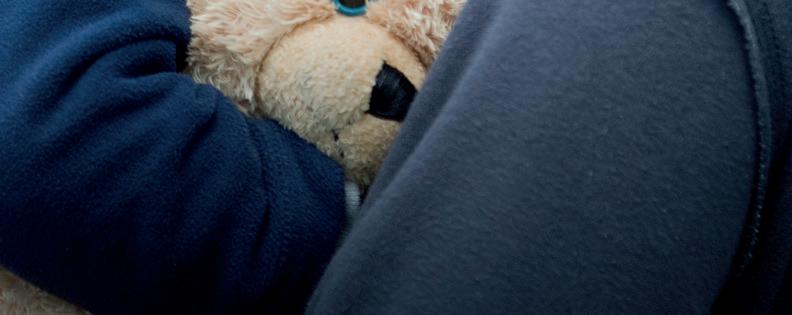


CHY7220
When a child loses
home, they lose
world.
IN ‘NEVER BETTER’, RTÉ’S FORMER NORTHERN IRELAND EDITOR TOMMIE GORMAN RECOUNTS 40 EXTRAORDINARY YEARS OF IRISH HISTORY AND LOOKS AT WHAT MAY LIE AHEAD FOR THE ISLAND
Bunny Carr was the person who opened my eyes to the power of broadcasting. The lesson was delivered on the first floor of the Allied Irish Bank in Stephen Street, Sligo.
The Big Read Never Better 54 SFA | BETTER BUSINESS
news front
AT THE
Life
In the 1970s, RTÉ had a rented office there and occasionally used it as a radio studio. Bunny was presenting a live mid-morning radio magazine programme during the summer months. RTÉ’s keenness to fly a flag in the regions took him to Sligo.
The programme’s running order included Bunny having a chat with Seamus Finn, the editor of the established local newspaper, the Sligo Champion, and me, as the representative of a new rival publication. Observing close-up the host purr through the gears that day was a revelation. As the presenter of the 1960s RTÉ television quiz show Quicksilver, with its famous phrase ‘Stop the lights’, Bunny was a presence from our childhood.
Here he was, across the table from us, effortlessly steering a conversation that was heard by hundreds of thousands of ears. When the time came to conclude our contribution, Bunny thanked us on air, introduced a piece of music, and, after it kicked in, he wished us well as a researcher led us from the room.
My two-year course at the Rathmines School of Journalism from 1975 to 1977 had focused on print journalism. We tracked the national newspapers. We devoured the details in the book All the President’s Men, explaining how Washington Post journalists Bernstein and Woodward brought down the administration of US president Richard Nixon. When the sixteen students in our class sought summer placement work at the end of first year, none found a berth in broadcasting. Just one from the class ahead of us, Joe O’Brien, got work experience in RTÉ. At the time, Ireland didn’t have a network of independent radio stations. RTÉ had a monopoly in the broadcasting space. The brief brush with Bunny Carr planted the seed of a reporting path beyond newspapers.
RTÉ took a gamble hiring me as its north-west correspondent. I was twenty-four, with three years’ experience in provincial newspapers. I hadn’t worked as a reporter with RTÉ in Dublin or for a national newspaper. My pulse quickened when I walked through the front doors of RTÉ to begin my new working life in November 1980. That sense of excitement was still there every time I drove into the Donnybrook complex over the next four decades. The starting salary was £9,106 a year. After three years in a fragile, start-up local newspaper, where I sometimes had misgivings when signing the wages cheques, the fortnightly salary transfer from RTÉ to my bank account never lost its sense of the miraculous.
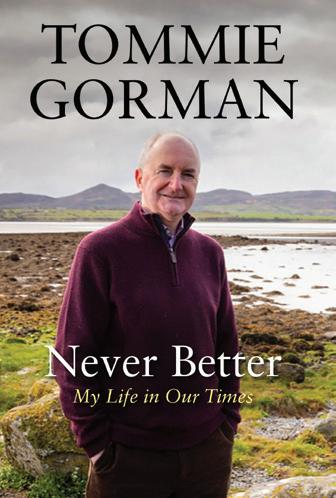
But the magic came from the work and the way of life it provided. The first formal training involved joining a programme for newly recruited production assistants. They included Moya Doherty, a future chairperson of RTÉ, and Eileen Dunne, who became one of RTÉ’s most respected newscasters.
I spent periods observing how different units of the newsroom operated. Mike Burns, the head
of radio, called me into his office and told several anecdotes about the entertaining nature of the trade. He unscrewed the mouthpiece from the phone on his desk and removed a fitting. He explained this was the voice box and that the crystals inside tended to get stuck together after regular exposure to damp breath. He bounced the fitting off the office carpet, several times, to loosen the crystals. This, he assured me, improved the functioning of the voice box.
Burns then went on to recall how, on a major story in rural Ireland, competing reporters had access to only one public phone booth. One of them discreetly removed the voice box from the phone and slipped it into his pocket. While the others went haring off to find a working facility elsewhere, he inserted the missing piece and made full use of his advantage.
After a number of weeks observing, I was asked to prepare a short voice report for the back end of a minor radio bulletin. My script would be based on information from a press release, using one of the ground rules of the craft: three words per second. Sound engineer Jack Butler remained patient through the dozens of failed efforts. He would press the record button, I would start talking, fluff, curse and panic. He’d stop, say ‘Not to worry . . . after five’, and we would start again. Following half an hour of failed attempts, an acceptable 45-second effort emerged and I made my broadcasting debut.
The next training module involved travelling beyond the RTÉ compound to observe experts at work in the field. RTÉ’s Belfast office was on the ninth floor of Fanum House, on Great Victoria Street. We had visited the city once, in childhood years, to visit Granny’s sister, a Cross and Passion nun. But this was my first trip to Belfast as an adult. The northern editor, Jim Dougal, worked with five journalists, while the bureau had two camera crews, a sound engineer, an office secretary and a driver-cum-fixer. It was an impressive news operation, spending most of its time covering what were called ‘The Troubles’. Jim Dougal had presence and management skills. Each morning, at a meeting in his office, the tasks were assigned. Before my visit ended, Jim Dougal had a question for me about the divide between his turf and mine. He frowned but said nothing when I told him I understood that I would be expected to cover Derry in my role as north-west correspondent.
When the Christmas roster was being prepared at Donnybrook, I volunteered to come back early. My assignment on New Year’s Eve was to attend the ceremonies at Christchurch Cathedral and to send back information to a copytaker over the phone. A reference to the event would be included in radio bulletins. I walked the streets, several times, observing the revellers and estimating the numbers. Maev-Ann Wren, a journalist from the Irish Times, was on the same marking. We met for the first time. At midnight, the bells rang, officially acknowledging new beginnings.
SFA | BETTER BUSINESS Never Better The Big Read 55
This is an extract from Quinn by Trevor Birney, published by Merrion Press, available in all good bookshops, online and as an E-book.
A DAY
LIFE in the
6AM Starting the day with a cycle is a great way of setting you up for what’s ahead. I live in Clontarf so some mornings I’ll cycle to Howth or Malahide. I’ll have a bowl of porridge before I go, a quick shower when I’m back and if I’m working in the o ce, it’s straight into the car for work. 8.30AM My o ce is in Clonshaugh so it’s a quick commute. On a Monday morning, we have our ‘scrum’, a manager’s meeting where everyone talks about what they’re working on in the coming week. It’s a quick but important meeting that’s really about taking the pulse of the company and seeing how everybody is doing. 11AM No two days are the same, but liaising with clients makes up a portion of my day. We specialise in cash processing and payment solutions for the banking, retail and hospitality sectors. This year, business has been positive. We have a couple of big projects on the horizon and we’re seeing traction with Serval, our hospital patient ordering system. UPay, our self-service and cashless payment system and Mashgin, our frictionless payment system, are also performing well. 1PM We moved to the Clonshaugh o ce a year and a half ago, but I’m still discovering all the co ee shops around the area. I’ll either bring in a sandwich or head out with a colleague. 1.30PM Our bread and butter product are our cash handling devices. We have literally thousands of devices across Ireland. The payment systems side of the business has also developed hugely over recent years, as has other areas of the business. The success of the company is very much down to the people who work with me. Without them, I wouldn’t be able to do what I do. 6PM I cook dinner the odd weekend, but my wife is a better cook! Some evenings I do a bit of work at home, but I try not to. I love my sports, I love going for cycles at the weekend and I like watching rugby and soccer. The dog also needs to be walked every night and our six grandchildren keep us busy! 11PM I’m usually in bed by 11 and I might read for a while before lights out. WWW.DUALTRON.IE
A Day in the Life 56 SFA | BETTER BUSINESS
FOR DAVE BYRNE, MANAGING DIRECTOR AT DUALTRON, 2023 LOOKS SET TO BE AN EXCITING, SUCCESSFUL YEAR
Dave Byrne, Managing Director, Dualtron
“THE SUCCESS OF THE COMPANY IS VERY MUCH DOWN TO THE PEOPLE WHO WORK WITH ME. WITHOUT THEM, I WOULDN’T BE ABLE TO DO WHAT I DO.”
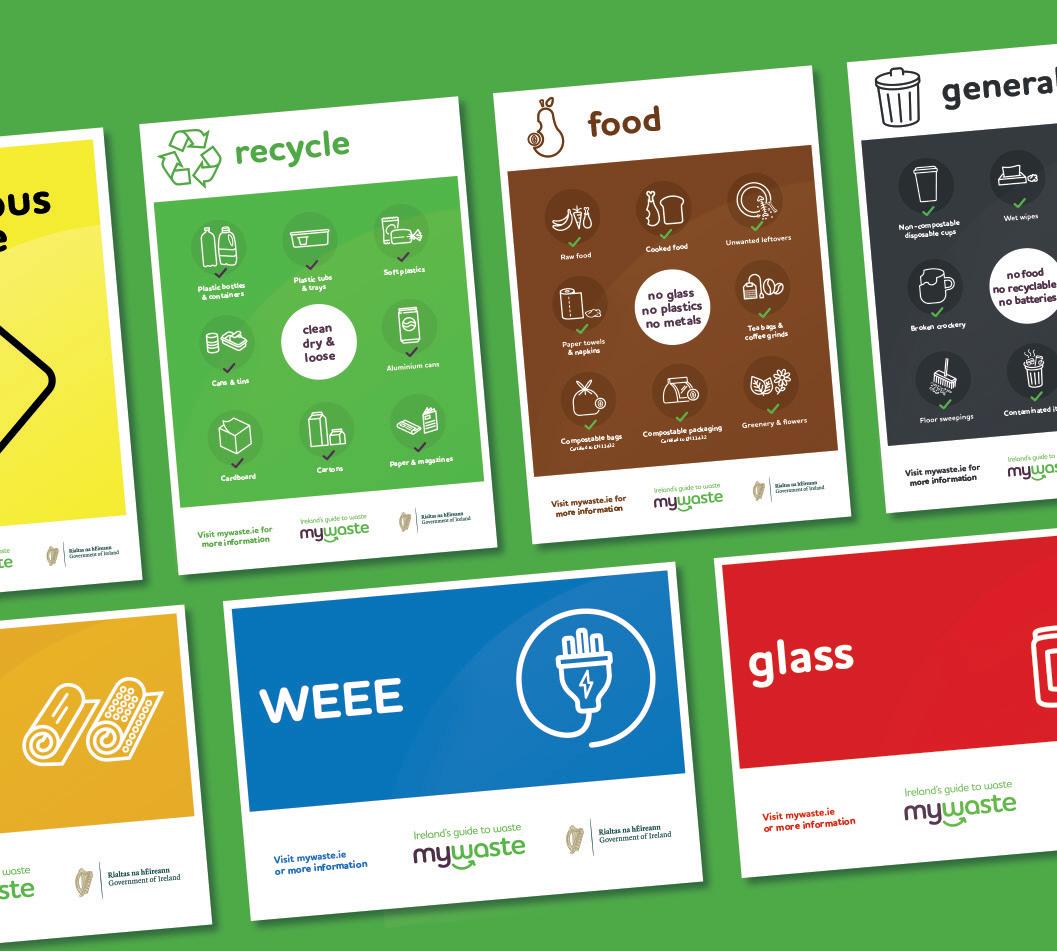

Go to mywaste.ie/business to download a FREE toolkit designed to help you better manage your business waste. This toolkit includes posters, bin labels and a step-by-step guide to better business waste management. Your Business Waste - Easily Sorted!
Ukraine Credit Guarantee Scheme































Low-Cost Finance For SMEs, Farmers & Fishers




The Ukraine Credit Guarantee Scheme supports businesses impacted by additional costs due to the conflict in Ukraine with low-cost finance of up to €1 million.

Find out more at sbci.gov.ie
Loans from €10,000 to €1 million at reduced interest rates, with terms up to 6 years. Loans up to €250,000 unsecured. Terms and conditions apply.
































































































































































































































































 Marian O’Gorman Champion Green Founder & Kilkenny Design Chairperson
Marian O’Gorman Champion Green Founder & Kilkenny Design Chairperson






































































































































































































































































































































































































































































































































































































































